Insights
GENERAL ARTICLES
GENERAL ARTICLES
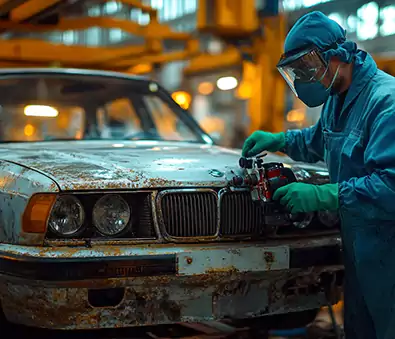
Corrosion Challenges in Automotive & Manufacturing Sector
Corrosion Challenges in Automotive & Manufacturing Sector 1. Corrosion Loss in India – Corrosion costs the Indian economy over INR 2.2 lakh crore every year – equivalent to 3–4% of GDP. In the automotive and manufacturing sector alone, rust-related rejections, rework, and warranty claims exceed INR 18,000 crore annually estimated , making corrosion the single largest preventable loss in Indian industry today. Corrosion is not always glaringly visible. However, just because you can't see it, does not mean that corrosion does not exist. 2. What is Micro/Flash-Rust? New technologies are being developed to make automobiles lighter, perform better, faster and to make their production more cost-effective and sustainable. Modern high-speed machining with water-based coolants + complex alloys = flash /Micro rust in 4–12 hours. Hiding in blind holes, threads, and micro-crevices even when parts appear perfectly clean. Though not visible to the naked eye, this flash rust explodes into severe damage during storage or transit, causing massive rejections and warranty claims. 3. Use of Correct Process – MWF, Cleaner, and RPO to Eliminate Micro-Rust Micro-rust can be eliminated only by using the right combination: a compatible metal working fluid (MWF), an effective interim cleaner that removes chloride and sulphate residues, and a fast water-displacing Low-VOC rust preventive oil (RPO). This scientifically matched triad ensures zero residual moisture and 100% protection from flash rust right from the machining stage. 4. Painted vehicle body is prone to Corrosion A Vehicle body, despite its well painted and coated exteriors, is subject to great corrosion stresses throughout, especially in areas containing body cavities, underbody, hinge and engine room areas which are subject to continual conditions of condensation, rain, mud, snow, salt and much more. Original coats of paint, however robust, fail to prevent these areas from corrosion by themselves and require additional coatings called waxes. These waxes play an important role in supporting the manufacturers' extending warranties for a corrosion-free life of vehicles. Heavy-duty cavity waxes and underbody waxes form thick, self-healing, water-repelling barriers ideal for hinges, door cavities, rocker panels, and chassis components exposed to salt, moisture, and stone chips. These wax-based coatings provide 5–10 years of durable protection in the harshest Indian road and monsoon conditions now are widely used by all major Indian OEMs. 5. Importance of VCI Packaging during Storage and Shipment of Auto Components VCI (Volatile Corrosion Inhibitor ) packaging is vital for safe storage and shipment of auto components. It releases protective vapor molecules that form an invisible anti-rust layer on steel, aluminum, copper, and other metals, blocking moisture, salt, and pollutants for 1–2 years. Unlike oily coatings, VCI keeps parts clean, dry, and ready-to-assemble, eliminating costly degreasing and preventing contamination on modern assembly lines. It withstands extreme humidity during long ocean freight and temperature swings, dramatically reducing scrap, rework, and warranty claims. Environmentally friendly and compliant with REACH/RoHS, VCI ensures global supply chain reliability while cutting logistics costs and ecological impact for the automotive industry. 6. Sustainable Corrosion Protection in India’s Automotive Industry India’s emergence as the world’s third-largest automobile manufacturer and a major exporter of automotive components—with annual exports exceeding 20 billion USD—has amplified the need for robust and sustainable corrosion protection across the packaging value chain. Prolonged global transit, multi-modal logistics, and storage in high-humidity and saline environments expose precision metal parts, assemblies, and CKD/SKD kits to severe corrosion risk, while OEMs and Tier suppliers must simultaneously comply with increasingly stringent international environmental and packaging regulations. Modern corrosion resistant packaging systems offer an integrated response to these challenges. Engineered dry-packaging configurations combine customized VCI films, papers, and emitters with desiccants, barrier laminates, and humidity indicators to create controlled micro-climates inside unit packs, returnable bins, and export containers. Zero- and low-VOC water-based and bio-based rust preventives ensure components remain clean, oil free, and assembly-ready at destination, reducing cleaning operations and line-side downtime. Advanced biodegradable and recyclable VCI films and papers, many incorporating post-consumer recycled (PCR) align with OEM sustainability roadmaps and circular economy goals. These materials provide reliable multi-metal protection for up to 2–3 years, support downgauging and pack optimization to reduce material consumption, and are compatible with established waste-management and recycling streams. By integrating sustainable packaging design with corrosion engineering, automotive exporters in India can lower total cost of corrosion, enhance global supply-chain reliability, and meet evolving ESG and regulatory expectations.
January 2026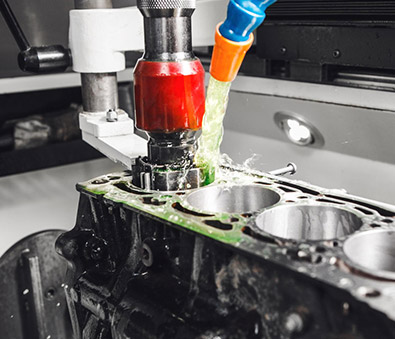
How Cutting Oil Can Extend Your Machine’s Life
How Cutting Oil Can Extend Your Machine’s Life In every machining workshop, whether small or large, the goal is the same: maximize efficiency, ensure precision, and maximize the life of machines and tools. But the one factor that silently dictates all of these outcomes is lubrication. Among the various types of lubricants used in metalworking, cutting oil plays a crucial yet often underestimated role. By providing effective cooling, lubrication, and protection during metal cutting operations, cutting oil not only enhances productivity but also significantly affects the life of machine tools. Let’s explore in depth how this vital fluid works, why it’s indispensable, and how choosing the right cutting fluid can transform your machining efficiency. Understanding What Cutting Oil Really Does Cutting oil sometimes referred to as metalworking fluid or coolant, is a specially formulated liquid used in machining processes such as drilling, milling, turning, grinding, tapping etc. Its primary purpose is threefold: 1. Lubricate the cutting interface between tool and workpiece 2. Cool components & tools by dissipating generated heat 3. Transportation of chips or swarf produced by metal cutting Whenever metal is cut, immense friction and heat are produced. Without proper lubrication, this friction leads to: Rapid tool wear Thermal expansion that reduces dimensional accuracy Rough surface finishes Machine overheating, resulting in downtime or costly repairs Cutting oil acts as a protective medium that reduces friction, washes away chips, and prevents metal fusion, enabling smoother operations and prolonged equipment life. How Cutting Oil Extends Life of Machine Tools The science behind cutting oil’s effectiveness lies in its ability to manage heat and friction, the two biggest enemies of machinery. 1. Friction Reduction at the Cutting Zone During cutting, the point of contact between the tool and workpiece can reach temperatures exceeding 1000°C. Such heat causes micro-welding, deformation, and premature failure of cutting edges. As the cutting tools wear out, the loads on machine tool spindle increase which may damage the spindles, gears & bearings. A cutting tool that provides efficient lubrication, leads to reduced spindle loads and better life of machine spindle which is an integral part of the machine tool. 2. Chip Removal and Surface Cleanliness In high-speed machining, metal chips can stick to machine bed & surface, causing scratches and choking of the machine tool bed. Cutting oils flush these chips away, maintaining a clean machine tool bed and enhancing the machine tool performance and extending its life. 3. Corrosion Prevention Water soluble cutting fluids with low pH, low bio-stability or neat oils with high Acidic content can cause oxidation or rusting. High performance X-Series cutting oils from ev, are fortified with anti-corrosive additives and highly refined base oils that protect both the machine and the finished workpiece from rust and pitting. 4. Paint compatibility A cutting fluid that does not affect the paint adherence on surface of the machine tools, extends the life and ensures better corrosion protection of the painted surface. 5. Reaction with Seals & hoses A high performance Metalworking fluid is formulated to be inert to critical machine parts like hoses and seals. A cutting fluid that swells up the seals or damages the hoses can significantly reduce the life of the machine tool. The Key Benefits of High-Performance Cutting Oils When you invest in high-quality cutting oil, the advantages go beyond just lubrication. Let’s break down the key benefits that directly contribute to longer machine life and better productivity. 1. Extended Tool and Machine Longevity Premium cutting oils like those from Zavenir significantly reduce frictional wear and heat damage. This not only extends tool life by up to 50% or more, but also lowers long-term maintenance and replacement costs of machinery components. 2. Superior Surface Finish and Accuracy The presence of a lubricating film ensures that the cutting edge glides smoothly over the metal surface. The result? Low spindle loads, lower maintenance costs and long-term high precision output. 3. Reduced Downtime and Maintenance Costs Fewer breakdowns mean more uptime. When heat and friction are under control, your machines need less frequent servicing. This translates into better operational efficiency and lower maintenance expenditure. 4. Compatibility with Paints & Seals With compatibility with machine tool components, the life of the machine tools is extended and the requirement for component change and re-furbishing reduces. 5. Protection Against Rust and Microbial Growth Zavenir’s cutting oils include specialized formulations that resist oxidation, prevent microbial growth, and maintain long-term fluid stability ensuring a cleaner, healthier, and more durable system. Zavenir’s Range of Cutting Oils for Precision Machining In modern metal-working environments, the right cutting oil can make the difference between a good part and a great part. Zavenir’s X-Series cutting oil portfolio offers solutions for neat oils for machining , water-soluble emulsions and honing-specific needs all engineered to elevate tool life, machining quality and operator safety. These products are rigorously tested to provide adequate lubrication, high rust protection and compatibility with critical components of the machine tools. X-Series products are validated by various machine tool builders which recommend the usage of these products to achieve highest performance of their machine tools. 1. X-CUT® & X-HONE® Neat Cutting Oils When high precision to general machining operations like honing, grinding, milling, turning, drilling, broaching and gear cutting etc. are involved, the X-CUT® & X-HONE® neat oils step in. They share the advanced base oil technology (Group II, high saturated hydrocarbon content) and advanced extreme-pressure (EP) additives. Why choose these: Better tool life due to high performance Extreme Pressure Additive Technology Less load on machine spindle due to exceptional lubrication properties Reduced misting/evaporation losses & improved fire safety due to higher Flash points Versatility across different machining operations ensures better inventory control Better oxidation stability ensures better machine tool rust protection during long term usage 2. X-COOL® Water-Soluble Cutting Oils For applications where coolant emulsions are preferred (e.g., high-speed machining, mixed ferrous/non-ferrous, or when easier chip handling is required), the X-COOL® range offers a high-performance water-soluble solution. Stand-out features: Exceptional lubrication for reducing load on machine spindle Nano-emulsion technology reduced carry-over of emulsion with parts & chips. Reduced consumption of coolant emulsions, better chip/part separation and improved machine hygiene. Compatible with machine components and painted surfaces. High rust protection for better machine tool life. Sustainability, Safety, and Operator Health Modern manufacturing demands not just performance, but also environmental responsibility. Many traditional cutting oils release fumes, mists, or residues that can affect worker health and the environment. Zavenir’s advanced formulations are engineered to: Reduce oil mist and odor Dermatologically tested products for operator acceptability Provide environment-friendly alternatives Ensure compatibility with machine tool parts Ensure compliance with global safety and environmental standards By choosing Zavenir, you not only protect your machines, you protect your people and the planet. Maintenance Tips for Maximizing Cutting Oil Performance Even the best cutting oil requires proper maintenance to perform at its best. Here are some best practices: Regularly monitor concentration levels (for water-based fluids). Filter out chips and contaminants to keep the oil clean. Remove tramp oil and prevent oil leakages. Maintain proper fluid circulation and coolant flow to prevent hotspots. Use Zavenir’s recommended sump cleaning agents when changing oil to avoid cross-contamination. Store oils properly as per the storage guidelines to ensure optimum performance. Following these steps ensures your oil performs consistently, maximizing both machine protection and operational efficiency.
December 2025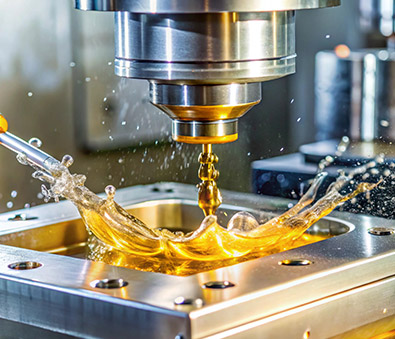
Why Low-Quality Cutting Oil Could Be Costing You Thousands
Why Low-Quality Cutting Oil Could Be Costing You Thousands In manufacturing, every second counts and every micron matters. Machines run for hours, tools cut through tough metals, and even the smallest inefficiency can impact production. Yet one of the most overlooked elements in machining shops is also one of the most crucial—cutting oil. Many businesses, especially smaller workshops, try to cut costs by choosing cheaper metalworking fluids. At first glance, it seems like a smart decision: why spend more on a fluid that doesn’t “look” any different? But here’s the truth most industries learn the hard way: Low-quality cutting oil isn’t cheap. In fact, it could be silently draining thousands of rupees from your operations every month. From accelerated tool wear to increased downtime and poor machining accuracy, low-grade cutting fluids often create more problems than they solve. Let’s break down how and why. Poor Lubrication = Rapid Tool Wear = More Spending One of the primary functions of cutting oil is lubrication—reducing friction between the cutting tool and the workpiece. What happens when lubrication is poor? The cutting edge heats up faster Friction increases leading to excessive tool wear Tools lose sharpness prematurely Cutting edges chip or break When using low-quality oils that lack extreme-pressure (EP) additives or proper lubricity enhancers, tools simply cannot withstand the heat and stress. Real-world impact: Imagine you have a CNC machine performing continuous milling. With a premium cutting oil, you may replace inserts every 8 hours. With a low-quality one, inserts may burn out every 4 hours. If one insert costs Rs.200 to Rs.500, and you replace it twice as often, your annual cutting tool budget can easily double. Multiply that by multiple machines—and now your “cheap oil” becomes an expensive mistake. Overheating Causes Thermal Damage to Machines and Workpieces Low-quality cutting oils fail miserably in heat dissipation. During machining, enormous heat is generated from: Metal friction High-speed spindle movement Tool-to-metal contact When cutting oil does not cool properly: The workpiece expands (thermal distortion) Surface quality deteriorates Micro-cracks develop Machines overheat, causing shutdowns Thermal expansion of even 0.02 mm can ruin precision parts. Industries like auto components, aerospace, and die manufacturing simply cannot afford this. For instance, if a crankshaft machining line produces 2–3 rejected pieces per day due to poor surface finish or distortion, that’s a heavy loss in a competitive market. Poor Surface Finish = Rework, Scrap, and Delayed Deliveries A high-quality cutting oil creates clean, smooth surfaces. A low-quality one? Just the opposite. Poor cutting oil leads to: Visible lines, scratches, and burn marks Chatter marks from unstable cutting Rough surface finish that fails QC Increased rework time Higher scrap percentage Imagine running a batch of 200 precision components where 30–40 parts require rework because the surface roughness Ra is above tolerance. Each rework cycle consumes: Machine time Operator time Electricity Tool life Suddenly, your “simple” cutting oil choice is affecting your delivery schedule—and your reputation. Frequent Machine Downtime Due to Foam, Corrosion, and Residue Build-Up Low-quality oils often contain cheap base stocks and low-grade additives that break down under stress. This leads to: a) Excessive foam Foam interrupts coolant flow, starving the cutting zone and causing overheating. Foam on shopfloor creates safety & 5S issues. b) Rust and corrosion Cheaper oils do not offer sufficient rust preventive properties, leading to: Corrosion on expensive components Rusting of slides and guides Reduced lifespan of expensive machinery c) Sludge and deposits Impurities in low-quality oils break down faster, forming sticky residues in: Filters Nozzles Machine beds Pipe lines Each maintenance shutdown costs hours of production loss — translating into lakhs of rupees annually. Increased Power Consumption Due to Higher Friction A clean, high-quality cutting oil reduces cutting forces, which means machines consume less power. Low-quality cutting oils increase: Spindle load Torque requirement Motor power usage A higher cutting load by even 5–10% can increase your electricity bill significantly, especially in shops running 10–20 machines for 8–12 hours daily. Low Stability = Foul Odor, Bacterial Growth, and Operator Discomfort Cheap cutting oils typically lack proper biostability and anti-microbial additives. This results in: Rapid bacterial growth Bad smell in the shop floor pH fall and corrosion Skin irritation for machine operators Shorter sump life Frequent disposal increases cost and environmental waste. It also affects employee health and productivity — problems that no company should ignore. Inconsistent Machining Accuracy and Dimensional Control Low-quality cutting oil breaks down quickly, providing inconsistent lubrication and cooling. This results in: Dimensional variations Tolerance issues Misalignment of bores and edges Tool deflection under high heat In industries where accuracy is everything (like precision machining or automobile components), this leads to: Higher rejection rates Customer complaints Loss of repeat orders Hidden Costs That Add Up Over Time Industries often think: Cutting oil is just a consumable: But here are the hidden costs they don’t consider: 1. Tool replacement cost: Low-quality oil can increase tool consumption by 30–50%. 2. Machine repair and maintenance: Corrosion, deposits, and overheating damage bearing, spindles, and seals. 3. Rework and scrap: Each rejected part costs 5–20x more than the oil used in machining it. 4. Downtime losses: Even 1 hour of downtime can cost heavily depending on machine & component type. 5. Higher electricity bills: Machines working “harder” consume more power. 6. More coolant change cycles Cheaper coolants break down faster, requiring frequent replacement. 3 Best Zavenir Cutting Oils for Metal Cutting 1. X-CUT® Neat Cutting Oil Ready-to-use, non?water-miscible cutting oil. Formulated with Group II base oil technology, which gives excellent oxidation stability and reduces misting / evaporation. Designed for a broad range of machining operations: turning, milling, grinding, drilling, gear cutting, etc. Key benefits: reduces cost per component, increases tool life, and improves EHS due to lower mist and better base oil quality. 2. X-HONE® Neat Cutting Oil Also a ready-to-use neat oil, formulated especially for honing and grinding operations. Uses Group II technology plus chlorine?free extreme-pressure (EP) additives. Offers lower oil consumption, longer oil life, and better tool performance. EHS advantages: reduced mist, no foul odor, safer handling. 3. X-COOL® Water-Soluble Cutting Fluid A water-miscible cutting fluid (dilutable), formulated with Nano-emulsion technology. Environment & operator friendly - Boron & Chlorine?free technology High performance, Chlorine free EP additives plus advanced surfactants → good lubrication + cooling. Benefits include: 10 to 50% lower fluid consumption 25–100% increase in sump life (fluid lasts much longer) Improved tool life (5 to 50% gain) Excellent biostability, controlled pH, no foul odor, and good skin friendliness. Suitable for many machining operations (grinding, milling, turning, deep drilling, etc.). How High-Quality Cutting Oil Solves All These Problems A premium cutting oil—such as advanced formulations offered by companies like Zavenir—is engineered to address all pain points of machining. Benefits of high-quality cutting oil: Superior EP & lubricity additives Excellent cooling for temperature control Increased tool life (up to 50% longer) Smooth surface finish with reduced friction Clean machining environment with low foaming Longer sump life and fewer coolant changes Better corrosion protection Lower electricity consumption Stable performance even under high-speed machining The result? Higher productivity, fewer breakdowns, consistent accuracy, and significantly lower operational costs. Conclusion: Stop Choosing Cutting Oils Based on Price, Choose Based on Performance Cutting oil is not just a fluid, it is a productivity booster, a machine protector, and a cost saver. While low-quality oils seem cheaper upfront, they quietly multiply your expenses through tool wear, rework, downtime, and maintenance. On the other hand, high-quality cutting oils like X-Series by Zavenir deliver superior lubrication, excellent cooling, longer tool life, and stable machining performance.
December 2025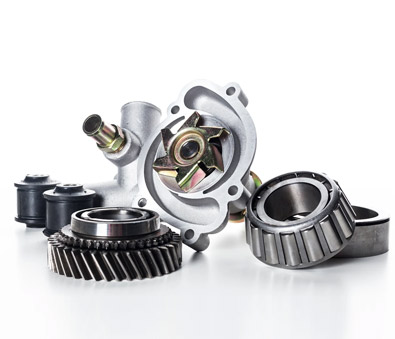
The Secret Role of Cleaner in Industrial Manufacturing
The Secret Role of Cleaner in Industrial Manufacturing When we think about industrial manufacturing, the first things that come to mind are heavy machinery, lubricants, metal cutting fluids, and precision processes. But behind every efficient production line and flawless finish lies an unsung hero: the industrial cleaner. Though often overlooked, cleaners and degreasers play a critical role in ensuring smooth operations, higher product quality, and longer machine life. From removing stubborn grease and contaminants to ensuring lower emissions or enabling smooth fluid flow, the right cleaning solution can make the difference between a high-performing plant and a quality nightmare. Here, we will try to uncover the critical role of cleaners in industrial manufacturing, explore how they work, and why choosing the right formulation like Zavenir’s advanced industrial cleaners can elevate your performance standards. What Is an Industrial Cleaner? An industrial cleaner (or degreaser) is a specially formulated chemical solution designed to remove dirt, oil, dust, and metal residues or chips from machined components and other important parts like bins used for carrying components in manufacturer’s shopfloors. Unlike household cleaners, industrial cleaners must perform under tough conditions dealing with heavy grease, high temperatures, and precision equipment. They are formulated to: Dissolve and separate contaminants without damaging surfaces Improve operational safety by reducing potentially damaging residues Provide adequate in-process corrosion protection to prevent damage to the surface in between operations Prepare surfaces for subsequent operations like rust preventive oil or wax application, coating, painting, or assembly Industrial cleaners can be water-based, solvent-based, or alkaline, depending on the specific application and contamination type. Why Cleaning Is Critical in Manufacturing In a fast-paced metal processing application, every process depends on the cleanliness of the equipment. Over time, machines accumulate oil films, metal shavings, coolant residues, and carbon deposits. These contaminants can silently sabotage productivity in multiple ways: 1. Reduced heat transfer leading to overheating and inefficiency 2. Corrosion and rust formation on metal components 3. Poor lubrication as contaminants mix with oils and greases 4. Dimensional inaccuracies & surface quality in machining operations 5. Shorter tool and equipment lifespan due to abrasive particles In short, cleanliness isn’t cosmetic, it's a functional requirement. A properly cleaned component performs better and lasts longer. The Science Behind Industrial Cleaning The effectiveness of a cleaner depends on its chemical composition and action mechanism. A well-formulated industrial cleaner works on three core principles: 1. Chemical Action Cleaners contain surfactants or solvents that chemically react with oil and grease, breaking them into smaller molecules that can be easily removed. 2. Mechanical Action When used in cleaning equipment like ultrasonic tanks, pressure sprayers or jet spray washing equipment, or other agitation systems, cleaners also physically dislodge contaminants from surfaces using the agitation. 3. Thermal Action Most industrial cleaning is done at controlled temperatures. Heat boosts chemical reactions, making the cleaning process faster and more effective. Together, these actions ensure efficient cleaning without causing corrosion, surface damage, or residue buildup. Types of Industrial Cleaners Different industries and applications require different types of cleaners. Here’s an overview: Mild Alkaline or Neutral Aqueous Cleaners These are eco-friendly and safe for both workers and the environment. They use a fine balance of surfactants and alkaline agents to remove oil, dirt, and metal fines. Perfect for general maintenance cleaning and degreasing of light machinery. Best for: Precision cleaning, non-ferrous metals, general equipment maintenance, and pre-paint preparation. Solvent-Based Cleaners These cleaners are designed for tough, heavy-duty grease, oil and tar removal. They evaporate quickly, leaving no residue which is ideal for components where components are more prone to rust or require higher temperature cleaning due to which water-based cleaning isn’t suitable. Best for: Automotive parts, electrical components, and tools requiring residue-free cleaning or by vacuum degreasing. Alkaline Cleaners Highly effective against heavy oils, carbon deposits, and metallic contaminants, these are often used in immersion tanks or spray systems. Best for: Degreasing metal components, engine blocks, and industrial gear assemblies. The Hidden Benefits of Industrial Cleaners Using a high-quality cleaner is not just about appearance it directly impacts machine health, product quality, and cost efficiency. Let’s explore how. 1. Prolongs Machine and Tool Life Regular cleaning prevents abrasive particles and metal fines from damaging surfaces and bearings. A clean machine runs smoother, with less friction and wear, which extends operational life and reduces maintenance costs. 2. Enhances Product Quality and Finish In precision manufacturing, even microscopic residues can cause defects or poor adhesion during coating or painting. Cleaning ensures consistent, high-quality output. 3. Enhances Product Quality and Finish In precision manufacturing, even microscopic residues can cause defects or poor adhesion during coating or painting. Cleaning ensures consistent, high-quality output. 4. Prevents Corrosion and Oxidation Residual oils and coolants can trap moisture, leading to corrosion. Industrial cleaners neutralize such contaminants, protecting both tools and components. 5. Ensures Workplace Safety Oil films and greasy residues can create fire and slip hazards. Regular use of degreasers ensures a safer, cleaner, and more compliant workplace. 6. Reduces Downtime and Maintenance Costs Cleaner machines are easier to inspect, maintain, and repair. Routine cleaning helps detect early signs of wear or leaks, preventing costly breakdowns later. Zavenir’s Advanced Cleaning Solutions for Industrial Excellence In today’s fast-paced manufacturing world, cleanliness directly impacts performance and reliability. Zavenir Daubert’s X-CLEAN Advanced Cleaning Solutions are engineered to tackle the toughest industrial cleaning challenges ensuring every component meets the highest standards of precision and protection whilst using the greener, more environment friendly ingredients. 1. X-CLEAN™ Advanced Aqueous Cleaners When it comes to eco-friendly and powerful metal cleaning, the X-CLEAN™ range leads the way. Using Latest Surfactant Technology, these Boron-free & bio-degradable products efficiently remove oil, grease, and fine particulates effectively even at lower temperatures. Controlled foaming and excellent rinse ability make it perfect for precision metal components that demand a spotless finish before coating or assembly. 2. Solvent Cleaners Zavenir’s solvent cleaners are based upon highly refined solvents which efficiently dissolve residual contaminants and oils from metal surfaces after machining or washing. The low-VOC, de-aromatized hydrocarbon base ensures complete drying and minimal residue in vacuum degreasing and ultrasonic cleaning applications. These products are ideal for automotive, engineering, and export packaging industries, these fluids also form the first line of defense against rust and oxidation. Sustainability and Safety: The New Standard Modern manufacturing demands responsible cleaning solutions that don’t harm people or the environment. Zavenir’s cleaners are designed with sustainability in mind: Low VOC emissions for cleaner air quality Non-toxic formulations Reduced chemical consumption through concentrated efficiency Eco-friendly surfactants that are biodegradable Safe for operators, minimal odor and skin irritation By switching to Zavenir’s advanced cleaning solutions, industries can meet global environmental standards while maintaining top-tier performance. Best Practices for Industrial Cleaning To get the best out of your cleaning system, consider these proven practices: 1. Choose the right cleaner based on contamination type and material. 2. Follow concentration guidelines to avoid overuse or residue formation. 3. Maintain temperature and pH levels for optimal chemical action. 4. Regularly replace cleaning baths or filters to prevent recontamination. 5. Train operators on correct cleaning techniques and safety protocols. Consistent implementation of these steps ensures maximum efficiency and longer equipment life. Final Thoughts In the complex ecosystem of industrial manufacturing, cleaners are the invisible force that keeps everything running smoothly. They safeguard your machines, improve product quality, reduce maintenance costs, and ensure a safer workplace. Ignoring the role of cleaning can lead to inefficiencies, corrosion, and unplanned downtime issues that can be easily prevented with the right maintenance practices. With Zavenir’s scientifically engineered cleaners, you get: Superior cleaning power Longer equipment life Safer and more sustainable operations So, the next time you admire a perfectly clean component or a smoothly running production line, remember it’s not just the lubricants or tools doing the job; it’s also the cleaners working silently but efficiently behind the scenes.
November 2025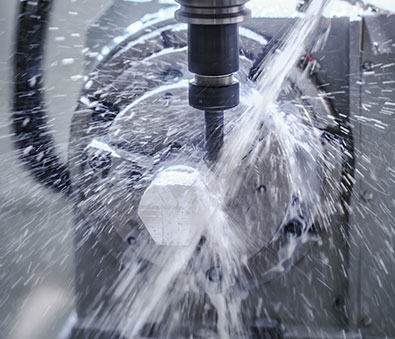
The Importance of Cutting Fluids in Metal Cutting Applications | Zavenir
Cutting fluids: definition, purpose, properties, types, applications, and selection Metal cutting is an essential part of every manufacturing and machining process. Whether you’re turning, milling, drilling, or grinding, these operations generate heat due to friction where the tool comes in contact with the metal. If the there’s not enough lubrication, it can damage both the cutting tool and the workpiece. This leads to a rough surface finish, faster tool wear, and overall reduced productivity. This is where cutting fluids play a crucial role. Cutting fluids, also known as metal cutting oils or coolants, are specialized liquids used to cool and lubricate the tool–workpiece interface. By effectively controlling heat and reducing friction, these fluids enhance machining efficiency and lifespan, and result in high-quality surface finishes. At Zavenir, we offer advanced metal cutting fluids engineered for optimal performance across all machining operations. Our formulations are designed to meet the increasing demands of precision manufacturing, productivity and sustainability. What Are Cutting Fluids? Cutting fluids are liquids, emulsions, or synthetic solutions introduced into machining zones to control temperature and lubricate contact surfaces. They perform three essential roles: Cooling : Dissipate the heat generated during cutting. Lubrication : Minimize friction and wear between tool and workpiece. Flushing : Remove chips and debris from the cutting area. Through this, we can maintain a stable machining temperature, cutting fluids ensure consistent results, higher dimensional accuracy, and a longer lifespan for tools and machines. Purpose and Importance of Cutting Fluids The primary purpose of using cutting fluids in metal cutting operations includes: Corrosion Prevention : Protects both workpieces and machine parts from rust or oxidation. Improved Surface Finish : Provides a clean and polished surface by reducing built-up edges and minimizing tool marks. Low misting & evaporation : Misting in shopfloor affects the health of shopfloor personnel, visibility and fluid consumption by evaporation losses specially in neat cutting oils. Products with better quality base oils and additive selection are less prone to evaporation & misting. HSE : Use of additives without restricted chemicals help reduce environmental impact whereas, better quality base oils ensure higher flash points which contribute to better fire safety. Types of Cutting Fluids Cutting fluids are categorized based on their composition and intended use. The two primary types are: Water Soluble Oils : These products are used after mixing with water. They are widely used in grinding to machining applications and ensure efficient heat dissipation and low consumption. Neat Cutting Oils : Neat oils are directly used. They deliver excellent lubrication and are hence, suited for applications with high material removal or high precision requirement. Types of Water Soluble Cutting Oils 1. Soluble Cutting Oils These are oil-in-water emulsions with higher oil content that offer excellent cooling & lubrication. Soluble cutting oils are widely used in general machining, drilling, and grinding operations where lubrication or surface finish control is crucial. 2. Synthetic Coolants These are entirely free of mineral oil and are made from chemical compounds. Synthetic coolants offer maximum cooling performance, cleanliness, and resistance to microbial growth. They are ideal for CNC grinding, light machining and high-speed cutting. 3. Semi-Synthetic Fluids These fluids blend the benefits of mineral oil and performance additives, providing a balance between cooling and lubrication. Semi-synthetics are highly versatile and used for a wide range of applications on ferrous and non-ferrous materials. Applications of Cutting Fluids Zavenir Daubert’s X-Series cutting fluids are suitable for a wide variety of metal cutting operations Our products are used extensively across industries like automotive, bearing, steel industry, aerospace, heavy machinery and general engineering, where precision and reliability are non-negotiable. How to Select the Right Cutting Fluid Selecting the right cutting fluid can make a significant difference in machining performance and overall productivity. Factors to consider include: Material of the Workpiece : Steel, aluminum, brass, or non-ferrous metals each require specific fluid properties. Tool Material : Carbide, HSS, or coated tools have different lubrication and cooling needs. Type of Operation : High-speed cutting requires greater cooling, while heavy-duty operations need more lubrication. Machine Type : CNC machines may require fluids with low foaming and easy filtration characteristics. Environmental and Safety Standards : Choose biodegradable and non-toxic fluids for sustainability. Zavenir’s team of technical experts assist industries in selecting the most suitable cutting fluid formulation to ensure operational efficiency, cost savings, and environmental compliance. Benefits of X-Cool Water Soluble Oils: Reduced Consumption : Fine Nano-emulsions reduce the carry over of emulsion with parts & chips. Improved Surface Finish : The fluids with optimized lubrication ensure a smoother, high-quality finish. Superior Cooling Efficiency : Rapid heat removal prevents thermal distortion and maintains dimensional accuracy. Corrosion Protection : Prevents rust formation on both workpieces and machine components. Cleaner Operations : Efficient chip removal and low-foaming properties ensure a clean working environment. Environmental Compatibility : Our Boron & Chlorine free formulations meet stringent environmental standards, offering safe disposal and operator comfort. Benefits of X-Cut Neat Oils: Improved Tool Performance : Advanced Extreme Pressure additives help reduce tool wear and enhance tool life. Low misting & evaporation : Highly refined base oils offer high Flash Points which reduce misting and oil losses due to evaporation. Reduced inventory costs : Products with carefully selected Extreme Pressure additives and improved lubricity ensure that products suit multiple applications. Long service life : Our products have high oxidation stability which enhance product life in the machine tanks. Through continuous research and innovation, Zavenir ensures its metal cutting fluids deliver consistent results even under extreme machining conditions. Conclusion Cutting fluids are an indispensable part of modern machining operations. They not only reduce friction and heat but also protect tools, improve finishes, and ensure consistent output. Selecting a high-quality fluid from a trusted manufacturer like Zavenir ensures long-term performance, reduced maintenance, and operational efficiency. Whether you need soluble oils, neat cutting oils, or synthetic coolants, Zavenir provides a complete range of metal cutting solutions tailored for your specific applications.
October 2025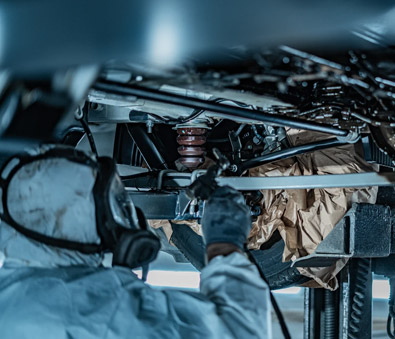
The Real Cost of Corrosion in Manufacturing Industries
The Real Cost of Corrosion in Manufacturing Industries Corrosion is often described as the “silent destroyer.” It creeps in slowly, sometimes unnoticed, but its impact on manufacturing industries is both massive and costly. While most people associate corrosion with visible rust on metal surfaces, the true cost runs much deeper—affecting safety, efficiency, productivity, and profitability. Implementing effective corrosion prevention measures is essential to protect assets and maintain operational excellence. For industries that rely heavily on metal components—such as automotive,, oil and gas, construction, and heavy engineering—corrosion is more than a maintenance issue. It’s a financial burden that can drain resources if not managed proactively. Let’s take a closer look at the real cost of corrosion, why it happens, and how industries can mitigate its impact. How Big is the Problem? According to global studies, the estimated annual cost of corrosion is over $2.5 trillion, which equals nearly 3–4% of the world’s GDP. This staggering figure includes both direct and indirect costs. Direct costs: Repairing or replacing corroded parts, coatings, or structures. Indirect costs: Downtime, lost productivity, safety hazards, product recalls, and damage to reputation. In manufacturing, where precision, quality, and uptime are critical, these costs can quickly spiral out of control. Where Corrosion Hits Hardest 1. Equipment and Machinery Corrosion reduces the lifespan of expensive equipment like presses, molds, engines, and tools. A corroded machine doesn’t just break down faster—it operates less efficiently, leading to higher energy use and inconsistent quality. 2. Infrastructure Factories and warehouses themselves are vulnerable. Roofs, beams, pipelines, and storage tanks all face the threat of corrosion, especially in humid or chemical-heavy environments. Structural corrosion can lead to costly repairs and, in extreme cases, safety incidents. 3. Products and Components From automotive parts to metal assemblies, corrosion during storage or transit can render products unsellable or require costly rework. For exporters, this is a critical challenge, as parts often face long journeys across different climates. 4. Downtime and Lost Productivity A corroded pipe, machine part, or structural element often means unplanned shutdowns. For manufacturers operating on tight schedules, downtime translates directly into lost revenue and missed deadlines. The Hidden Costs of Corrosion While direct expenses like repair bills are easy to calculate, the hidden costs of corrosion are often overlooked: Safety risks: Corroded parts can fail unexpectedly, leading to accidents or injuries. Quality issues: Rust-contaminated products may not meet customer specifications, leading to rejections or recalls. Environmental impact: Leaks or spills caused by corroded systems can trigger costly cleanups and regulatory fines. Reputation damage: Customers are less likely to trust a brand associated with reliability issues. These indirect costs often exceed the visible repair expenses, making corrosion a critical business issue rather than just a technical one. Why Corrosion Happens in Manufacturing Corrosion occurs when metals react with oxygen, moisture, salts, or chemicals in their environment. In manufacturing, several conditions accelerate this process: High humidity or water exposure (common in coastal regions). Chemical-laden atmospheres (in plants using acids, alkalis, or solvents). Temperature fluctuations, which cause condensation and micro-cracks. Poor protective measures, such as inadequate coatings or storage practices. Understanding these root causes is the first step toward reducing corrosion-related costs. Why Corrosion Happens in Manufacturing Corrosion occurs when metals react with oxygen, moisture, salts, or chemicals in their environment. In manufacturing, several conditions accelerate this process: High humidity or water exposure (common in coastal regions). Chemical-laden atmospheres (in plants using acids, alkalis, or solvents). Temperature fluctuations, which cause condensation and micro-cracks. Poor protective measures, such as inadequate coatings or storage practices. Understanding these root causes is the first step toward reducing corrosion-related costs. Solutions That Make a Difference Corrosion protection today goes far beyond applying a coat of paint. Innovative technologies and advanced formulations have transformed how manufacturers approach rust prevention. Some effective strategies include: 1. Protective Coatings High-performance coatings act as a barrier between metal surfaces and corrosive environments. Products like NOX-RUST Coatings, based on SACI Technology, provide superior protection during storage, transport, and long-term exposure. These coatings meet international standards such as US Military MIL Specs, ensuring proven reliability. 2. Dry-to-Touch Oils Unlike traditional greasy oils, dry-to-touch (DTT) formulations leave a clean, dry film that protects metals without messy residues. They allow parts to move directly into assembly or painting without extra cleaning steps—saving time and money. 3. Surface Treatments Processes like phosphating, anodizing, or galvanizing enhance metal resistance and improve adhesion for further coatings. 4. Environmental Controls Dehumidifiers, vapor corrosion inhibitors (VCI)s, and proper storage practices help reduce the environmental triggers of corrosion. Zavenir’s Approach to Cost-Effective Corrosion Protection At Zavenir, we recognize that corrosion is not just a technical challenge—it’s a financial one. Our solutions are designed to help manufacturers protect their assets while reducing lifecycle costs. Proven coatings: With technologies like NOX-RUST®, we deliver industry-leading corrosion protection approved by global players. Cleaner oils: Our Dry-to-Touch oils combine efficiency with ease of use, cutting down on cleaning steps and production delays. Custom solutions: We work closely with industries to design corrosion prevention systems tailored to their specific environments and processes. Sustainability focus: Our eco-friendly, compliant formulations help clients meet global regulatory standards while protecting both assets and the environment. By tackling corrosion at its root, Zavenir helps companies save significantly on hidden costs while ensuring safer, more reliable operations. Conclusion The real cost of corrosion in manufacturing industries goes far beyond surface rust. It impacts equipment life, product quality, safety, productivity, and ultimately profitability. While the numbers may seem daunting, the good news is that much of this cost is preventable. With modern protective technologies, smarter oils, and tailored solutions, manufacturers can cut corrosion-related expenses and build stronger, more resilient operations. For those ready to shift from reactive fixes to proactive prevention, corrosion control isn’t just a technical necessity—it’s a strategic advantage. And with partners like Zavenir, the path to sustainable, cost-effective corrosion protection is clearer than ever.
September 2025
Why Dry-to-Touch Oil is the Future of Rust Prevention
Why Dry-to-Touch Oil is the Future of Rust Prevention Corrosion has always been one of the biggest challenges in metalworking, automotive, and heavy machinery industries. Rust doesn’t just affect the appearance of metal components—it compromises strength, reduces reliability, and leads to costly repairs or replacements. For decades, oils and greases have been used as rust preventives. While effective to some extent, they often come with their own set of drawbacks: messy handling, slow drying, difficulty in application, and challenges in removal before further processing. This is where Dry-to-Touch (DTT) oils, a modern form of rust protection oil, are emerging as a smarter alternative. By combining reliable protection with user-friendly application, these next-generation products are redefining how industries approach rust prevention. The Limitations of Traditional Rust Preventive Oils Conventional rust preventive oils and greases have long been used to protect metal parts during storage or transit. While they form a protective barrier, their drawbacks are well known: Greasy residue: Traditional oils often leave a sticky or oily layer, which attracts dust and dirt. Extra cleaning step: Before painting, welding, or assembly, the coating must often be removed—slowing down production. Worker inconvenience: Oily surfaces make handling and packaging more difficult and messy. Environmental concerns: Many traditional oils are solvent-based, raising issues with VOC emissions and safe disposal. In industries like automotive manufacturing, where efficiency, cleanliness, and compliance are critical, these issues can no longer be ignored. What Makes Dry-to-Touch Oils Different? Dry-to-Touch oils are specially formulated to overcome these challenges. As the name suggests, once applied, they leave behind a thin, non-oily film that feels dry to the touch. This innovative feature creates a protective layer without the greasy drawbacks of traditional oils. Key Benefits of Dry-to-Touch Oils: 1. Cleaner protection: The dry film doesn’t attract dust, dirt, or debris, keeping parts cleaner during storage and transport. 2. No need for removal: Components can often move directly into assembly, painting, or welding without additional cleaning steps. 3. Faster drying times: Unlike heavier oils, DTT products dry quickly, improving production efficiency. 4. Enhanced corrosion resistance: Despite being dry, the protective film is highly effective against humidity, moisture, and atmospheric contaminants. 5. Improved handling: Workers can handle coated parts without mess, making packaging and assembly more convenient. 6. Eco-friendly options: Many DTT formulations are low-VOC and environmentally compliant. The result is a rust-preventive solution that saves time, reduces costs, and enhances workplace safety—all while delivering long-lasting protection. Why Industries Are Moving Toward Dry-to-Touch Oils 1. Automotive Manufacturing The automotive sector faces some of the harshest challenges when it comes to corrosion. From underbody parts exposed to road salts to engine components that must withstand heat and moisture, corrosion protection is non-negotiable. Dry-to-Touch oils are especially valuable for parts in transit or awaiting assembly, where cleanliness and efficiency are key. 2. Metalworking and Engineering Machine parts, tools, and fabricated components often sit in storage before being put to use. DTT oils keep them rust-free without requiring extra cleaning before machining or installation, saving significant time on the shop floor. 3. Export and Long-Term Storage When shipping parts overseas or storing equipment for months at a time, traditional greases may cause issues with packaging and removal. Dry-to-Touch coatings offer a cleaner, more reliable solution for extended protection. The Business Advantages of Dry-to-Touch Oils Switching to Dry-to-Touch oils is more than just a technical upgrade—it makes strong business sense. Reduced operational costs: By eliminating the need for degreasing or cleaning before further processing, manufacturers save on labor, chemicals, and time. Fewer defects and rework: Cleaner protection reduces contamination, ensuring better surface quality for painting, coating, or assembly. Improved worker productivity: Easier handling and reduced mess make workflows smoother and safer. Stronger compliance: With increasing global pressure to move toward sustainable, eco-friendly processes, DTT oils help companies align with stricter regulations. In short, these oils provide not just rust protection, but a competitive edge. Zavenir’s Role in Driving the Change At Zavenir, innovation in corrosion prevention has always been at the core of what we do. Our advanced Dry-to-Touch oil formulations are designed with the specific needs of modern industries in mind—balancing protection, efficiency, and sustainability. Built on advanced chemistries, they provide superior protection against outdoor exposure and humid climates. They simplify logistics by making handling, packaging, and shipping cleaner and more efficient. By reducing the need for pre-treatment before further processing, they help manufacturers streamline their operations. With expertise across automotive, engineering, and heavy industries, Zavenir is helping companies move away from outdated, messy oils toward the future of clean, efficient, and eco-friendly corrosion protection. Looking Ahead: The Future of Rust Prevention The demand for high-quality, sustainable, and user-friendly protective solutions will only grow stronger. As industries face tighter regulations, increasing global competition, and higher customer expectations, technologies like Dry-to-Touch oils are no longer optional—they are becoming the new standard. For manufacturers, adopting these solutions means more than just keeping rust away. It’s about achieving cleaner production lines, faster processes, lower costs, and greater customer satisfaction. And with companies like Zavenir leading the charge, the transition to smarter, safer rust prevention has already begun. Conclusion Rust has been an age-old enemy of metals, but the tools to fight it are evolving. Dry-to-Touch oils represent a significant leap forward—combining effective corrosion protection with the cleanliness, efficiency, and sustainability of today's industries demand. The future of rust prevention is not greasy, messy, or wasteful. It’s clean, dry, and efficient. And with innovative partners like Zavenir, that future is already here.
September 2025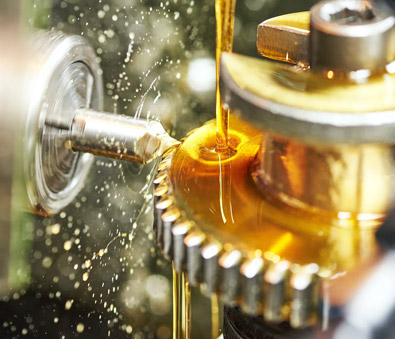
How the Wrong Metal Working Fluids Increases Downtime
The Secret Role of Cleaner in Industrial Manufacturing When we think about industrial manufacturing, the first things that come to mind are heavy machinery, lubricants, metal cutting fluids, and precision processes. But behind every efficient production line and flawless finish lies an unsung hero: the industrial cleaner. Though often overlooked, cleaners and degreasers play a critical role in ensuring smooth operations, higher product quality, and longer machine life. From removing stubborn grease and contaminants to ensuring lower emissions or enabling smooth fluid flow, the right cleaning solution can make the difference between a high-performing plant and a quality nightmare. Here, we will try to uncover the critical role of cleaners in industrial manufacturing, explore how they work, and why choosing the right formulation like Zavenir’s advanced industrial cleaners can elevate your performance standards. What Is an Industrial Cleaner? An industrial cleaner (or degreaser) is a specially formulated chemical solution designed to remove dirt, oil, dust, and metal residues or chips from machined components and other important parts like bins used for carrying components in manufacturer’s shopfloors. Unlike household cleaners, industrial cleaners must perform under tough conditions dealing with heavy grease, high temperatures, and precision equipment. They are formulated to: Dissolve and separate contaminants without damaging surfaces Improve operational safety by reducing potentially damaging residues Provide adequate in-process corrosion protection to prevent damage to the surface in between operations Prepare surfaces for subsequent operations like rust preventive oil or wax application, coating, painting, or assembly Industrial cleaners can be water-based, solvent-based, or alkaline, depending on the specific application and contamination type. Why Cleaning Is Critical in Manufacturing In a fast-paced metal processing application, every process depends on the cleanliness of the equipment. Over time, machines accumulate oil films, metal shavings, coolant residues, and carbon deposits. These contaminants can silently sabotage productivity in multiple ways: 1. Reduced heat transfer leading to overheating and inefficiency 2. Corrosion and rust formation on metal components 3. Poor lubrication as contaminants mix with oils and greases 4. Dimensional inaccuracies & surface quality in machining operations 5. Shorter tool and equipment lifespan due to abrasive particles In short, cleanliness isn’t cosmetic, it's a functional requirement. A properly cleaned component performs better and lasts longer. The Science Behind Industrial Cleaning The effectiveness of a cleaner depends on its chemical composition and action mechanism. A well-formulated industrial cleaner works on three core principles: 1. Chemical Action Cleaners contain surfactants or solvents that chemically react with oil and grease, breaking them into smaller molecules that can be easily removed. 2. Mechanical Action When used in cleaning equipment like ultrasonic tanks, pressure sprayers or jet spray washing equipment, or other agitation systems, cleaners also physically dislodge contaminants from surfaces using the agitation. Cleaning efficiency also increases with time given for 3. Thermal Action Most industrial cleaning is done at controlled temperatures. Heat boosts chemical reactions, making the cleaning process faster and more effective. Together, these actions ensure efficient cleaning without causing corrosion, surface damage, or residue buildup. Types of Industrial Cleaners Different industries and applications require different types of cleaners. Here’s an overview: Mild Alkaline or Neutral Aqueous Cleaners These are eco-friendly and safe for both workers and the environment. They use a fine balance of surfactants and alkaline agents to remove oil, dirt, and metal fines. Perfect for general maintenance cleaning and degreasing of light machinery. Best for: Precision cleaning, non-ferrous metals, general equipment maintenance, and pre-paint preparation. Solvent-Based Cleaners These cleaners are designed for tough, heavy-duty grease, oil and tar removal. They evaporate quickly, leaving no residue which is ideal for components where components are more prone to rust or require higher temperature cleaning due to which water-based cleaning isn’t suitable. Best for: Automotive parts, electrical components, and tools requiring residue-free cleaning or by vacuum degreasing. Alkaline Cleaners Highly effective against heavy oils, carbon deposits, and metallic contaminants, these are often used in immersion tanks or spray systems. The Hidden Benefits of Industrial Cleaners Using a high-quality cleaner is not just about appearance it directly impacts machine health, product quality, and cost efficiency. Let’s explore how. 1. Prolongs Machine and Tool Life Regular cleaning prevents abrasive particles and metal fines from damaging surfaces and bearings. A clean machine runs smoother, with less friction and wear, which extends operational life and reduces maintenance costs. 2. Enhances Product Quality and Finish In precision manufacturing, even microscopic residues can cause defects or poor adhesion during coating or painting. Cleaning ensures consistent, high-quality output. 3. Enhances Product Quality and Finish In precision manufacturing, even microscopic residues can cause defects or poor adhesion during coating or painting. Cleaning ensures consistent, high-quality output. 4. Prevents Corrosion and Oxidation Residual oils and coolants can trap moisture, leading to corrosion. Industrial cleaners neutralize such contaminants, protecting both tools and components. 5. Ensures Workplace Safety Oil films and greasy residues can create fire and slip hazards. Regular use of degreasers ensures a safer, cleaner, and more compliant workplace. 6. Reduces Downtime and Maintenance Costs Cleaner machines are easier to inspect, maintain, and repair. Routine cleaning helps detect early signs of wear or leaks, preventing costly breakdowns later. Zavenir’s Advanced Cleaning Solutions for Industrial Excellence In today’s fast-paced manufacturing world, cleanliness directly impacts performance and reliability. Zavenir Daubert’s X-CLEAN Advanced Cleaning Solutions are engineered to tackle the toughest industrial cleaning challenges ensuring every component meets the highest standards of precision and protection whilst using the greener, more environment friendly ingredients. 1. X-CLEAN™ Advanced Aqueous Cleaners When it comes to eco-friendly and powerful metal cleaning, the X-CLEAN™ range leads the way. Using Latest Surfactant Technology, these Boron-free & bio-degradable products efficiently remove oil, grease, and fine particulates effectively even at lower temperatures. Controlled foaming and excellent rinse ability make it perfect for precision metal components that demand a spotless finish before coating or assembly. 2. Solvent Cleaners Zavenir’s solvent cleaners are based upon highly refined solvents which efficiently dissolve residual contaminants and oils from metal surfaces after machining or washing. The low-VOC, de-aromatized hydrocarbon base ensures complete drying and minimal residue in vacuum degreasing and ultrasonic cleaning applications. These products are ideal for automotive, engineering, and export packaging industries, these fluids also form the first line of defense against rust and oxidation. Sustainability and Safety: The New Standard Modern manufacturing demands responsible cleaning solutions that don’t harm people or the environment. Zavenir’s cleaners are designed with sustainability in mind: Low VOC emissions for cleaner air quality Non-toxic formulations Reduced chemical consumption through concentrated efficiency Eco-friendly surfactants that are biodegradable Safe for operators, minimal odor and skin irritation By switching to Zavenir’s advanced cleaning solutions, industries can meet global environmental standards while maintaining top-tier performance. Best Practices for Industrial Cleaning To get the best out of your cleaning system, consider these proven practices: 1. Choose the right cleaner based on contamination type and material. 2. Follow concentration guidelines to avoid overuse or residue formation. 3. Maintain temperature and pH levels for optimal chemical action. 4. Regularly replace cleaning baths or filters to prevent recontamination. 5. Train operators on correct cleaning techniques and safety protocols. Consistent implementation of these steps ensures maximum efficiency and longer equipment life. Final Thoughts In the complex ecosystem of industrial manufacturing, cleaners are the invisible force that keeps everything running smoothly. They safeguard your machines, improve product quality, reduce maintenance costs, and ensure a safer workplace. Ignoring the role of cleaning can lead to inefficiencies, corrosion, and unplanned downtime issues that can be easily prevented with the right maintenance practices. With Zavenir’s scientifically engineered cleaners, you get: Superior cleaning power Longer equipment life Safer and more sustainable operations So, the next time you admire a perfectly clean component or a smoothly running production line, remember it’s not just the lubricants or tools doing the job; it’s also the cleaners working silently but efficiently behind the scenes.
September 2025
Driving the Future of Specialty Chemicals: Performance Meets Sustainability
Driving the Future of Specialty Chemicals: Performance Meets Sustainability The specialty chemical industry in India is changing faster than ever. For many years, the focus was only on performance—creating products that could deliver strength, speed, and efficiency. But now, the story has another side: sustainability. Today, industries want products that not only work well but are also safe for people and the planet. Companies like Zavenir are leading this change by creating sustainable chemical solutions that combine high performance chemical solutions with eco-friendly practices. From metalworking to rust prevention, Zavenir is helping eco-friendly industrial chemicals that help industries to reduce their environmental footprint while keeping machines stronger and safer for longer. Why the Industry is Evolving India’s growth story in specialty chemicals is exciting. Demand is rising in automotive, construction, engineering, and manufacturing. But modern businesses are looking beyond just results. They want solutions that are: Safe for workers Kinder to the environment Compliant with strict global standards Reliable and cost-effective over the long run This shift has pushed companies to innovate smarter, and Zavenir is answering the call with products designed for the future. The Hidden Cost of Corrosion Corrosion is a slow problem, but it causes huge losses. Around the world, industries lose billions every year because of rust damage, machine breakdowns, and unplanned downtime. Here’s how sustainable corrosion protection solutions impacts industries: Shorter life of machines and equipment Lower productivity due to breakdowns High repair and replacement costs Safety risks for workers For decades, rust prevention relied on chemicals that were harmful to both people and the planet. But times are changing. Today, industries are turning to sustainable chemistry—products that help corrosion prevention and control protect against corrosion without harming the environment. A Smarter Solution: High Flash Rust Preventive Oils One of the latest and most effective innovations in this field is eco-friendly rust preventive oil. These oils are designed to solve two major challenges—safety and sustainability—without compromising performance. Why They’re a Game-Changer 1. Safer to Us With a high flash point, these oils lower fire risks, making them safer for workers and industrial environments. 2. Eco-Friendly They are made with greener chemistry, cutting down the impact on nature. 3. Longer Equipment Life By creating a strong protective layer, these oils prevent rust and keep machines running longer and smoother. 4. Less Waste, Lower Carbon Footprint Since the protection lasts longer, there’s less need for re-application, which reduces waste and energy use. 5. Globally Compliant These oils meet international standards, helping companies stay compliant while improving their sustainability scores. For industries like automotive, engineering, and heavy manufacturing, adopting such solutions is not just smart—it’s essential for long-term success. Zavenir’s Role in the Sustainability Journey At Zavenir, innovation is tied closely to responsibility. The company invests in research and development to design products that: Support the circular economy by using resources efficiently. Replace harmful substances with safer alternatives. Deliver the same (or better) performance compared to traditional chemicals. Help businesses meet customer expectations and regulatory norms. This commitment ensures that industries can focus on growth while knowing they are also doing their part for the planet. Why Sustainable Chemicals Matter More Than Ever Switching to sustainable specialty chemicals isn’t just about looking good or meeting rules. It has real business benefits: Lower costs – Machines last longer and need fewer repairs. Better brand image – Customers and partners trust companies that care about the environment. Competitive advantage – Staying ahead of global sustainability trends builds long-term value. Safer workplaces – Employees feel secure working with safer products. In short, sustainability is not an expense—it’s an investment in the future. Looking Ahead The specialty chemical industry is on the verge of a new era. The future belongs to solutions that bring together performance and responsibility. As industries expand, the need for safe, eco-friendly, and efficient products will only grow stronger. Zavenir is playing a key role in this journey. From high flash rust preventive oil to other advanced formulations, the company continues to push boundaries—ensuring that industries can grow without harming the environment. Conclusion Performance alone is no longer enough. In today’s world, industries need solutions that are powerful, safe, and sustainable. Zavenir understands this balance and is committed to developing products that protect machines, reduce costs, and safeguard the planet. The path forward for specialty chemicals is clear: innovation with responsibility. And with Zavenir driving this change, the future looks brighter, safer, and more sustainable for all.
September 2025
Technology & Automation for Efficient Production & Quality Control
Technology & Automation for Efficient Production and Quality Control (Beginner’s Guide) Think of automation like cruise control for your factory.You set a speed (the method). The system keeps it steady. People still steer, watch the road, and improve the route. What is Automation Efficiency? Automation efficiency basically refers to the measure of how effectively automated system performing task that assigned. its benefits such as increased productivity. improve quality, reduced errors, which help saving cost by streamlining processes, eliminating repetitive work and it allow skilled workers more productive to focus on the other higher value work. it is done by after introducing automation to optimized processes to expand their efficiency and it can be measured by KPIs like automation efficiency rate (AER), cycle time, error rates, and throughput. Why should we care? • Less waiting: Fewer pauses while someone looks for a spec or the right material. • Fewer mistakes: The system checks things before the line starts. • More output: The same team and machines make more good products. • Happy customers: Consistent quality and clean paperwork (like CoA). How does automation increase productivity? Short answer: it removes friction. 1. Less downtime Sensors warn you before a part fails. Planned stops replace surprise stops. 2. Faster changeovers Saved recipes and checklists reduce setup time. 3. Lower rework Cameras and in-line sensors catch defects early, not at the end. 4. Quicker decisions Live dashboards show that what’s happening now. Don’t take time to showcase end-of-day reports. 5. Same quality at any scale Interlocks and digital SOPs ensure best practice every time. Numbers example: A typical line at 80% Availability, 85% Performance, 95% Quality gives 64.6% OEE. With small fixes (90%, 90%, 98%), OEE becomes ~79.4%. That’s a big lift without adding people. Simple examples on the shop floor • Barcode + interlock: Scan the raw-material lot. If it’s wrong, the machine won’t run. • Vision QC: A camera spots tiny surface or print defects at line speed. Bad pieces auto-reject. • Auto lab data: Test instruments send results to the system. If out-of-spec, a hold is created. • Smart storage (WMS/ASRS): The system tells you where to put and pick. First-expiry, first-out happens by default. • Energy tracking: See kWh per kg by batch. Fix leaks and spikes fast. A 90-day starter plan Days 1–30 — See clearly • Pick one line. • Track only a few things: run time, stops, rejects, changeovers. • Put a simple OEE board on a TV so the team can see it live. Days 31–60 — Stop common mistakes • Add barcode checks for materials. • Lock key recipe settings. • Connect lab instruments so results attach to the lot automatically. Days 61–90 — Join the dots • Connect the line to your stock system so lots and CoA flow without emails. • Add a basic camera at the biggest defect point. • Start simple alerts for top 5 failure modes. What should we measure? • OEE (Availability, Performance, Quality) by line and shift. • First-Pass Yield (made right the first time). • Changeover time and schedule adherence. • Customer complaints per 1,000 orders. • Inventory accuracy in storage. • Energy per unit (kWh/kg). Common worries Will automation replace people? No. It replaces routine and rework. People still make decisions, improve methods, and handle exceptions. Is this just digitising paperwork? Digitising stores data. Automation uses data to act (e.g., wrong lot scanned → line won’t start). Do we need AI from day one? No. Start with rules and interlocks. Add AI later for things like vision defects or pattern detection. What if the system fails? Keep a manual fallback and clear override rules. Train the team. Practice once a quarter. The human side • Use simple screens and clear Andon signals (what’s wrong + what to do). • Let people stop the line if the method isn’t followed. • Celebrate fixing the cause, not the person who “worked late.” Automated process: Steps that run by themselves with checks (scan lot, load recipe, start). • OEE: A score of how well a line runs (up-time × speed × quality). • Interlock: A safety/quality rule a machine won’t break. • Vision QC: A camera that checks defects at speed. • WMS/ASRS: Software + storage that guides where items go and come from. • CoA: Certificate of Analysis given to the customer with results. • SOP: Standard Operating Procedure (the agreed method). Conclusion Automation efficiency is a calm, steady way to run a plant.Make the method unbreakable. Wire the data once. Let people focus on improvement. Start small, prove one win, then scale.
September 2025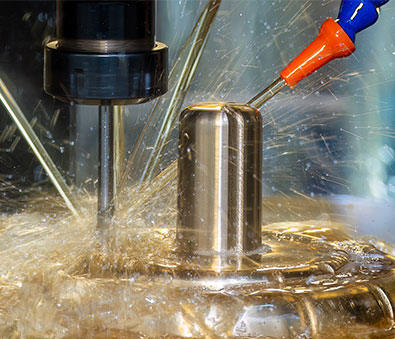
How to Choose the Right Cutting Oil?
How to Choose the Right Cutting Oil? Introduction Metalworking fluids play a vital role in manufacturing processes, where component quality, efficiency, and tool performance are of prime importance. Their functions are to provide lubrication for overcoming friction, dissipate the heat generated and remove chips produced during metal cutting. Selecting the right cutting oil is critical in obtaining the best machining performance. Since neat and water miscible products offer different attributes, we have specific applications where each is more suitable. Neat cutting oils provide better lubricity whereas, water miscible cutting oils provide better cooling during machining Applications for Neat Cutting Oils Neat oils are more suited for heavy duty machining applications where the Material Removal Rate (MRR) is high as we have to counter more friction for example, gear hobbing, broaching etc. Due to high lubrication property, these products are able to give better surface finish in critical finishing applications like lapping, honing and even in some critical grinding applications like gear profile grinding. In some cases the machine tank, pump & filtration systems are designed for neat oils and hence, they are preferably used Some materials may react in presence of water making it preferable to use neat oils, example Magnesium Applications for Water Soluble Cutting Oils Water miscible oils offer better heat dissipation for applications where the machining speeds are high but material removal rate is not too high for example turning, reaming etc. These products also offer better flushing of chips which makes them more suited to application where efficient chip removal is necessary like general grinding Machine, filtration & tank design also leads to selection of water miscible products in some cases. Zeroing down to the right product is done differently for neat & water soluble oils Neat Cutting Oil Selection Primary Selection Factors: Application severity: The material removal rate drives the need for lubrication. Products with higher viscosity are able to provide better lubrication in more severe applications. Selecting a higher viscosity product in a less severe application may hamper the heat dissipation and the chip flushing. Material Type: Hard to cut metals resist metal removal by higher friction and hence, require high-lubricity oils, while softer materials may only need effective cooling. Some non-ferrous metals like Copper & its alloys and sensitive grades of Aluminium require products with inactive sulphur-based additives Machine Tool used: Type of machine tools, their filtration system, presence of chiller, mist collection systems and machining parameters used can also influence selection of the product Surface Finish Requirements: Accuracy parts post final machining operations may require fluids that assist in a smooth surface finish. Health, Safety, Environmental Impact: Chlorinated products are toxic and may be carcinogenic over long term usage. Products with base oils derived from plant sources are biodegradable and skin friendly Water Soluble Cutting Oil Selection Primary Selection Factors: Material Type: Ferrous metals have a need more alkalinity to prevent rusting whereas non-ferrous metals may corrode to give stains on the surface. Porous, short chipping metals like cast iron require low oil content to ensure better chip flushing and optimised consumption. Non-ferrous metals like Aluminium alloys are sticky and require higher more lubricity by virtue of additives or oil content. Sensitive non-ferrous alloys require a product with specific dosages of metal de-activators. Application severity: The material removal rate drives the need for lubrication. Products with higher oil content or lubricity additives are able to provide better lubrication in more difficult applications while grinding requires products with low or no oil content Machine Tool used: Type of machine tools, their filtration system and coolant pressure used can also influence selection of the product Health, Safety, Environmental Impact : Chlorinated products, products with boron salts and formaldehyde releasing biocides are toxic and may even be carcinogenic over long term usage. X-Series high-performance metalworking fluids by Zavenir Daubert are designed to meet to new-age requirements of manufacturing operations. X-COOL range of water miscible cutting fluids form fine Nano-Emulsion which significantly reduce the carry over losses and these products are formulated selected advanced additive technology which offer the following benefits : Low top-up consumption High emulsion stability Superior corrosion protection Cleaner machines & components and Long sump life due to high biostability X-CUT neat cutting oils are formulated using highly refined base oils with high flash points and selected dosages of high-performance Extreme Pressure additives which result in : Low evaporation & misting Improved tool performance Reduced inventory costs due to versatile products Superior surface finish & dimensional accuracy
August 2025
How to Safely Store Metalworking Coolants?
How to Safely Store Metalworking Coolants? Metalworking coolants are essential for machining-they help extend tool life, improve surface finishes, and keep operations running smoothly. However, improper storage can lead to contamination, reduced performance, and even safety hazards. To get the most out of these fluids make sure to store them in a safe workspace. Also, it is important to follow proper storage guidelines listed by the manufacturer. Importance of Proper Storage Techniques Proper storage techniques are the need of the hour since they help you save your investment by improving the overall life of the metalworking coolants. Here are a few notable benefits: Prevents Contamination: When you store the coolants properly and keep them free from dust, dirt, and other impurities, it overall improves the performance of the coolants. Following Safety Compliance: Following storage guidelines helps meet safety regulations that reduce risks from spills or leaks. Saves Money: When you store the cutting oils properly, it extends the life of cutting oils. It prevents waste and reduces costs. Protects the Environment: Safe storage minimizes the risk of leaks and spills that could harm the environment. Improves Efficiency: Storing coolants correctly makes them easier to access and manage, so you always have what you need when you need it. Improve Workplace Safety: A well-organized storage area reduces the risk of spills, accidents, and injuries. How to Store Metalworking Coolants Safely? Keep it Cool & Dry: Store coolants in a temperature-controlled environment to prevent them from breaking down. Check the product’s technical datasheet for ideal storage conditions. Use the Right Containers: Always store coolants in their original, sealed containers or certified storage vessels to prevent leaks and contamination. Label Everything: Clearly mark all containers with product names, batch numbers, and expiration dates for easy identification. Maintain Proper Ventilation: Store coolants in a well-ventilated area to prevent the buildup of harmful vapors. Also, take care of the fire safety. Have Spill Kits Ready: Keep spill kits nearby to quickly respond to leaks or spills. Follow FIFO (First In, First Out): Use older stock first to prevent coolants from expiring without being used. This can increase the wastage. Inspect Regularly: Check storage areas for leaks, damage, or expired products to make sure of safety. Control Humidity: Keep humidity levels low to prevent microbial growth in water-based coolants. Common Mistakes to Avoid Ignoring Expiration Dates: Expired coolants can lead to machining issues - always check and dispose of the outdated products properly. Leaving Containers Open: Make sure that the containers in which you store the coolants are properly sealed. Make sure lids are always secure. Store in Direct Sunlight: Heat and UV exposure degrade coolant quality to a certain extent. Thus keep them in a cool or shaded area. Don‘t Mix Different Products: Combining different coolants can cause unwanted chemical reactions. Thus, always store them separately for safety purposes. Neglecting Safety Data Sheets (SDS): SDS documents provide critical storage and handling information. Always refer to them for the storage guidelines. Ignoring Regulations: Failing to follow local storage laws can result in fines and safety risks-stay informed. Skipping Employee Training: Always train the workers/employees about handling the products. Untrained staff increases the risk of spills, contamination, and improper storage. Conduct regular training sessions to have high safety standards within your organization. You can extend the life of your metalworking coolants, reduce costs, and ensure a safer workspace by following the proper storage guidelines, and avoiding common mistakes. Proper storage isn't just about organization. It’s about protecting your investment and maintaining efficiency in your operations. Storage of Zavenir Daubert’s X-COOL®, X-CUT® Products X-COOL & X-CUT series of high-performance Metal Working Fluids by Zavenir Daubert improve component quality and productivity while making sure of operator and process safety. For storing these products you should maintain similar guidelines as storing other coolants. Store them in a cool and dry place, keep them in separate containers, and label them properly. Also, make sure that they are used before expiring. Conclusion By following proper storage practices, you can extend the life of your metalworking coolants, reduce costs, and maintain a safe, efficient workspace. Investing in safe storage today ensures better performance and fewer risks in the long run.
March 2025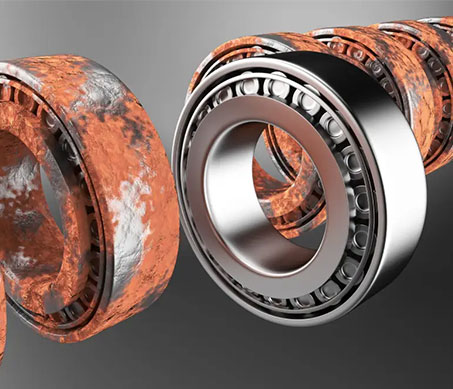
How Industrial Rust Remover Can Save Your Metals
How Industrial Rust Remover Can Save Your Metals? Industrial rust removers are designed to eliminate rust from metal surfaces. These chemicals work by either dissolving the rust or converting it into a stable compound. Acid-based chemicals like hydrochloric and phosphoric acids are effective but can be harsh on metals. Chelating agents and neutral pH solutions are gentler and eco-friendly. Rust removers come in various forms, including liquids, gels, and sprays, and are used across industries such as automotive, manufacturing, and metalworking. Selecting the right chemical depends on the extent of rust, surface type, and safety considerations. Types of Industrial Rust Remover and How They Work? 1. Rust Removers based on Acids: A strong acid that reacts with rust and dissolves it. They can help remove the rust at a high speed and can clean highly rusted surfaces but they can also be corrosive to the component if left in contact for long duration. They need to be used with adequate safety precautions as they may act as an irritant to the skin and respiratory system. 2. Chelating Agents: They bind to rust molecules and pull them away without damaging the metal surface. They are milder on metals and are safe to use but the application time may be comparatively higher than acidic products. 3. pH Neutral products: A neutral pH rust remover reacts with rust without damaging the component. These are applicable on ferrous and non-ferrous metals. They are non-corrosive and safer to use, thus minimizing risk to users and the environment. The application time required for removal of heavy rust may be higher. 4. Rust Converters: They convert rust into a stable surface which can be used for coating or painting processes. They create a protective layer over the rusted metal and offer corrosion protection by creating a protective layer over the treated area. They may not be able to remove heavy rust. 5. Solvent-Based Rust Removers: They help to dissolve light rust and surface impurities like dirt or grease making the surface cleaner. They cannot remove heavy rust; they pose the risk of catching fire and thus require adequate ventilation during use. 6. Electrolytic Rust Removal: This process involves dipping the rusted part in a solution and electrical current is used to convert the rust back into its original form by electrolysis. Highly effective for heavy rust removal and can restore items without damaging the surface but they require special equipment and take more time for component restoration. What are Strong Rust Removers? Are they safe in use? Strong Rust Removers generally have acids such as Hydrochloric Acid and Phosphoric Acid. They remove rust very fast, they are useful in removing heavy rust, but they are corrosive to both metal and human skin and hence, they require careful handling with protective equipment. Therefore, it is always recommended to use personal protective equipment (PPE) like gloves, goggles, and masks. These products must be used in well-ventilated areas, and the component surface must be rinsed well afterward to prevent it from rusting again. Which Rust Removal Chemical Should We Use? To ensure effective removal of rust and also keeping in mind safety & ease of use, we should select a product that is environmentally friendly, has a neutral pH, and it has chemicals which are not corrosive in nature. The choice of rust remover, however, ultimately depends on the specific needs of the task, taking into consideration factors such as the type of metal, the severity of the rust, and any safety concerns. This balanced approach allows for efficient rust removal without compromising the integrity of the metal or the safety of users and the environment. Zavenir Daubert’s Effective and Eco-Friendly Rust Remover - Rust Revenge® Zavenir Daubert’s Rust Revenge is a safe and effective rust remover that tackles rust and corrosion without harmful chemicals. It not only removes rust quickly but also protects surfaces from future damage that makes it a great choice for anyone looking to maintain their equipment while being kind to the environment. Below are a few key features of Rust Revenge® 1. Water-Based, Neutral pH and Acid-Free: Rust Revenge® is a water-based formula that eliminates the need for harsh chemicals. The neutral pH and absence of acids make it safe for use on a wide variety of metals without corroding or damaging them. 2. Non-Hazardous and Non-Corrosive: Safe for users and metal surfaces, it does not emit harmful fumes or cause skin irritation. 3. Non-Toxic and Non-Flammable: Safe to handle and store, posing no fire or health risks. 4. Easy Disposal, Biodegradable and Eco-Friendly: The formula is environmentally friendly and biodegradable nature ensures simple and safe disposal practices. 5. Fast-Acting and Safe for non-rusted Metals: Delivers quick rust removal while maintaining the integrity of non-rusted metals. Unlike strong acids, it will not harm non-rusted surfaces. 6. Reusable: Rust Revenge® can be reused up-to few times, making it a cost-effective solution. Conclusion Zavenir Daubert’s Rust Revenge® offers an effective and eco-friendly solution for rust removal that prioritizes safety and sustainability. With its fast-acting formula and gentle approach, it's the ideal choice for preserving metal integrity while minimizing environmental impact.
October 2024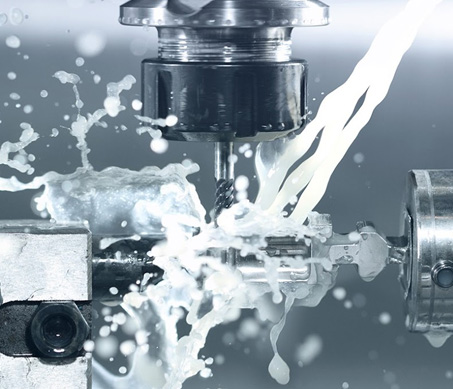
Purpose, Uses and Application of Water Soluble Cutting Oil
Purpose, Uses and Application of Water Soluble Cutting Oil Water soluble cutting oil is used to improve the metalworking operations by providing cooling and lubrication during numerous machining processes. It dissipates heat that is generated during cutting. This prevents tool wear, improves surface finishing, and minimizes corrosion on machined parts. These water soluble cutting oils form a stable emulsion when mixed with water. This helps in effective heat dissipation, smooth machining, and reduced friction. They help in chip removal, preventing material build-up on tools and maintaining precision during operations. This makes them essential for machining operations that involve ferrous and non-ferrous metals across various industries. Purpose of Water Soluble Cutting Oil Cooling and Lubrication: These oils dissipate heat generated during machining to provide lubrication between the tool and workpiece which extends tool life and improves surface finish. Corrosion Protection: These oils contain additives that protect machined parts and equipment from rust and corrosion, even in the presence of water. Chip Removal: It helps in removal of metal chips and debris that ensures a clean work area and prevents chips from affecting the precision of the operation. Emulsion Stability: These water soluble metalworking oils form a stable and long-lasting emulsion when mixed with water. This emulsion helps maintain consistent lubrication and cooling throughout the metalworking process. Environmental Benefits: Since these oils are water-based, they are more eco-friendly and offer easier disposal and lower environmental impact compared to petroleum-based oils. Versatility: These water based cutting oils are suitable for use in various machining operations, including milling, turning, drilling, grinding, and tapping. These many usages make these oils ideal for various industries. Uses of Water Soluble Cutting Oil Metalworking: These oils are widely used in various metal cutting processes such as turning, milling, drilling, grinding, etc. to cool and lubricate the tool and workpiece. Automotive Industry: These are used in the machining of engine components, transmission parts, and other precision metal components that require high tolerance levels. Aerospace: Used in machining high-performance alloys for aerospace applications, ensuring precise cutting and reducing wear on expensive cutting tools. Heavy Machinery: The water based oils are essential in the production of large-scale machinery parts, such as gearboxes, turbines, and hydraulic systems, where consistent performance is needed. Tool Manufacturing: Applied in the grinding and sharpening of cutting tools to maintain accuracy and prevent tool degradation. Die and Mold Cutting: Essential in cutting and shaping molds and dies, providing excellent lubrication and heat dissipation for precision in fine cutting. Applications of Water Soluble Cutting Oil Machining of Ferrous and Non-Ferrous Metals: Suitable for a wide range of metals including steel, aluminium, copper, titanium alloys, etc. Milling: Supports high-speed milling operations by maintaining stable temperatures and reducing friction between the tool and the workpiece. Drilling and Tapping: Offers excellent performance in drilling and tapping operations by reducing tool wear and improving chip evacuation. Grinding Operations Used in surface, cylindrical, and centerless grinding operations where temperature control and surface finish are vital. Broaching: Ensures smooth broaching operations, minimizing the risk of tool breakage and ensuring precision in the removal of material. Sawing and Cutting: Used in sawing and cutting applications to boost cutting speed, reduce heat, and extend tool life. Zavenir Daubert’s X-COOL® Water-Soluble Cutting Oil Zavenir Daubert’s X-Cool Water soluble cutting oil based on Nano-emulsion technology stands out in the market of water based cutting oil for machining processes. Below are some of the notable features of the X-Cool Cutting Oil. Advanced Cooling: X-COOL® provides superior cooling capabilities, designed specifically for high-speed machining processes that require excellent thermal control. Lubrication Efficiency: It ensures efficient lubrication between cutting tools and workpieces, reducing friction and extending the life of cutting tools. Rust and Corrosion Protection: Contains state-of-the-art additives that protect metal surfaces from oxidation, ensuring no rust or corrosion forms on the machined parts. Environmentally Friendly: These Boron free products are environmentally safe, making it a preferred choice for sustainable manufacturing operations. Stable Emulsion: X-COOL® forms a long-lasting, stable emulsion with water, reducing the need for frequent oil changes and ensuring consistent performance throughout its use. Versatile Use: Suitable for a wide range of metalworking applications including turning, milling, drilling, and grinding across multiple industries. Economical: Designed to reduce operational costs by minimizing tool wear, decreasing downtime for tool changes, and optimizing coolant usage. Compatibility: Works effectively with both ferrous and non-ferrous metals, making it a versatile solution for various metal machining operations. Conclusion Water soluble cutting oils are important for improving efficiency, precision, and tool longevity in metalworking processes. Their versatility and eco-friendly properties make them a preferred choice across industries for machining both ferrous and non-ferrous metals.
October 2024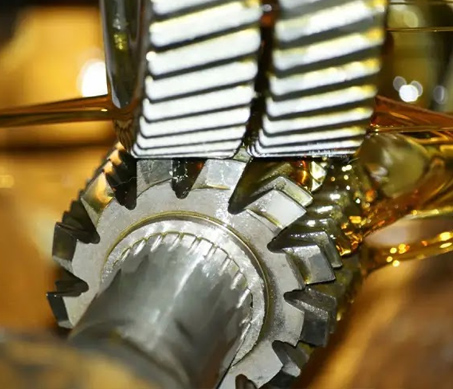
A Guide to Choosing Neat Cutting Oils for Machining Process
A Guide to Choosing Neat Cutting Oils for Machining Process Metal Working processes require correct cutting fluid to achieve desired part quality and productivity. While the primary benefits of MWF are efficient lubrication, heat dissipation and removal of chips from the component, the secondary benefits are more application specific like requirements of different metallurgies, quality requirements, material removal rate, application severity, operator needs etc. Although water soluble cutting oils are applicable in most of the operations, neat cutting oils are still preferred for many applications. Wherever part quality, tool performance and corrosion protection are more important compared to heat dissipation, oil cost and part cleanliness, neat oils perform better. Types of Neat Cutting Oils & Their Selection Neat oils can be categorized by viscosity, by the type of base oil used and by type Extreme Pressure (EP) additive technology used. Viscosity: Low viscosity products offer better flushing, heat dissipation and lower drag out losses while the ones with higher viscosity provide better lubricity and better oil film strength. Low viscosity products (3 to 10 cst) suit less severe applications like honing & grinding whereas. Low viscosity products (3 to 10 cst) suit less severe applications like honing & grinding whereas. Mid viscosity Neat Oils (10 to 22 cst) are required for applications like Machining, Deep Hole Drilling & Broaching. Higher viscosities of up to 40 cst are preferred for heavier applications like Gear Hobbing, Thread rolling, heavy machining etc. Base Oil: Group-1 : The products with Group-1 mineral base oils are more prone to oxidation, higher misting and evaporation. Group-2 & Group-3 : These are more refined and offer better resistance to oxidation and misting. Synthetic Base Oils : The neat oils with PAO, PAG, GTL etc. have specific benefits suited to different applications like grinding or honing like better heat dissipation, better mist indices. Vegetable esters : These products are not only biodegradable but also exhibit much higher lubricity, low misting and better heat dissipation compared to mineral oils. EP Additives: Chlorinated Neat Oils : offer superior tool performance and they are cost efficient but they are not environment friendly. Non-chlorinated oils : use alternate additives like sulphur which is effective even at higher temperatures but they can corrode Copper & its alloys. Esters are good lubricity enhancers which offer ease in metal cutting and help achieve high surface quality in components. X-Series Neat Cutting Oils X-Series Neat Cutting Oils have a blend of high quality Group-2, Hydro-cracked base oils and premium advanced technology which ensure low evaporation & misting, efficient lubrication with high oxidation stability. X-HONE Neat Cutting Oil with low viscosity ensures efficient cooling & flushing while their high quality EP additives ensure optimum tool performance. X-Cut Neat Cutting Oil products are for heavier applications and focus on operational reliability and improved tool performance. Conclusion Selecting the right neat cutting oil is crucial for optimizing machining processes. This ensures superior tool performance, and helps achieve the desired part quality. By considering factors like viscosity, base oil type, and EP additives, manufacturers can enhance productivity and prolong tool life in their operations.
October 2024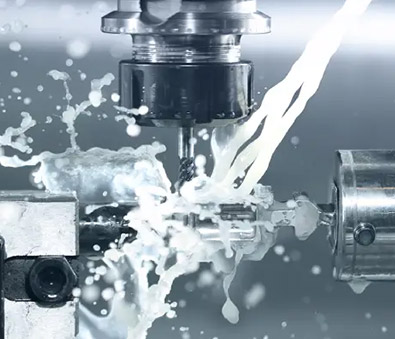
Soluble Metal Cutting Fluid Management: Strategies For Enhanced Performance
Soluble Metal Cutting Fluid Management: Strategies For Enhanced Performance In the growing Indian economy, manufacturing has over 17% contribution and is expected to increase to 25% by the end of 2025. One of the most path breaking advances in advanced Metal cutting and processing is the use of Water Miscible Cutting Fluids for grinding to heavy machining applications and from standalone tanks to centralized sumps. Extensive use of water soluble cutting oils has also led to focus on efficient monitoring and maintenance of metal cutting fluids. It is easier to develop a good product than to make it consistently perform over a long duration. Well Begun Is Half Done - Sump charging We start with correct product selection and move on to thorough sump cleaning by recommended cleaning chemicals and rinsing the system which not only disinfect the system but also help flush out the sticky residues from the system. Water parameters like total hardness, chloride hardness, conductivity and pH are to be checked before sump charging and thereafter on a weekly basis. Top-Up & Monitoring Concentration of oil can be checked daily by refractometer and by titration for centralized tanks on a weekly basis. Correct concentration ensures high part quality, optimum tool performance and emulsion stability. pH of cutting fluid emulsions must be between 8.5 to 9.5 to ensure optimum corrosion protection and bio-stability of cutting oils. pH should be checked at least twice a week by calibrated digital meter or precise pH paper strips. Top-ups should be done by adding a measured quantity of pre-mix emulsions to the tank which can be made manually or by jet mixers. Crisis Management Unfavourable conditions like pH drop, bacterial contamination or sudden WIP corrosion issue need to be tackled quickly to ensure smooth operations. Tank side additives can help to counter such issues but they must be used with caution. Like medicines, they too have side effects if used in an incorrect dosage or method. Tramp Oil Menace Tramp oil (Leaked hydraulic oil, slideway oil etc.) floats over the emulsion, cutting off the contact with air which can lead to microbial contamination of the fluid. Tramp oil content must be kept lower than 0.5% of emulsion volume which can be done by using skimmers. Centralized tanks can also be connected to online centrifuge filtration systems. Importance Of Chip Removal Metal chip/swarf accumulation in the tank weakens emulsion and initiates bacterial infection in soluble cutting oils. They can be removed by an efficient filtration system as per the material being machined and the application. Chips can be removed by vacuum suction devices to maintain sump health. X-COOL Series: Advanced Water Soluble Metal Cutting Oils for High Performance The X-COOL series features premium water-soluble oils formulated with superior additive technology to ensure effective pH control and concentration stability. Our technical team implements efficient coolant management practices, resulting in high part quality, reduced oil consumption, and extended sump life. Conclusion Effective management of water-soluble metal cutting fluids is vital for optimizing machining processes. Proper maintenance and monitoring ensure superior quality and efficiency in manufacturing operations.
October 2024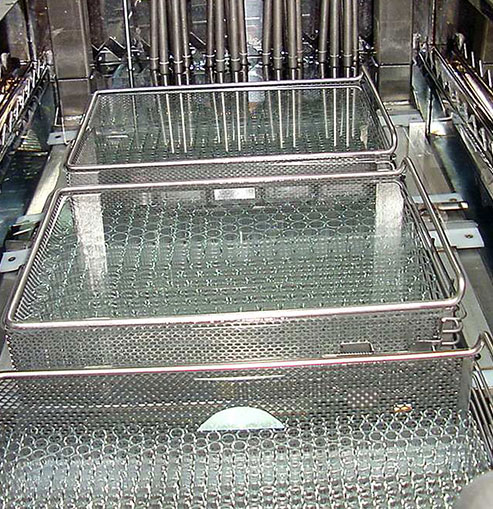
Industrial Ultrasonic Cleaners: Revolutionizing Cleaning Processes
Industrial Ultrasonic Cleaners: Revolutionizing Cleaning Processes Industrial Ultrasonic Cleaners have transformed how components and equipment are cleaned by developing necessary tools in various manufacturing and processing industries. These advanced cleaning systems are best at removing contaminants and debris from complex surfaces. This is carried out efficiently and with supreme precision by utilizing ultrasonic waves. This technology is capable of providing thorough cleaning in a non-destructive manner making it highly accepted in a large market. Industrial ultrasonic cleaners run on the basic principle of high-frequency sound wave generation that is above the range of human hearing. This follows a process known as cavitation where microscopic bubbles are formed due to the waves generated. These bubbles are utilized due to their popping ability that generates shockwaves strong enough to dislodge dirt, grease, and other contaminants from surfaces. With this method, many unreachable areas difficult to reach with traditional methods, may be cleaned thoroughly. Application of Industrial Ultrasonic Cleaners The utilization of industrial ultrasonic cleaners is spread across a mass of industries in the form of varying applications. These are known to play a crucial role in maintaining operational efficiency. 1. Manufacturing sector These cleaners are commonly used for cleaning components and degreasing equipment such as precision parts, gears, and other metal parts. 2. Electronics industry This ultrasonic cleaner industrial use has benefits to ensure that delicate circuit boards and microelectronics are cleaned thoroughly before use without causing any damage. 3. Automotive industry These are developed to clean various automotive parts. These parts span from carburettors and fuel injectors to engine components. With the automotive ultrasonic cleaner technology provided, removing contaminants like carbon deposits and oil residues has become more efficient with the help of a thorough and efficient cleaning solution. 4. Medical field These ultrasonic cleansers may be utilized for sterilizing and cleaning medical instruments and equipment. The unmatched precision and efficiency of ultrasonic cleaning make it an ideal choice for ensuring the safety and cleanliness of medical tools used in surgeries and other medical procedures. Importance of Industrial Ultrasonic Cleaners Industrial Ultrasonic Cleaners deliver high-quality cleaning results with precision and consistency. These are capable of minimizing manual labour and ensuring the least environmental impact. Traditionally, a lot of cleaning solutions utilized were highly toxic, filled with harsh chemicals, and used abrasive techniques often damaging delicate components and impacting the environment and human life. This modern version of cleaners is specialized and capable of reducing substantial dependency on chemicals by offering a more environmentally viable solution with ultrasonic cleaning chemicals. These cleaners are more efficient than the traditional versions contributing to time saving and cost balancing. This is why industries are streamlining their cleaning processes to enhance overall productivity. Due to the ultrasonic quality of cleaners, there is a no-contact policy inculcated. This ensures that delicate and complex components remain unmarried during the cleaning process and are exempted from the mechanical stress of traditional cleaners. This is beneficial to industries where precision and integrity of parts are required to be at the optimal level in the case of the aerospace and electronics arena. Advantages of Industrial Ultrasonic Cleaning There are numerous advantages of ultrasonic cleaners. This is why it is a preferred choice for various industries seeking efficient and reliable cleaning solutions. 1. The most important benefit it has relates to finding the most hard-to-reach areas to clean which was not possible initially using the traditional methods. The ultrasonic waves generate microscopic bubbles that penetrate the intricate areas such as crevices, blind holes, and other complex geometries to pop and shock the dirt into popping out. This ensures a thorough cleaning process. 2. Another important advantage is that the cleaning process through ultrasonic eliminated manual labor. This is due to new automatic methodologies that not only improves overall efficiency but also reduces the inevitable risk of human error. This ensures a consistent and reliable cleaning outcome using top-grade technology. 3. Furthermore, due to the no-contact policy of ultrasonic cleaning, it is essential to preserve the delicacy of surfaces. Traditional abrasive methods were damage prone but ultrasonic cleaning does not cause wear or damage to surfaces. This is the best solution to extend the lifespan of equipment and reduce the frequency of repairs and replacements. Choosing the Right Ultrasonic Cleaner Selecting the most appropriate industrial ultrasonic cleaner , there are numerous factors to consider to ensure maximum benefits and optimal performance is enabled. 1. Frequency and Power Based on the type of cleaning task, the power and frequency levels differ. Higher frequency is better utilized by the delicate components while lower frequency is best utilized for heavy-duty cleaning. To ensure that the right choice is made in terms of frequency and power levels, it is necessary to understand the cleaning requirements. 2. Tank Size and Capacity The size of the components to be cleaned must be proportionate to the size of the cleaner’s tank. This is because the components must be able to fit comfortably within the tank to ensure uniformity in cleaning. This is only possible when the volume and dimensions of the items and tank are studied thoroughly. 3. Material Compatibility If the cleaners do not have the right amount of compatibility with the items to be cleaned, the process of cleaning might become faulty or damage the surface. This can be done by ensuring that the items and surfaces are studied thoroughly. If there are sensitivities to certain cleaning agents, it must be taken into consideration. 4. Automation and Control Features The cleaning process may have the best overall efficiency only when the reactive advanced features contribute wholeheartedly. These features include programmable cleaning cycles, temperature control, and automation capabilities. A model with the best user-friendly controls and customization settings is capable of enhancing the flexibility and usability of the ultrasonic cleaner. 5. Maintenance and Serviceability A system is reliable for a longer time if it is easy to maintain and service. It is important to ensure that tank drainage is easier, routine maintenance is easily accessible, and the replacement parts are promptly available. Zavenir Daubert’s X-CLEAN Advance Aqueous Cleaners for Effective Ultrasonic Cleaning: In the range of Industrial Ultrasonic Cleaners, Zavenir Daubert has emerged as a frontrunner with its X-CLEAN Advance Aqueous Cleaners. These cutting-edge cleaners integrate the latest surfactant technology to elevate ultrasonic cleaning to new heights of effectiveness and efficiency. Zavenir Daubert’s X-CLEAN series stands out for its environmentally friendly composition. The cleaners are free from hazardous substances and toxic chemicals, aligning with the industry's growing emphasis on sustainable and eco-friendly practices. This contributes to a safer working environment and positions X-CLEAN as a responsible choice in the landscape of industrial cleaning solutions.
February 2024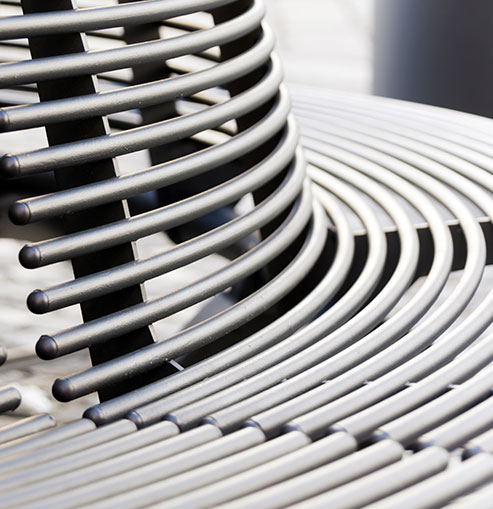
Dry to Touch Rust Preventive Oils Extend the Lifespan of Metal Components
Dry to Touch Oils Extend the Lifespan of Metal Components Metal objects are all around us, from tools to machines, and from automobiles to aeroplanes. But metals can face problems of rust, from its inception to its usage. Rust can make them weak and need to be fixed. But there's a solution called “Rust Preventive Oils." They form a temporary corrosion preventive barrier between a corrosive environment and metal. One of the important specifications that can solve the problem is Dry to touch rust preventive oils. What is Dry to Touch Oil? Metal components are at risk of corrosion and rust, which can significantly reduce their lifespan and compromise their functionality. These oils have emerged as a true leader in solving the crisis and taking up this challenge. Traditional rust preventive oils leave a wet or oily residue upon application while dry to touch oil create a protective barrier devoid of any greasy film. When you combine corrosion inhibitors and solvents, a typical solution achieved is the dry to touch rust preventive oils. These oils penetrate deep into the pores of metal surfaces, erecting a protective layer that shields against external elements such as moisture, oxygen, and other corrosive elements. These oils are innovative through their robust corrosion protection capability ensuring a dry, non-tacky finish, making them ideal for various applications across industries. How Dry to Touch Oils Extend the Lifespan of Metal Components? The metal components achieve longevity through the application of dry to touch rust preventive oils. As the name suggests, there is a feeling of dryness after application that ensures no dust and debris stick to the metal surface, thereby reducing the chances of abrasive wear. The resultant protective barrier formed is well-developed in the face of many environmental elements, preventing moisture from meeting the metal. This prevents corrosion as moisture is the prime catalyst. These oils play a pivotal role in preventing the degradation of the structure of the metal components when inhibiting corrosion. This, in the end, extends the lifespan of the metal while ensuring that the components maintain their integrity and functionality over time. What are the benefits of Dry to Touch Oils? Dry to touch oil offer numerous benefits that adds to the overall preservation and performance of metal components. 1. Their non-greasy finish makes them user-friendly, eliminating the need for additional cleaning after application. 2. This not only saves time but also reduces the consumption due to lower carryover losses. 3. Additionally, these oils provide excellent coverage and penetration, reaching even the most intricate parts of complex metal structures. 4. Their versatility allows for application on a wide range of surfaces, including ferrous and non-ferrous metals. Zavenir Daubert’s Nox-Rust® Dry to Touch Oil and its Thin Film Technology. Zavenir Daubert's Nox-Rust® Dry to Touch Oil works as a prominent corrosion protector. A uniform and seamless protective layer on metal surfaces may be realized through this thin film technology. This film adds to the aesthetic appeal via a nearly invisible coating. This is best for maximizing the efficiency of the rust preventive properties. The Nox-Rust® is an impressive combination of corrosion inhibitors’ formulation with long-term protection against rust and corrosion. Its dry feel finish is the best for industries where cleanliness and precision are paramount, including aerospace, automotive, steel, and electronics. . Our revolutionary methodology for the protection of the metal components utilized dry to touch rust preventive oils offering a superior solution to extends their lifespan and enhances their overall performance. Zavenir Daubert's Nox-Rust® Dry to Touch Oil stands as a testament to the continuous innovation in the field, providing industries with a reliable and efficient solution for their corrosion protection needs.
January 2024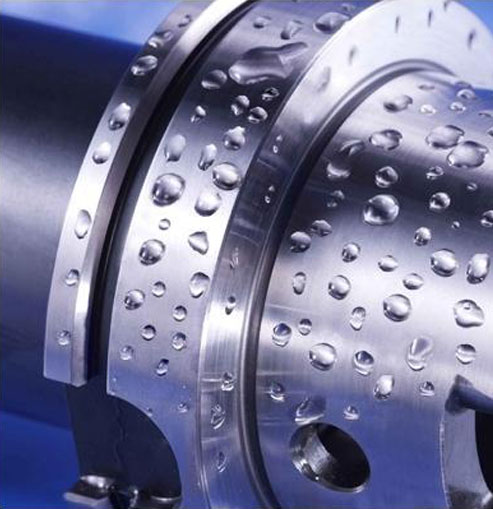
Water Based Cleaner: Introduction, Advantages and Applications
Water Based Cleaner: Introduction, Advantages and Applications Water-based cleaners are modernizing the way industries accomplish cleaning tasks. In this comprehensive guide, we will get familiar with the cleaners that exist in industrial settings. We will be exploring their introduction, the pros and cons compared to other cleaner types and their purpose in industrial settings. There are some aspects to think over when picking the right cleaner which helps to know the best practices for their use. Here we have discussed about Zavenir’s X-Clean™ Cleaners, which comprise their incomparable features and benefits. Introduction to Water-Based Cleaners As the name implies, water is the key solvent in water-based cleaners. To boost the cleaner's cleaning efficiency a mixture of emulsifiers, surfactants, and additives are used. These are biodegradable, non-toxic, and environmentally friendly cleaners and thus have the least impact on the environment. Due to their superior efficiency they are becoming reasonably popular in industrial settings. Advantages and Disadvantages of Water-Based Cleaners Compared to Other Types of Cleaners Advantages : 1. Environmentally Friendly : They emit low volatile organic compound (VOC) which makes less impact on the environment and air quality. 2. Safety : The workplace and the workers can stay safe as these cleaners are non-toxic and non-flammable. 3. Versatility : These cleaners are appropriate for metals, plastics and ceramics surfaces. 4. Cost-Effective : They are a lot more cost-effective in comparison to other solvent-based substitutes. 5. Low Odor : These cleaners exude least or no stench; this further enhances comfort in workplace. Disadvantages : 1. Drying Time : Compared to solvent-based cleaners they may have longer drying times. 2. Rust Risk : If not managed properly surplus moisture can result in rust on metal surfaces. 3. Surface Compatibility : Several materials are sensitive to water, thus the applications of these cleaners is somehow limited. 3 Applications of Cleaners in Industrial Settings 1. Precision Cleaning : To get rid of contaminants from precision parts, tools, and machinery the cleaners are exceptionally useful. 2. Degreasing : They do extremely well in degreasing applications, eradicating grease and oil from surfaces. 3. Surface Preparation : Prior to bonding, coating, or painting, these cleaners are perfect for preparing the surfaces. 4. Maintenance Cleaning : For routine cleaning of industrial equipment and facilities they are always preferred. 5 Main Factors to Consider When Choosing the Right Water-Based Cleaner : 1. Contaminant Type : What kind of contaminants (oil, grease, dirt,) you want to remove must be taken into consideration. 2. Surface Material : Compatible materials like ceramics, plastics, metals, only should be cleaned with this cleaner. 3. Environmental Impact : The cleaner must be scrutinized for qualities like biodegradability, VOC content and environmental impact. 4.Regulatory Compliance : The right kind of cleaner always complies with the industry and regulatory principles. 5. Application Method : How it is applied, either spray or immersion or ultrasonic and the equipment’s compatibility must also be taken into consideration. Best Practices for Using Cleaners in Your Operations 1. Proper Dilution : The recommendations of the manufacturer must be followed to achieve the most advantageous cleaning performance. They always suggest the perfect dilution ratios. 2. Adequate Rinsing : Surfaces must be rinsed comprehensively, after cleaning, to get rid of residues. 3. Temperature Control : To attain a steady outcome, the cleaning solution‘s temperature must be controlled and watched closely. 4. Proper Ventilation : Make sure there is sufficient ventilation when cleaners are used. This helps in drying of surfaces and controls humidity. 5. Safety Precautions : Training is to be provided on cleaners’ safe use and handling, along with protective gear. Read More : Metal Surface Cleaners for Automotive Industry Zavenir’s X-Clean™ Cleaners Features and Benefits 1. Exceptional Cleaning : Zavenir’s X-Clean™ Cleaners proposes exceptional cleaning performance, taking out tough pollutants resourcefully. 2. Environmental Responsibility : These Cleaners are biodegradable, eco-friendly, and has VOC emissions of low impact. 3. Versatility : The X-Clean™ Cleaners are resourceful and appropriate for different industrial purposes. 4. Surface Compatibility : They are harmless for use on an extensive variety of materials, like metals, plastics, and ceramics. 5. Cost-Efficiency : X-Clean™ Water-Based Cleaners are cost-effective, endowing with exceptional worth for industrial cleaning needs. Due to their eco-friendly character, safety advantages, and versatility, these cleaners are gaining popularity in industrial settings. They can be very much effective in cleaning, degreasing, and surface preparation tasks when used properly and with the right considerations. Our Water-Based Cleaners symbolizes a leading example of advanced cleaning solutions. It also offers excellent features and advantages in industrial applications. For harnessing the full potential of cleaners in your operations, it is essential to select and use it correctly. Adhering to the best practices is also important.
November 2023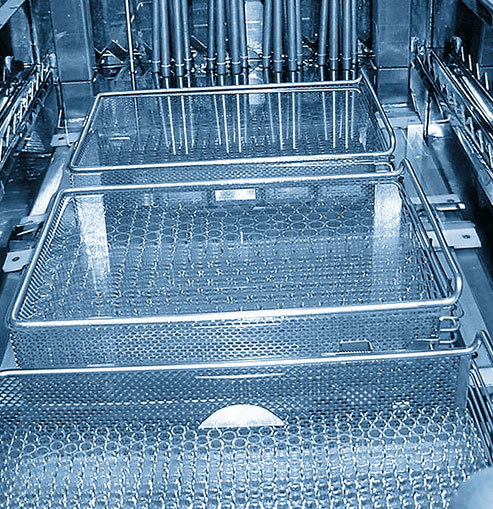
Metal Surface Cleaners for Automotive Industry
Metal Surface Cleaners for Automotive Industry Automotive components must meet high performance standards and ensure safety. To ensure the quality of these components, the use of cleaners is crucial. Therefore, it is of utmost importance to choose the appropriate automotive component cleaner. Several best practices can be applied to achieve optimal results. Metal surface cleaners are integral to manufacturing operations and play a pivotal role in improving component quality. Various types of cleaners with diverse properties are available. This comprehensive guide will help us to understand the variety of aspects related to automotive industry’s metal surface cleaners. Discussed here are the two products namely Zavenir - the X-Clean™ Aqueous Cleaner and the Dewatering Fluid Cum Solvent Cleaner. Let’s take a closer look at the attributes and advantages of these specific products. The Importance of Clean Metal Surfaces in Manufacturing Operations In the automotive industry, it is extremely crucial to keep the metal surfaces clean. This is influential in ensuring the quality, safety, and performance of the product. Equipments can break down and structural integrity can be jeopardized when metal surfaces have pollutants. To lessen maintenance expenses daily cleaning is an utmost necessity. The lifespan of machinery gets extended besides giving surety of high-quality automotive components. The overall competence and dependability of manufacturing operations is enhanced with clean metal surfaces. How Metal Surface Cleaners Can Improve Quality of Components The quality of automotive components gets enhanced with rigid tolerances and accurate machining. This happens when metal surfaces are cleanly maintained. To develop durability of component and decrease the threat of corrosion it is necessary to get rid of contaminants. Thus, optimal coating adhesion can be ensured. For the customer to be satisfied, only superior component quality can help. It is also helpful to have an enhanced overall automobile. Different Types of Metal Surface Cleaners and Their Properties There are different kinds of metal surface cleaners. It includes various eco-friendly alternatives, alkaline solutions and solvents. These cleaners have distinctive properties. To comply with the strict industry standards eco-friendly cleaners are used. They are biodegradable and environmentally responsible. For effective heavy-duty degreasing Solvent-based cleaners are used, whereas for removing oil and grease alkaline solutions are perfect. Choosing the Right Cleaner for Automotive Components To select the suitable cleaner, environmental impact, contamination levels and component material are the factors to be considered. For resourceful and successful cleaning, the most appropriate cleaner should be selected after consultation with experts and compatibility tests. Best Practices for Implementing Metal Surface Cleaners To implement metal surface cleaners in the facility in a productive way, it is necessary to have properly trained staff. During the process of cleaning, the use of protective gear as a safety measure must be followed strictly. To perform an operation in a safe and efficient approach, the cleaning equipments must go through regular maintenance. The recommendations of manufacturer also need to be obeyed. Zavenir’s X-Clean™ Aqueous Cleaner Features and Benefits Zavenir's X-Clean™ is a metal surface cleaner specifically devised for automotive applications. It provides excellent degreasing properties, efficiently taking out oils, grease, and contaminants from metal surfaces. X-Clean™ offers advanced rust prevention potential, ensuring long-lasting safety for automotive components. Environmentally friendly and biodegradable, it holds up with industry standards for sustainability. X-Clean™ boost cleaning efficiency, enhances component quality, and improves manufacturing productivity. Zavenir’s Dewatering Fluid Cum Solvent Cleaner Features and Benefits Zavenir’s Dewatering Fluid Cum Solvent Cleaner is distinctively created for the automotive industry. It is efficient in degreasing and corrosion protection and is perfect for different automotive manufacturing processes. The solvent cleaner is resourceful and well-suited for a variety of metals and types of surfaces. It contributes to a cleaner and more competent production atmosphere, endorsing high-quality automotive components. Zavenir’s Dewatering Fluid Cum Solvent Cleaner is a trustworthy solution for preserving the integrity of metal surfaces in automotive manufacturing.
October 2023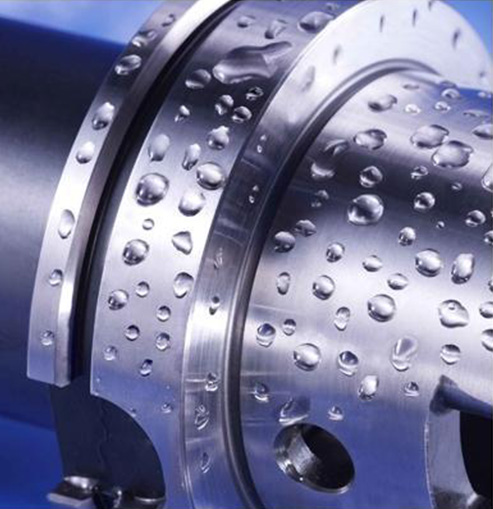
Industrial Degreaser for Manufacturing Processes
Industrial Degreaser for Manufacturing Processes In the dynamic landscape of manufacturing, precision and cleanliness are paramount. Industrial degreasers are the unsung heroes that ensure machinery and components function flawlessly. This comprehensive guide will explore the significance of cleanliness and degreasing in manufacturing operations, how industrial degreasers enhance component quality, the various types of degreasers and their properties, selecting the right degreaser for specific applications, best practices for implementation, and a closer look at Zavenir’s X-Clean™ Aqueous Industrial Degreaser, including its standout features and benefits. Promoting Cleanliness and Degreasing in Manufacturing Operations Cleanliness is not just a preference but a prerequisite in manufacturing to ensure product quality, safety, and optimal performance. Contaminants such as grease, oil, and dirt on surfaces can lead to defects, compromised structural integrity, and equipment malfunction. Regular degreasing reduces maintenance costs, extends machinery lifespan, and ensures the production of high-quality components. Clean surfaces are vital for the overall efficiency and reliability of manufacturing processes. How Industrial Degreasers Can Enhancing the Quality of Components Industrial degreasers efficiently remove grease, oil, and contaminants from surfaces, enhancing the quality of components. The removal of contaminants ensures optimal adhesion for coatings, reduces the risk of corrosion, and improves component durability. Improved component quality leads to a superior final product, increased customer satisfaction, and reduced warranty claims. Types of Industrial Degreasers and Their Properties Industrial degreasers come in various types, including solvent-based, water-based, and bio-based, each with distinct properties. 1. Solvent-based degreasers: Solvent-based degreasers excel in heavy-duty degreasing, effectively breaking down tough contaminants. 2. Water-based degreasers: Water-based degreasers are environmentally friendly and provide an eco-conscious option for cleaning. 3. Bio-based degreasers: Bio-based degreasers are biodegradable, aligning with sustainability standards, and are safe for both personnel and the environment. Selecting the Appropriate Industrial Degreaser for Your Unique Application Selecting the appropriate degreaser involves considering factors such as the type of contamination, surface material, and environmental impact. Compatibility tests and consultation with experts ensure the selection of the most suitable degreaser for efficient and effective cleaning. Zavenir’s X-Clean™ Aqueous Industrial Degreaser offers a versatile solution suitable for various applications, simplifying the selection process. Read Also: Clean your components at Low Temperature: An Overview of Low Temperature Cleaners Optimizing Industrial Degreaser Usage in Your Facility: Best Practices Proper training of personnel is essential for the successful implementation of industrial degreasers. Safety measures, including the use of protective gear, must be strictly followed during the degreasing process to protect personnel and the workplace. Regular maintenance of degreasing equipment and adherence to manufacturer recommendations are crucial for safe and efficient operations. Zavenir’s X-Clean™ Aqueous Industrial Degreaser enhances cleaning efficiency, improves component quality, and contributes to a cleaner and more efficient production environment. Zavenir’s X-Clean™ Aqueous Industrial Degreaser Features and Benefits: Zavenir's X-Clean™ Aqueous Industrial Degreaser is a high-performance solution designed for industrial applications. It boasts exceptional degreasing properties, effectively removing oils, grease, and contaminants from surfaces. The degreaser offers superior rust prevention capabilities, ensuring long-lasting protection for components. Environmentally friendly and biodegradable, it aligns with industry standards for sustainability and safety. X-Clean™ Aqueous Industrial Degreaser enhances cleaning efficiency, improves component quality, and promotes a more efficient production environment. Its versatile formulation is compatible with a wide range of materials, making it suitable for various industrial applications. The right industrial degreaser is an indispensable tool in manufacturing, ensuring the production of high-quality components and overall efficiency. Cleanliness and degreasing are not optional but imperative for product quality, safety, and longevity. Zavenir's X-Clean™ Aqueous Industrial Degreaser represents an advanced solution designed to meet the specific needs of industrial applications, offering exceptional features and benefits that contribute to the success of the industry. Proper selection, implementation, and maintenance of industrial degreasers are vital steps toward achieving the desired cleanliness and quality in manufacturing operations.
October 2023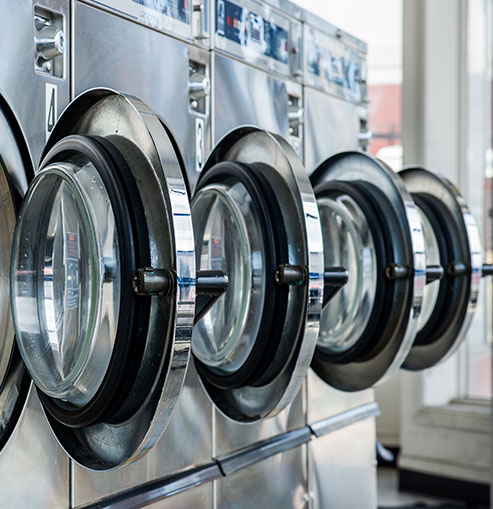
Clean your components at Low Temperature: An Overview of Low Temperature Cleaners
Clean your components at Low Temperature: An Overview of Low Temperature Cleaners Introduction to Low Temperature Cleaners : Low temperature cleaners clean effectively in lower temperatures, ideal when high heat isn't feasible. They're efficient, eco-friendly, and cost-effective for industries needing top-notch cleaning without excessive energy use. Low-temperature cleaning agents are purpose-built cleaning solutions. They are engineered to efficiently cleanse surfaces and equipment using lower temperatures compared to conventional cleaners. These cleaning agents are specially crafted to maintain their effectiveness even in typical environmental conditions. They are appropriate for tasks where conducting high-temperature cleaning is neither possible nor pragmatic. Low-temperature cleaners present a cutting-edge answer for industries demanding thorough cleaning without the necessity for excessive heat. They deliver exceptional cleaning outcomes while simultaneously diminishing energy consumption and operational expenses. How Low Temperature Cleaners works and their Benefits : Low temperature cleaners operate by harnessing distinctive formulations that empower them to perform effectively at lower temperatures. They typically spanning from room temperature to modest heating. These cleaners leverage advanced surfactants and chemical agents to disintegrate dirt, grease, and impurities, facilitating their removal from surfaces. The advantages of low temperature cleaners comprise energy conservation, diminished carbon emissions, and the capability to clean heat-sensitive materials and equipment without jeopardizing their structural integrity. Applications of Low Temperature Cleaners in Manufacturing Operations : 1. Food and Beverage Industry : Low temperature cleaners ensures adherence to hygiene standards. They are used for cleaning food processing equipment and facilities. Thus, the risk of contaminating perishable goods is prevented. 2. Electronics Manufacturing : Sensitive electronic components are cleaned with this cleaner to get rid of flux residues and impurities. Low temperature cleaner also shields such components to high temperature exposures. It preserves and protects the electronic devices from any potential damage. 3. Automotive and Aerospace Industries : To ensure optimum performance of delicate engine components and aerospace parts, the Low temperature cleaners are used. It also helps to avoid any thermal stress. 4. Medical Device Manufacturing : Medical equipment and instruments that demand a gentle yet efficient approach are cleaned using this cleaner. It maintains the sterility of equipments and instruments and guarantees the safety of patients. 5. Pharmaceutical Industry : In cleaning pharmaceutical processing equipment and facilities a crucial role is played by low temperature cleaners. With compliance to regulations, it ensures product safety, particularly for heat-sensitive drugs. 6. Textile Industry : To preserve delicate fabrics and materials from damage or shrinkage, low temperature cleaners are applied throughout the cleaning process. 7. Painting and Coating Operations : These cleaners can efficiently clean surfaces prior to painting or coating, making sure of suitable adhesion and smooth finishing. 8. Precision Manufacturing : Low temperature cleaners are employed in accurate cleaning procedures for crucial components, optics, and semiconductor parts. 9. Printing Industry : Ink residues and contaminants are successfully removed from printing equipment and machinery by low temperature cleaners. It helps in maintaining the print quality. Choosing the Right Low Temperature Cleaner for Specific Application : 1. Cleaning Task : To choose the most appropriate low temperature cleaner, the specific cleaning requirements and form of contaminants is to be recognized. A special cleaner is devised for a particular cleaning task. 2. Surface Compatibility : To prevent any damage or discoloration on the material or surface being cleaned make sure that the cleaner is harmless and capable. Before using it comprehensively, carry out compatibility tests on a little area. 3. Environmental Impact : There is always a preference for biodegradable and environmentally friendly cleaners. So, consider using eco-friendly options. Thus, it aligns with sustainability goals and environmental regulations are also fulfilled. 4. Health and Safety : Some cleaners may pose health risks due to chemicals or unsafe fumes. Therefore, to protect workers' health opt for cleaners with less toxicity and correct safety instructions. 5. Cleaning Efficiency : To estimate a cleaner’s performance carry out trials and understand the product specifications. It is also important to evaluate the cleaner's effectiveness at low temperatures. The cleaner must have the capacity to break down and get rid of contaminants successfully. 6. Residue-Free Cleaning : Select cleaners that leave behind negligible to no residue. Residue-free cleaning may be crucial in certain applications. This is to keep away from interference with ensuing processes. 7. Cost Considerations : To find out the overall cost, take into consideration factors like cleaning frequency, cleaning performance and dilution ratios. For any particular application, calculate the cost-effectiveness of the cleaner. Read Also : The Ultimate Guide to Industrial Cleaning Solutions Best Practices for Implementing Low Temperature Cleaners in Manufacturing Facility : 1. Testing and Validation : Prior to complete implementation; perform compatibility and efficiency tests. This will ensure that the performance of the cleaner is as expected at low temperatures. 2. Equipment and Storage : To maintain the effectiveness of cleaner, the storage methods and cleaning equipment must be used appropriately. The cleaners should be stored as per the guidelines of manufacturer to avoid degradation. 3. Safety Protocols : Using personal protective equipment and implementing safety protocols is necessary while handling the low temperature cleaners. Gloves and eye protection gears must be provided to employees for proper safety. 4. Application Methods: For most favourable application, the manufacturer’s recommendations need to be followed. To make sure smooth distribution of the cleaner, foaming, immersion or spraying are fitting application methods. 5. Monitoring and Quality Control: To make certain consistent cleaning results, apply quality control measures. Monitor the cleaning process regularly. For process validation, cleaning parameters and outcomes are also to be recorded. 6. Waste Disposal: For handling as well as disposing of cleaning agents, local guidelines are to be followed. Cleaning waste and residues needs to be disposed properly as per environmental regulations. 7. Employee Training : To avoid slip-ups and mishaps by employees, proper training is to be provided. Employees must use and handle low temperature cleaners in correct manner. They need to know well the potential hazards and safety protocols also. 8. Supplier Collaboration : Stay well-connected with cleaning solution suppliers to get updates regarding new products. For effective implementation of best practices and specific application challenges do consult with the suppliers. 9. Continuous Improvement : To spot out areas for improvement and enhance efficiency, analyze and evaluate the cleaning process constantly. Cleaning performance can also be enhanced by integrating feedback from employees and suppliers. Zavenir’s X-Clean™ Low Temperature Cleaner features and benefits: Zavenir's X-Clean™ Low Temperature Cleaner is a revolutionary cleaning solution that comes with a variety of noteworthy characteristics and benefits, as well as energy-saving capabilities, making it an ideal preference for industrial and commercial cleaning applications. The main aspect of X-Clean™ is its specific formulation for low-temperature cleaning. This feature makes it perfect for susceptible materials and heat-sensitive equipment, decreasing the threat of damage and lengthening the lifetime of cleaned items. One of the prime advantages of X-Clean™ is its dominant degreasing characteristics. Its alkaline composition permits it to successfully break down and get rid of tough grease, stains, and contaminants, providing outstanding cleaning performance while removing the necessity for callous chemicals and high-temperature washes. Moreover, X-Clean™ is extremely handy and well-suited with a wide variety of materials, such as metals, plastics, ceramics, and glass. This flexibility ensures its appropriateness for different cleaning tasks, making simpler the cleaning procedure in varied industrial settings. Another important benefit of X-Clean™ is its energy-saving trait. The low-temperature cleaning potential not only trims down the energy consumption through the cleaning method but also adds to lower overall operational expenses. Additionally, the cleaner's quick action and rapid rinsing properties extensively lessen cleaning time, increasing productivity, and further having a say in saving energy.
September 2023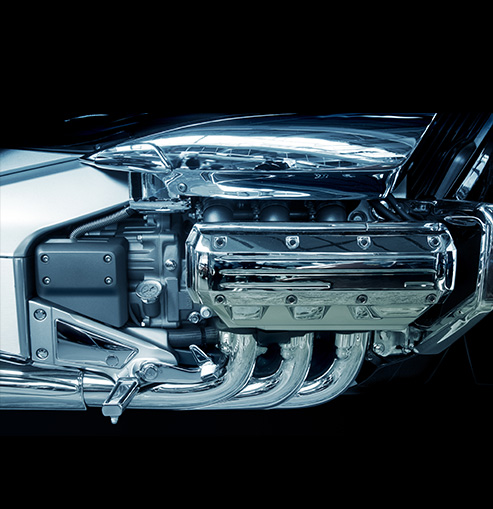
The Ultimate Guide to Industrial Cleaning Solutions
The Ultimate Guide to Industrial Cleaners Introduction to Industrial Cleaners In the manufacturing and industrial settings, the use of specific cleaning agents known as industrial cleaning solutions is dominant. These solutions are thoroughly designed to deal with some difficult tasks. They eliminate stubborn residues, contaminants, grease, and grime that accumulate on components, machinery, equipment, surfaces, and workspaces. They play an important role in cleanliness. Besides, these cleaning solutions are influential in maintaining hygiene standards. They also optimize operational efficiency within manufacturing facilities. This commitment to cleanliness guarantees seamless production procedures and steadfast adherence to strict safety regulations. Industrial cleaning solutions are devised to confront the distinctive cleaning challenges prevailing in industrial environments. They manifest in diverse forms, encompassing solvents, degreasers, detergents, acids, and environmentally friendly, biodegradable alternatives. Armed with formidable cleaning capabilities, these solutions have emerged as indispensable instruments for the attainment of immaculate and productive industrial workspaces. Types of Industrial Cleaners and their applications 1. Solvent Cleaners: Applied for eliminating oil, grease, and adhesives from metal surfaces, machinery, and parts in manufacturing, automotive, and aerospace industries. 2. Degreasers: Designed especially to liquefy and eradicate grease, oils, and hydrocarbon-based impurities from different surfaces, perfect for industrial equipment, engines, and maintenance. 3. Alkaline Cleaners: Appropriate for heavy-duty cleaning tasks, like removing immovable stains, dirt and residues from industrial equipment, floors, and processing plants. 4. Acid Cleaners: Applied for descaling, getting rid of mineral deposits, and deal with rust and oxide layers on metal surfaces in manufacturing and metal processing industries. 5. Biodegradable Cleaners: Eco-friendly substitutes, appropriate for cleaning susceptible equipment and surfaces without harming the environment, generally used in eco-conscious industries and for cleaning food processing equipment. 6. Disinfectants and Sanitizers: Designed to eradicate bacteria, viruses, and pathogens, important for upholding hygienic conditions in pharmaceutical, healthcare, and food processing industries. 7. Precision Cleaners: intended to use for particular applications such as electronics cleaning, ultrasonic cleaning, and critical parts cleaning in aerospace, semiconductor, and medical device manufacturing. Read Also : The Benefits of Using Soluble Cutting Oil in Metalworking Operations Advantages of using Industrial Cleaners in Manufacturing Operations 1. Superior Equipment Performance: Using Industrial Cleaning Chemicals daily prevents accumulation of contaminants. It leads to improved performance and durability of machinery and equipment. Clean equipment functions more capably and experiences lesser breakdowns, decreasing downtime and maintenance costs. 2. Security and Fulfilment: Clean environments lessen workplace mishaps, ensure compliance with safety standards, and build a healthier work environment for employees. Machinery and workspaces cleaned appropriately curtail slip and fall risks and possible exposure to injurious substances. 3. Quality Control: Clean surfaces and equipment avert cross-contamination and make certain product quality in manufacturing procedures. Cleaner equipment and workspaces bring about products of higher-quality and lessen the threat of defects. 4. Improved Effectiveness: Taking out residues and dirt develops energy efficiency, decrease friction, and enhance production throughput. Smoothly running machinery needs less power and resources, ensuing in cost savings. 5. Preventive Maintenance: Regular cleaning of equipment prevents corrosion, degradation, costly repairs, and extends its longevity. Preventive maintenance is more reasonable than reactive repairs and replacements. 6. Environmental Responsibility: Eco-friendly Industrial Cleaning Chemicals solutions support sustainable practices and diminish the environmental impacts of manufacturing processes. Choosing biodegradable and environmentally friendly cleaners aligns with corporate social responsibility programmes. Factors to be considered for choosing the Right Industrial Cleaning Solution 1. Cleaning Task: Recognize the exact cleaning tasks and kinds of contaminants to choose the most fitting cleaner. Different contaminants need different cleaning agents and process. 2. Surface Compatibility: Make sure that the cleaner is harmless and effectual on the material or surface being cleaned to check damage or discoloration. 3. Environmental Impact: Think about eco-friendly options to align with sustainability goals and abide by the environmental guidelines. Biodegradable and eco-friendly cleaners are favoured. 4. Health and Safety: Select products with low toxicity and suitable safety directions to safeguard workers' health. Don’t choose cleaners with unsafe vapours or chemicals that may cause health threats. 5. Concentration and Dilution: Choose for Industrial Cleaning Chemicals with the proper concentration or dilution ratios for profitable and proficient cleaning. Correct dilution makes certain the cleaner's efficiency without misuse. 6. Residue-Free Cleaning: Residue-free cleaning may be necessary in certain applications to evade meddling with consequent processes, like painting or welding. 7. Ease of Use: User-friendly products and application methods perks up cleaning effectiveness and cut human mistakes. Consider factors such as spray, dipping, ultrasonic or automatic cleaning systems for handiness. Best Practices for implementing the Industrial Cleaning Solutions in Manufacturing Operations 1. Train Employees: Provide comprehensive training to the employees for safe and professional use of industrial cleaning products, covering handling, storage, and application techniques. 2. Storage and Handling: Adhere to storage recommendations for cleaner longevity. Keep them in original containers in a cool, dry, and secure place, away from sunlight and extreme temperatures. 3. Adequate Ventilation: Guarantee that there is effective airflow in cleaning zones to lessen the hazard of inhaling fumes or aerosols. Use exhaust fans or carry out cleaning activities within spaces that have excellent natural ventilation. 4. Testing and Validation: Before using it extensively, do compatibility and efficacy tests. Validate a cleaner's performance on a small area or test piece ahead of applying it to the complete surface or equipment. 5. Safety Protocol Compliance: Ensure adherence to safety rules, including the use of personal protective gear like gloves, eye protection, and masks to avoid calamity when handling the cleaning agent. 6. Routine Maintenance: Plan and carry out regular cleaning and maintenance to prevent build-up and maintain consistent cleanliness. Tailor the cleaning schedule to equipment usage and manufacturing requirements. 7. Eco-Friendly Disposal: Follow the environmental rules when disposing of cleaning waste and remains. To prevent environmental damage, obey the local guidelines for harmless disposal of cleaning agents and wastewater. 8. Continuous Improvement: Calculate the cleaning process regularly to find out efficiency progress. Review at regular intervals and take counteractive measures to improve performance. 9. Collaborate with Suppliers: Team up with Industrial Cleaning Chemicals suppliers for product insights and best practices. Maintain open communication for expert guidance and stay updated on the latest industrial cleaning innovations. Zavenir’s X-Clean™ Alkaline Industrial Cleaner features and benefits X-Clean™ Alkaline Industrial Cleaner is an advanced and extremely useful Industrial Cleaning Chemicals solution intended to fulfil the challenging requirements of industrial settings. This dominant cleaner combines a distinctive mix of alkaline agents and specialized additives. X-Clean™ removes brilliantly tough grease, oil, manufacturing process fluids, grime, and stubborn stains from different surfaces like concrete, ceramics and metal. It is a perfect preference for heavy-duty industrial cleaning tasks because of its superior cleaning performance. It also saves time and labour costs. X-Clean™ is devised with eco-friendly components. It maintains high cleaning effectiveness and ensures minimal environmental impact. It is biodegradable and fulfils with all applicable environmental regulations, increasing sustainability plans for businesses. X-Clean™ don’t contain harsh solvents or toxic fumes therefore it is safe for workers, who are constantly exposed to it. X-Clean™ is versatile as it is appropriate for a range of industries. It is widely adapted in aerospace, automotive, defence, manufacturing, etc. It even has operational flexibility as it can be used for both manual and automated cleaning applications.
September 2023
The Benefits of Using Water Soluble Cutting Oil in Metalworking Operations
The Benefits of Using Water Soluble Cutting Oil in Metalworking Operations : In metalworking, the use of Soluble cutting oil is significantly beneficial. Besides improving surface finish, it prolongs tool life and decreases friction and heat while cutting. As the oil works as a coolant, it enhances machining precision and avoids distortion of the workpiece. To keep the cutting area clean this oil helps in the removal of chips. This is a valuable feature to minimize the downtime of machines. The Soluble cutting oil has properties of corrosion protection which lengthen the lifetime of equipments. This oil ensures a harmless working environment because it also possesses biocidal properties. Eventually, metalworking efficiency and productivity get enhanced when superior cutting speeds and feeds occur. What is Water Soluble Cutting Oil and How Does it Work ? A lubricant used in metalworking procedures is Water Soluble cutting oil. It is also referred to as cutting fluid or coolant. It contains additives, emulsifiers, and synthetic or mineral oil. To create a stable solution, the oil has to get mixed with water which is achieved by the emulsifiers. The oil shapes up into a thin film amid the workpiece and cutting tool when applied to the cutting area. During metalworking, to cut down heat, friction, and wear this film of oil works wonders. It improves cutting operations and extends tool life. The Soluble cutting oil prevents the workpieces from thermal damage. It is useful in dispersing heat from the cutting zone as it works like a coolant too. The oil is very handy in keeping clean the working zone. It increases the efficiency of machining with efficient chip removal quality. Advantages of Using Water Soluble Cutting Oil in Metalworking Processes : The application of oil during the metalworking course puts forward many advantages. To make tools last longer and achieve better cutting performance, the abrasion between the cutting tool and workpiece gets reduced. Working as a coolant, the workpiece gets protected from thermal damage and disperses heat from the cutting area. This is beneficial in getting the surface finish and dimensional precision. Prevents machine blockages and maintains a clean working location by making easy the removal of swarf and chips. Hence, machine downtime gets reduced. Extends the longevity of the machine and workpiece by providing protection against corrosion. Makes the working environment safe by warding off bacterial growth with biocidal properties. Generally, the oil use boosts metalworking effectiveness, output, and earnings. Different Types of Soluble Cutting Oils and Their Properties : For specific metalworking applications and materials, there are different varieties of soluble cutting oils available. Some cutting fluids are mineral oil-based and they offer excellent lubrication and are reasonable. However, they may have restricted biodegradability value. Another kind of cutting fluid which is a combination of synthetic additives and mineral oil is the semi-synthetic cutting oil. They have the properties of superior corrosion protection, lubrication and cooling. This cutting oil is more stable than mineral cutting oil. For high-speed machining and demanding applications, the fully synthetic cutting fluid gets used. It is chemically engineered oil that brings forth corrosion resistance properties, exceptional lubrication and proper cooling. The type of cutting oil that is gaining rapid popularity is vegetable-based cutting oil. It is derived from renewable sources and has eco-friendly qualities like low toxicity and biodegradability. The factors like machining requirements, workpiece material, environmental considerations and operator safety are the main factors that influence the selection of water soluble cutting oils. Factors to Consider When Choosing the Right Oil for Your Application : Choosing the correct soluble cutting oil is decisive for best possible metalworking performance. Think about the definite machining procedures and resources used in your procedure. Some oils are devised to do well in particular applications. Evaluate the environmental consequences and regulatory needs. A number of oils are more eco-friendly and fits well with different guidelines. Assess the lubrication and cooling properties obligatory. Fully synthetic oils go well for high-speed or heavy-duty operations, while semi-synthetic or mineral-based are beneficial for standard operations. Consider the oil's durability and constancy, and how compatible it is with your machine's filtration and recycling systems. Calculate the aspects of health and safety, like allergic reactions or probable skin irritation. Discuss with lubricant suppliers. To make sure the particular cutting oil fulfils all your criteria carry out tests. It must give out the best performance and worth for your metalworking application. Read Also : An Eco-Friendly Solution : Exploring Environmentally Friendly Cutting Oil Best Practices for Implementing Soluble Cutting Oil in Metalworking Operations : During metalworking operations, implementing oil can be a significant enhancement. To make certain that cutting oil produces the desired outcome or results, do follow these finest practices : To keep the stability and effectiveness of cutting oil, do confirm that the mix of the oil with water is accurate. Performance setbacks can get avoided by regular monitoring and maintaining fluid concentration. For lengthening the lifespan of the fluid, use enough filtration systems to get rid of contaminants. It is important to change or regenerate the cutting fluid daily so that it performs reasonably. Protecting operators from potential hazards, such as aerosols and mist produced during machining, is absolutely crucial. To keep employees safe, provide personal protective equipment and maintain good ventilation. Workers handling cutting fluid should receive proper training. They must know about storing the fluid and dispose of it safely. This would minimize wastage also. For the metalworking operations to run smoothly, equipment damage needs to be prevented. The fluid systems and machines require a routine maintenance schedule to be met. Zavenir Daubert has environmentally friendly, safe and high-performance water-soluble cutting oils X-COOL®, which cannot only increase the machining efficiency but also reduce the overall cost.
August 2023
Environmental Friendly Cutting Oil: An Eco-Friendly Solution
Environmental Friendly Cutting Oil: An Eco-Friendly Solution Environmentally Friendly Cutting Oil is a sustainable and biodegradable lubricant. It gets used during cutting, milling, drilling and grinding operations. It helps reduce friction and heat during metalworking processes. Conventional cutting oils have harmful additives which are environmentally harmful. However, Environmentally Friendly Cutting Oil minimizes environmental impact and encourages greener practices. This eco-friendly cutting oil maintains high-performance standards in the manufacturing industry. Environmentally Friendly Cutting Oil and its Importance : The Environmentally Friendly Cutting Oil is resourceful oil in metalworking for fulfilling contemporary environmental standards. This biodegradable cutting oil has lesser levels of hazardous substances. It plays a significant role in reducing the release of unsafe chemicals into the environment. This cutting oil is ideal for reducing air pollution and safeguarding water resources. It also helps to maintain a secure place of work for operators. All across the globe there are efforts taken in preserving natural ecosystems and diminish climate change. Manufacturers need to adopt such sustainable practices and make their contributions. Different Types of Environmentally Friendly Cutting Oil and Their Applications : For diverse metalworking applications, there are different varieties of Environmentally Friendly Cutting Oils. These Bio-based cutting oils are mostly obtained from vegetable oils. They are appropriate for wide-ranging machining processes as they offer exceptional biodegradability and lubrication. To diminish waste and cut down consumption of oil Minimum Quantity Lubrication (MQL) oils is very significant. MQL oils are also perfect for high-speed machining operations. To prolong tool life and enhance cooling features, Synthetic ester-based cutting oils get used. They are compatible with heavy-duty cutting processes. Both variants follow the code of eco-friendliness and guarantee higher performance. Read Also : Understanding the Importance of Industrial Cutting Oil in Metalworking Advantages of Using Environmentally Friendly Cutting Oil in Metalworking Processes : There are numerous advantages of Using Environmentally Friendly Cutting Oil. 1. Being biodegradable, it is helpful in decreasing harmful impacts on the environment, protecting aquatic life and ecosystems 2. It releases less harmful fumes that keeps the air quality in the workplace healthier and thus lessens respiratory problems among operators 3. These cutting oils cut operational costs and waste because of their high lubrication potential that provides superior surface finishes and increases the longevity of tools Metalworking industries can implement eco-friendly solutions to boost their brand image and attract environmentally aware clients. Above all, these industries can have a say towards a sustainable future for everyone. How Environmentally Friendly Cutting Oil Can Help You Meet Sustainability Goals ? The use of Environmentally Friendly Cutting Oil, a renewable and biodegradable resource, supports the objectives of sustainability. Industries will be able to decrease their carbon footprint and minimize their impact on biodiversity. This cutting oil is helpful in building an environment safe for the employees as hazardous substances get reduced in the workplace. It also brings down expenditure and generation of waste. However, it increases the life of tools considerably. The use of this cutting oil signifies taking up environmentally responsible practices. A user would exhibit an assurance of sustainability and further draw the attention of eco-friendly stakeholders as well as customers. Businesses can contribute to accomplishing a greener and more sustainable future. Best Practices for Implementing Environmentally Friendly Cutting Oil in Metalworking Operations: For the efficient implementation of Environmentally Friendly Cutting Oil, businesses ought to follow some practices : 1. Compatibility Testing : Before full-scale implementation, carry out compatibility tests with the machinery and materials present to get convinced of finest performance. 2. Proper Storage and Handling : Cutting oils must be stored in sealed containers, not under direct sunlight and intense temperatures. Workers must be aware of the procedures of safe handling 3. Regular Monitoring and Maintenance : For maintaining efficiency and lengthen oil life, oil condition should get checked, replaced or filtered. 4. Optimal Application Techniques : Use of proper tools and application techniques ensure precise and competent lubrication, curtailing surplus usage. 5. Waste Management : Build up a plan for waste management to handle used cutting oil suitably. If feasible, recycling or reusing it must get considered. 6. Training and Awareness : Employees are to be trained on the advantages and correct usage of Environmentally Friendly Cutting Oil. They must get encouraged for active participation and understand the goals of sustainability. 7. Monitoring Performance : For making constant improvements, cutting oil is to be assessed repeatedly for performance and environmental impact. 8. Collaboration with Suppliers : connect with suppliers to obtain the most sustainable and resourceful cutting oils and look at the prospective innovations in this field. To optimize the use of Environmentally Friendly Cutting Oil in metalworking operations, the guidelines discussed above must be followed. This will further minimize their ecological footprint and enhance to build an eco-friendly and environmentally conscientious manufacturing industry. Zavenir Daubert has Environmentally Friendly Metalworking Fluids such as X-HONE®, X-CUT® and X-COOL® to serve the industry without affecting the environment.
August 2023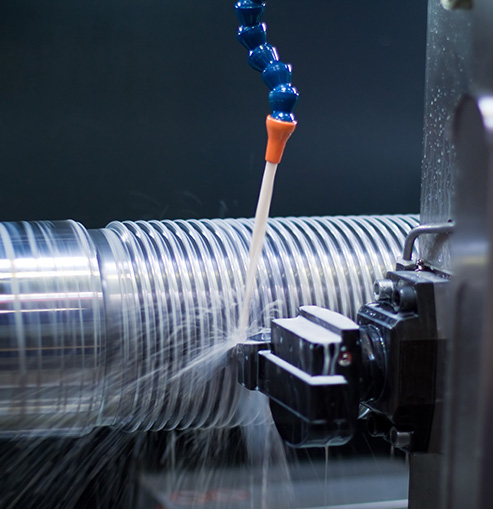
Enhancing Metalworking Efficiency with the Right Metal Cutting Fluid
Enhancing Metalworking Efficiency with the Right Metal Cutting Fluid Enhancing metalworking efficiency relies on the use of the appropriate metal cutting fluid. Metal cutting fluids, such as cutting oils or coolants, play a crucial role in lubricating, cooling, and removing chips during machining operations. By reducing friction and heat, they extend tool life, improve surface finish, minimize workpiece deformation, and increase cutting speeds. Proper selection of the cutting fluid based on factors like machining operation, workpiece material, and environmental considerations ensures optimal performance. By using the right metal cutting fluid, metalworkers can enhance efficiency, productivity, and overall machining performance in various industries. What is Metalworking? Why Metal Cutting or Machining Operations Required Metalworking refers to the process of shaping and manipulating metal materials to create various products or components. It encompasses a wide range of operations, including cutting, drilling, milling, turning, and more. Metal cutting or machining operations are required to shape metal into desired forms, remove excess material, and achieve precise dimensions. These operations are essential in industries such as automotive, aerospace, construction, and manufacturing. Metal cutting or machining operations allow for the creation of intricate designs, precise parts, and components that meet specific requirements, enabling the production of various metal-based products that serve critical functions in numerous applications. Metal Cutting Fluids: Importance, Types and Application Metal cutting fluids, also known as metalworking fluids or cutting oils or coolants, are liquids used in metalworking processes to improve efficiency and performance. They provide lubrication, cooling, and chip removal during cutting operations. Metal cutting fluids are important as they enhance tool life, surface finish, and prevent tool wear. They come in various types, including straight oils, soluble oils, semi-synthetic fluids, and synthetic fluids. The selection of the appropriate cutting fluid depends on factors such as the machining operation, workpiece material, cutting speed, and environmental considerations. Metal cutting fluids find application in industries such as automotive, aerospace, machining, and fabrication. Selection of Right Metal Cutting Fluid for Specific Machining Operation The selection of the right metal cutting fluid for a specific machining operation is a critical factor that can significantly impact the efficiency and performance of the process. Several considerations should be taken into account when choosing the appropriate cutting fluid : 1. Material being machined : Different cutting fluids are designed to work with specific materials. For example, ferrous metals may require cutting fluids with EP (extreme pressure) additives, while non-ferrous materials may benefit from straight oils or water-based fluids. Understanding the compatibility between the cutting fluid and the workpiece material is crucial. 2. Machining operation : The type of machining operation being performed is another important factor. For instance, turning, milling, drilling, and grinding operations may have different requirements in terms of lubrication, cooling, and chip evacuation. Some cutting fluids are better suited for heavy-duty operations, while others are more suitable for high-speed or precision machining. 3. Cutting speed : The cutting speed or feed rate also influences the selection of the cutting fluid. High-speed machining may require a cutting fluid with better cooling properties to control the heat generated during the process. Conversely, slower machining speeds may allow for different types of fluids that provide better lubrication. 4. Surface finish requirements : If achieving a specific surface finish is crucial, the cutting fluid's impact on the workpiece's surface quality should be considered. Some fluids can improve the surface finish, while others may leave residue or require additional cleaning processes. 5. Tool life requirements : Extending tool life is a common objective in metalworking operations. Certain cutting fluids, such as those with additives or specific formulations, can help reduce tool wear and extend tool life. Considering the expected tool life requirements and the compatibility between the fluid and the tooling is important. 6. Environmental considerations : Environmental regulations and sustainability goals may influence the choice of cutting fluid. Water-based fluids or biodegradable options might be preferred to minimize environmental impact. 7. Cost-effectiveness : Evaluating the cost-effectiveness of the cutting fluid is essential. Factors like fluid consumption rate, ease of maintenance, and overall performance should be considered to determine the long-term economic benefits. To select the right cutting fluid, it is recommended to consult with Zavenir Daubert, consider performance data, and conduct trial runs. Testing the fluid's performance in specific machining operations and evaluating its impact on tool life, surface finish, and overall efficiency can help identify the optimal cutting fluid for the specific application. Regular monitoring and maintenance of the cutting fluid, such as filtration and concentration control, should also be conducted to ensure consistent performance over time. Benefits of Using Metal Cutting Fluids in Metalworking Operations Using metal cutting fluids in metalworking operations provides several benefits. 1. Extended tool life : Metal cutting fluids provide lubrication, reducing friction and wear on cutting tools. This extends the tool life, reducing the need for frequent tool replacements and increasing cost-effectiveness. 2. Improved surface finish : Cutting fluids help dissipate heat generated during cutting, preventing workpiece overheating and improving surface finish. This results in smoother, more precise surfaces and reduces the need for additional finishing operations. 3. Chip removal : Metal cutting fluids aid in chip evacuation by lubricating and cooling the cutting zone. This prevents chips from clogging the cutting tool or interfering with the machining process, leading to improved productivity and reduced downtime. 4. Cooling and heat dissipation : Cutting fluids act as coolants, dissipating heat generated during cutting operations. By maintaining lower temperatures, they help prevent workpiece distortion and improve dimensional accuracy. 5. Enhanced productivity : The combination of lubrication, cooling, and chip removal provided by cutting fluids allows for increased cutting speeds and feeds. This leads to improved productivity and shorter machining cycle times. 6. Environmental and health benefits : Some cutting fluids are formulated to be environmentally friendly and have low health risks for operators. Using these fluids helps comply with environmental regulations and promotes a safer working environment. Metal cutting fluids contribute to improved tool life, surface finish, chip removal, cooling, productivity, and environmental safety in metalworking operations. Their application results in cost savings, higher quality products, and increased operational efficiency. Zavenir Daubert has products such as X-HONE®, X-CUT® and X-COOL® as Metal Cutting Fluids to solve a myriad of metalworking problems efficiently.
July 2023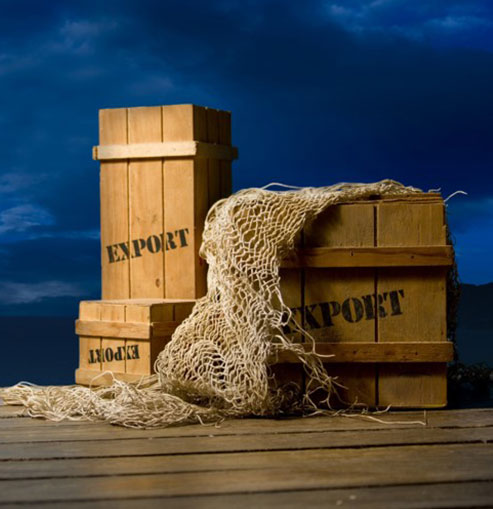
Why is Temporary Rust Protection Crucial for Shipping and Storage?
Why is Temporary Rust Protection Crucial for Shipping and Storage? Temporary rust protection is crucial for shipping and storage because it helps to prevent rust and corrosion from damaging metal components during transport and storage. Rust is a common problem for metal components, and it can cause significant damage if left untreated. Rust can weaken metal parts, affect their performance, and reduce their lifespan. This can result in costly repairs and replacements, causing delays and losses. During shipping and storage, metal components are exposed to various environmental factors, such as humidity, moisture, and temperature changes. These factors can cause rust and corrosion to form on metal surfaces, which can compromise the integrity of the components. Temporary rust protection provides a barrier between the metal and the environment, preventing rust and corrosion from forming. Temporary rust protection can be achieved using various methods such as coatings, oils, and VCI (Vapor Corrosion Inhibitor) technology. Coatings and oils are applied to the metal surfaces to create a barrier that prevents moisture and other contaminants from coming into contact with the metal. VCI technology, on the other hand, releases a protective vapor that forms a protective layer on the metal surfaces, preventing corrosion. Temporary rust protection is especially important for metal components that are being shipped or stored for extended periods. If left unprotected, these components can become corroded and damaged, leading to costly repairs or replacements. Temporary rust protection helps to ensure that metal components remain in good condition, reducing the risk of damage and minimizing costs. Application of Temporary Rust Protection : Temporary rust protection is widely used in various industries where metal components are exposed to the risk of rust and corrosion during short-term storage and transportation. Some common applications of temporary rust protection include : 1. Automotive industry : Temporary rust protection is used to protect automotive parts during transportation and storage. Components such as engines, transmissions, and chassis are typically coated with oils or VCI films to prevent corrosion. 2. Aerospace industry : The aerospace industry uses temporary rust protection to prevent corrosion on aircraft parts during manufacturing, assembly, and storage. Components such as wings, fuselage, and engine parts are often coated with specialized coatings or VCI films to prevent corrosion. 3. Military : The military uses temporary rust protection to protect weapons, ammunition, and other metal components during storage and transportation. Specialized coatings and VCI films are commonly used to prevent corrosion and ensure that these components are ready for use when needed. 4. Machinery and equipment : Temporary rust protection is used to protect metal components of machinery and equipment during storage and transportation. Components such as bearings, gears, and shafts are often coated with specialized coatings or VCI films to prevent corrosion. Temporary rust protection is an essential process that is widely used in various industries to protect metal components from rust and corrosion during short-term storage and transportation. The specific application of temporary rust protection depends on the industry and the type of metal components being protected. Read Also : How VCI Film Bag Manufacturers are Innovating to Meet Industry Demands ? Daubert NOX-RUST® Rust Preventive Oil and Daubert VCI® : Zavenir Daubert offers two main products for rust prevention : NOX-RUST® Rust Preventive Oil and Daubert VCI®. Daubert NOX-RUST® Rust Preventive Oil is a temporary rust inhibitor that is designed to protect metal parts during shipping and storage. The product is a light oil that is applied to metal surfaces and provides a protective coating that prevents rust and corrosion from forming. The oil is designed to be easily removed using solvents or alkaline cleaners before the metal parts are put into service. Daubert VCI® (Vapor Corrosion Inhibitor) is a corrosion inhibitor that works by releasing a protective vapor that forms a protective layer on metal surfaces. The vapor is designed to protect metal surfaces from corrosion during shipping and storage. Daubert VCI® is available in various forms, including films, papers, and liquids. The product is ideal for protecting metal components that are difficult to reach or are located in hard-to-access areas. Both products are designed to be environmentally friendly and are easy to apply. They are used in various industries, including automotive, aerospace, and military, to protect metal components from rust and corrosion during storage and transportation.
June 2023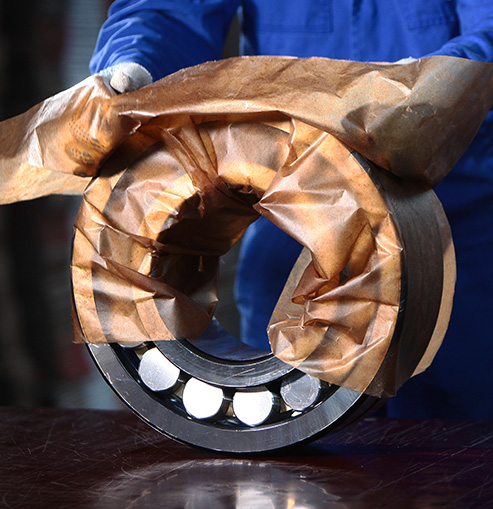
How VCI Film Bag Manufacturers are Innovating to Meet Industry Demands?
How VCI Film Bag Manufacturers are Innovating to Meet Industry Demands ? VCI (Vapor Corrosion Inhibitor) film is a specialized type of plastic film that has been infused with corrosion inhibitors. When used in an enclosed space with metal components, the film releases vapor that forms a protective layer on the metal surface, preventing corrosion. These films are commonly used in various industries such as automotive, military, and aerospace for the protection of metal parts during storage and transportation. VCI bags are a variation of VCI film that are commonly used to pack and protect metal components during shipping and storage. These bags come in various types such as flat bags, gusseted bags, and zipper bags. They are known for their effectiveness in preventing corrosion and are widely used in the automotive, industrial, and manufacturing sectors. VCI film bag manufacturers are constantly innovating to improve the quality and sustainability of their products, meeting the demands of different industries and addressing environmental concerns. Types of VCI Film Bags : VCI (Vapor Corrosion Inhibitor) film bags come in various types to suit different applications. Here are some of the common types of bags : 1. 2D or Flat bags : Simple rectangular bags without any gussets or folds. 2. 3D bags : 3 dimensional bags with 4 walls, bottom and top cover called 3D bag with lid. If top is closed by the extended 4 walls it is called 3D bag without lid. 3. Gusseted bags : Have added side folds to increase their capacity. 4. Zipper bags : Have a built-in zipper for easy opening and closing. 5. Bubble bags : Have an additional layer of air bubbles for cushioning purposes. 6. Shrink bags : Are heat-sealed and then shrunk using a heat gun or oven, providing a tight, protective fit around the metal component. Read Also : How VCI Stretch Wrap Works to Protect Your Products from Corrosion ? Manufacturers Innovating to Meet Industry Demands : As the demand for VCI bags increases, industries are constantly innovating to improve the quality and sustainability of their products to meet industry demands. Here are some ways VCI film bag manufacturers are innovating : 1 Advanced VCI Formulas : VCI bag manufacturers are developing advanced VCI formulas that provide better protection against corrosion. These new formulas are designed to be more effective and longer-lasting, ensuring that the metal parts are well-protected during storage and transportation. 2 Eco-Friendly Materials : To address concerns about environmental sustainability, manufacturers are developing eco-friendly films that are biodegradable and recyclable. These films are made using renewable materials that reduce the carbon footprint and minimize waste. 3 Custom Sizing Options : Companies are offering custom sizing options for bags to meet the specific needs of different industries. Custom sizing ensures that the bags fit the metal components snugly, providing maximum protection against corrosion. 4 Enhanced Sealing Technology : To prevent the entry of moisture and other contaminants, VCI film bag manufacturers are developing enhanced sealing technology. These new sealing technologies provide stronger seals and improved tear resistance, ensuring that the bags remain intact during storage and transportation. 5 Specialty Bags : Some companies are developing specialty bags for specific industries, such as Anti-static VCI film for electronic items. 6 Advanced Testing : Companies are investing in advanced testing equipment to ensure that their VCI film bags meet industry standards. These tests include salt spray testing, humidity testing, and other specialized tests to ensure that the bags provide reliable protection against corrosion. Zavenir Daubert VCI Film Bags Manufacturer : Zavenir Daubert is a leading manufacturer of VCI (Vapor Corrosion Inhibitor) film bags and other protective packaging products. Daubert VCI® Film Bags are designed to provide superior protection against corrosion for metal parts during storage and transportation. The Daubert VCI® Film Bags are made using advanced VCI technology that releases an invisible layer of corrosion inhibitors to protect metal parts from rust and other forms of corrosion. The bags are available in various types, including flat, gusseted, zipper, and shrink bags, to suit different applications. Daubert VCI® Film Bags also come in a range of sizes to fit different metal components, and they can be customized to meet specific industry needs. The bags have excellent tear and puncture resistance, ensuring that the metal parts remain well-protected during storage and transportation. Overall, Daubert VCI® Film Bags are a reliable and effective solution for protecting metal parts against corrosion. With their advanced VCI technology, eco-friendly formula, and custom sizing options, they are an ideal choice for various industries, including automotive, military, aerospace, and more.
June 2023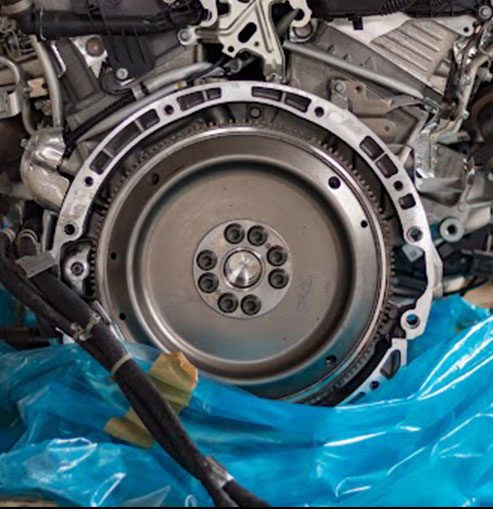
How VCI Stretch Wrap Works to Protect Your Products from Corrosion?
How VCI Stretch Wrap Works to Protect Your Products from Corrosion ? VCI (Volatile Corrosion Inhibitor) stretch wrap or films are a type of packaging material that is used to protect metal parts and equipment from rust and corrosion during storage and transportation. These films contain special additives that release vapors to form a protective layer on the metal surface, preventing rust and corrosion from forming. The stretch wrap or films are easy to apply and remove, and are an effective solution for protecting metal parts from rust and corrosion in a variety of industrial and commercial applications. The VCI stretch wrap works by emitting a vapour that contains corrosion inhibitors. The vapour is attracted to the metal surface, where it forms a protective layer. The protective layer acts as a barrier, preventing moisture and air from coming into contact with the metal surface. Moisture and air are the primary causes of rust and corrosion, so by preventing them from coming into contact with the metal surface, the VCI stretch wrap effectively prevents rust and corrosion. The VCI stretch wrap is designed to be used in direct contact with the metal surface. This ensures that the vapours and additives are released in close proximity to the metal, providing the maximum level of protection. The wrap should be wrapped tightly around the metal product, ensuring that no air or moisture can come into contact with the metal surface. Application of VCI Stretch Films : The application of VCI stretch films is straightforward and easy. First, the metal part or equipment is cleaned and dried thoroughly. Then, the VCI stretch film is wrapped around the metal part, ensuring that it covers the entire surface area. The film is stretched tightly to ensure that it adheres closely to the metal surface, and any excess film is trimmed off. VCI stretch films are available in a range of sizes and thicknesses, making them suitable for a wide variety of metal parts and equipment. They can be used to protect everything from small components to large machinery. One of the main advantages of VCI stretch films is their versatility. They can be used in a wide range of applications, including automotive, electronics, aerospace, and marine industries. They are also commonly used in the packaging and shipping of metal parts and equipment. Another advantage of VCI stretch films is their ease of use. Unlike traditional methods of rust prevention, such as oiling or greasing, VCI stretch films are clean and easy to apply. They also do not leave any residue on the metal surface, which can save time and effort when cleaning and preparing the metal part for use. Usage of VCI Stretch Films in industry : Automotive Industry : Automotive parts such as engines, transmissions, and brakes are susceptible to rust and corrosion if not properly protected. VCI stretch films provide a reliable and cost-effective solution to prevent rust and corrosion from forming on these critical components during storage and transportation. Electronics Industry : Electronics components such as circuit boards and other metal parts can also be affected by rust and corrosion, which can damage the functionality of the electronics. VCI stretch films are a great solution for protecting these components during storage and transportation, ensuring that they remain in excellent condition until they are ready to be used. Aerospace Industry : The complex machinery and metal parts used in aircraft require extensive protection to ensure they remain in perfect working condition. VCI stretch films are a reliable and cost-effective way to protect these critical components from rust and corrosion during storage and transportation. Marine and Offshore Industries : Saltwater and other harsh environmental conditions can cause metal components and machinery to rust and corrode quickly. VCI stretch films provide a reliable and effective solution for preventing rust and corrosion from forming on these components, ensuring that they remain in top working condition even in the harshest environments. Read Also : Maximizing the Effectiveness of Rust Inhibitor Oil : Tips and Tricks Zavenir Daubert’s PMG VCI Stretch Films : Zavenir Daubert's PMG VCI stretch films are a premium quality packaging material that provides excellent protection against rust and corrosion. These films are made with advanced VCI technology that releases vapors, forming a protective layer on the metal surface, preventing rust and corrosion from forming. The PMG VCI stretch films are specially designed to provide superior protection to metal parts and equipment during storage and transportation. They are available in a range of sizes and thicknesses to suit a wide variety of metal parts and equipment. One of the main advantages of PMG VCI stretch films is their versatility. They can be used in a wide range of applications, including automotive, electronics, aerospace, and marine industries. They are also commonly used in the packaging and shipping of metal parts and equipment. In addition, PMG VCI stretch films are easy to use and environmentally friendly. They do not contain any hazardous chemicals and are easy to dispose of after use. They also do not have any adverse effects on the metal parts or equipment being protected. Overall, Zavenir Daubert's PMG VCI stretch films are a reliable and effective solution for protecting metal parts and equipment from rust and corrosion. Their advanced VCI technology and superior quality make them a popular choice in the industrial and commercial sectors.
May 2023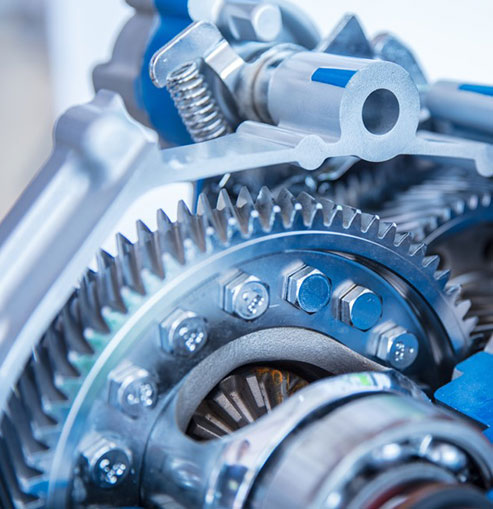
Effective Rust Inhibitor Oil with Tips and Tricks
Effective Rust Inhibitor Oil with Tips and Tricks Rust inhibitor oil is a type of oil that is specifically formulated to prevent rust from forming on metal surfaces. It is a popular choice for use in industrial settings where metal parts and equipment are exposed to harsh conditions that can accelerate corrosion. It is also used in automotive applications to protect engines and other metal components from rust and corrosion. This typically contains additives that form a protective barrier on the metal surface, preventing water and oxygen from coming into contact with the metal and causing rust to form. This oil is easy to apply and can be used on a wide range of metal surfaces, making it a versatile and cost-effective solution for rust prevention. Basis of Effectiveness of Rust Inhibitor Oil : The effectiveness of rust inhibitor oil is based on several key factors, including the type of metal being protected, the environment in which it is used, and the specific formula of the oil. The type of metal being protected is an important factor in determining the effectiveness of oil. Different metals have varying degrees of susceptibility to corrosion, and some require specific types for optimal protection. For example, aluminium and brass are highly susceptible to corrosion, and require specialized formulations to provide adequate protection. The environment in which the metal is used is also a crucial factor in determining the effectiveness of rust inhibitor oil. For example, if the metal is exposed to high levels of moisture or salt, it will require a more robust solution to provide adequate protection. In addition, the temperature and pH of the environment can affect the performance of oil. The specific formula also a critical factor in determining its effectiveness. This oil typically contains a variety of additives designed to form a protective barrier on the metal surface, preventing water and oxygen from coming into contact with the metal and causing rust to form. The quality and concentration of these additives can vary widely between different formulations, which can affect their effectiveness. How to Maximise the effectiveness of Rust Inhibitor Oil ? To maximize the effectiveness of oil, there are several key steps that users can take, including proper preparation of the metal surface, selecting the right type and applying it correctly. Choose the right rust inhibitor oil for your application : There are many different types of oils available, each with its own unique composition and application method. It is important to choose the right type for your specific application to ensure that it is as effective as possible. Consider factors such as the type of metal being protected, the environment in which it will be used, and the expected level of exposure to moisture and other corrosive agents. Prepare the surface properly : The surface should be free of dirt, oil, and any existing rust or corrosion before applying the oil. This can be achieved through a thorough cleaning process that may involve wire brushing, sandblasting, or chemical cleaning. Once the surface is clean and dry, it is ready for the application. Apply the oil evenly and thoroughly : When applying oil, it is important to apply it evenly and thoroughly to ensure that the entire surface of the metal is covered. This can be done using a brush, spray, or immersion method, depending on the type being used and the size of the metal surface being protected. Use the right amount : Using the right amount is important to ensure maximum effectiveness. Applying too little may not provide adequate protection while applying too much can be wasteful and may not improve the level of protection provided. Reapply as necessary : Over time this may begin to break down or wear off, reducing its effectiveness in protecting against rust and corrosion. To ensure maximum protection, it is important to reapply rust inhibitor oil as necessary, based on the manufacturer's recommendations. This may involve periodic inspections to assess the condition of the metal surface and determine if additional oil is needed. Monitor the effectiveness : Regular monitoring of the effectiveness of this can help identify any issues or areas where additional protection may be needed. This may involve regular inspections of the metal surface to look for signs of rust or corrosion, as well as periodic testing of the oil itself to ensure that it is still providing adequate protection. Store rust inhibitor oil properly : To maintain its effectiveness, it should be stored properly when not in use. This may involve storing it in a cool, dry place, away from direct sunlight and other sources of heat and humidity. It is also important to ensure that the container is properly sealed to prevent contamination and maintain the quality of the oil. Read Also : What is VCI Foam and How Does it Work for Corrosion Prevention ? Zavenir Daubert’s NOX-RUST® Rust Inhibitor Oil : NOX-RUST® Rust Inhibitor Oil is a high-performance oil that is designed to provide long-lasting protection against rust and corrosion on metal surfaces. It is a versatile and effective product that can be used in a wide range of industrial and commercial applications, including in the automotive, aerospace, and marine industries. One of the key features of NOX-RUST® is its advanced formula, which contains a blend of rust inhibitors, corrosion inhibitors, and anti-oxidants. These additives work together to form a polar protective barrier on the surface of the metal, preventing moisture and other corrosive agents from penetrating the surface and causing damage. Another important feature of NOX-RUST® Rust Inhibitor Oil is its ease of use. It can be applied using a variety of methods, including spray, brush, or immersion, and can be easily incorporated into existing maintenance routines to help prolong the life of metal parts and equipment.
May 2023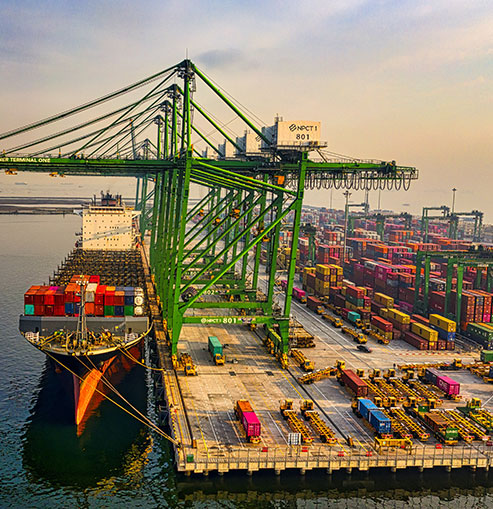
What is VCI Seaworthy Packaging and How Does it Work?
What is VCI Seaworthy Packaging and How Does it Work? VCI Seaworthy Packaging is an advanced form of packaging designed to protect metal products during transportation across the sea. The term VCI stands for Volatile Corrosion Inhibitor. It is a type of packaging material that contains chemicals that prevent corrosion of metal products during shipment. The chemicals used in VCI Seaworthy Packaging are designed to evaporate and form a protective layer around the metal products, which effectively prevents rust formation. What is VCI Seaworthy Packaging? VCI seaworthy packaging is a method of packaging goods that involves the use of VCI materials to prevent corrosion during transportation. The term "seaworthy" refers to the fact that this type of packaging is designed to withstand the harsh conditions that goods may be subjected to during sea transportation, such as saltwater exposure and humidity. VCI materials work by releasing molecules that form a protective layer around the metal surfaces of the goods being packaged. This layer helps to prevent moisture and oxygen from coming into contact with the metal, which in turn helps prevent rust and other forms of corrosion. Read Also : The Science Behind Corrosion Prevention of Metals: Understanding the Process Role of Rust Preventive Oil in VCI Seaworthy Packaging: Rust preventive oil is an important component of VCI seaworthy packaging. It is used to provide an additional layer of protection to the metal surfaces of the goods being packaged. Rust preventive oil is typically applied to the metal surfaces before the VCI materials are added. The oil helps to displace any moisture that may be present on the metal surfaces, which can help prevent rust from forming. In addition, the oil provides a barrier that helps to prevent moisture and oxygen from coming into contact with the metal, which further helps prevent corrosion. How Does VCI Seaworthy Packaging Work and What are its Benefits? VCI Seaworthy Packaging works by using chemicals that are designed to evaporate and form a protective layer around the metal products. The chemicals used in VCI Seaworthy Packaging are specifically designed to prevent rust formation. They do this by creating a barrier around the metal surface that prevents moisture and oxygen from coming into contact with the metal. The VCI chemicals used in VCI Seaworthy Packaging are typically incorporated into the packaging material itself. This means that the chemicals are released gradually over time, which provides ongoing protection to the metal products during shipment. The benefits of VCI Seaworthy Packaging are numerous. For one, it provides excellent protection against rust formation. This is particularly important when shipping metal products across the sea, where they are exposed to high levels of moisture and condensation due to temperature fluctuations. Rust formation can weaken metal products and compromise their structural integrity, which can result in costly damage and even safety hazards. In addition to preventing rust formation, VCI Seaworthy Packaging also helps to extend the lifespan of metal products. This is because it prevents corrosion from occurring, which can significantly reduce the lifespan of metal products. By using VCI Seaworthy Packaging, companies can ensure that their metal products arrive at their destination in good condition, which can help to increase customer satisfaction and loyalty. Read Also : What is VCI Foam and How Does it Work for Corrosion Prevention? Zavenir Daubert VCI Seaworthy Packaging Solutions: Zavenir Daubert is a leading provider of VCI Seaworthy Packaging solutions, offer a wide range of products that are specifically designed to protect metal products during shipment across the sea. Some of the products and services offered by Zavenir Daubert include VCI films, VCI papers, VCI bags, and VCI liquids. These products are designed to provide a high level of protection against corrosion, while also being easy to use and cost-effective. Zavenir Daubert also offers a range of VCI Seaworthy Packaging solutions for specific industries, such as the automotive, aerospace, and military industries. These solutions are designed to meet the unique needs of each industry and provide maximum protection to metal products during shipment. In conclusion, VCI seaworthy packaging is an effective method of packaging goods for shipping that helps protect against rust and other forms of corrosion. By using VCI materials to create a protective layer around the metal surfaces of the goods being packaged, VCI packaging can help extend the lifespan of the goods, reduce the risk of damage during transportation, and reduce the cost of shipping. Rust preventive oil plays an important role in VCI seaworthy packaging, as it provides an additional layer of protection to the metal surfaces. Zavenir Daubert offer a range of VCI seaworthy packaging solutions, including customized options, to help shippers protect their goods during transportation. Overall, VCI seaworthy packaging is an important consideration for companies that export goods and want to ensure that their products arrive at their destination in good condition.
April 2023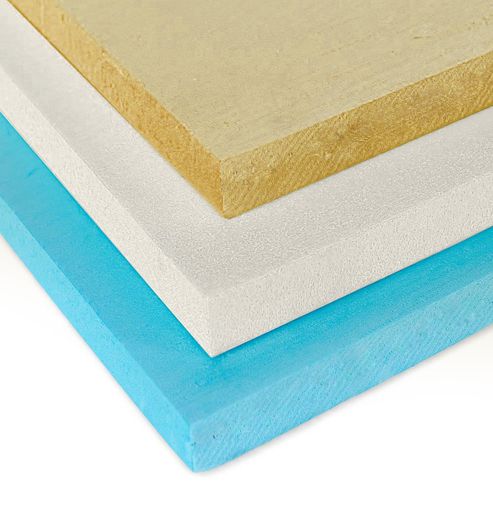
What is VCI Foam and How Does it Work for Corrosion Prevention?
What is VCI Foam and How Does it Work for Corrosion Prevention? VCI Foam is an innovative and effective solution for preventing corrosion in various industries. Corrosion is a serious issue that affects a wide range of products, components, and equipment, resulting in expensive repairs, downtime, and safety hazards. VCI Foam is a type of foam that releases Volatile Corrosion Inhibitors (VCIs) to create a protective layer around the metal surface, preventing corrosion and extending the lifespan of the product. In this article, we will explore the usage, application, and benefits of VCI Foam for corrosion prevention. What is VCI Foam? VCI foam is a specially designed foam that contains vapor corrosion inhibitors. These inhibitors are chemical compounds that have the ability to neutralize the corrosive gases and moisture that can cause corrosion on metals. The foam is designed to be easy to use and can be easily cut and shaped to fit around any metal object that needs to be protected from corrosion. What is the usage or application of VCI Foam? VCI foam is commonly used in a variety of industries, including automotive, aerospace, military, electronics, and industrial manufacturing. It is used to protect metal parts, equipment, and machinery during storage, shipping, and handling. VCI foam can be used for both short-term and long-term storage, making it an ideal solution for protecting metal components during transportation or when they are not in use. VCI foam can be used as a standalone solution or in combination with other corrosion protection methods, such as VCI films or rust preventive oils. VCI foam can be used to protect a wide range of metal surfaces, including ferrous and non-ferrous metals, and it does not leave any residue or marks on the metal surface after use. Some of the common applications of VCI Foam are: Protection of metal components during shipping and storage: VCI Foam is an excellent solution for protecting metal components during transit and storage. The foam can be cut into custom shapes to fit the product, providing a snug fit and maximum protection against corrosion. Corrosion prevention of electrical and electronic equipment: VCI Foam is also used to protect electrical and electronic equipment, such as circuit boards, from corrosion. The foam can be placed inside the equipment or used as a packaging material to prevent moisture and humidity from damaging the sensitive components. Preservation of military equipment: VCI Foam is widely used by the military to preserve their equipment during long-term storage. The foam provides a protective layer around the metal surface, preventing corrosion and ensuring that the equipment is ready for use when needed. Read Also : How Rust Inhibitor Oil Works to Prevent Corrosion of Metal Surfaces? How Does VCI Foam Works for Corrosion Prevention? VCI Foam works by releasing Volatile Corrosion Inhibitors (VCIs) that form a protective layer around the metal surface. When the foam comes into contact with the metal, the VCIs vaporize and migrate to the surface, forming a thin layer of protection. The VCIs work by adsorbing onto the metal surface, creating a barrier that prevents moisture, oxygen, and other corrosive elements from reaching the metal surface. VCI Foam is an effective solution for corrosion prevention because it provides continuous protection to the metal surface. Unlike traditional coatings, which can wear off or become damaged over time, VCI Foam releases VCIs as long as it is in contact with the metal surface. This means that even if the foam is damaged, the metal surface will still be protected by the VCIs that have been adsorbed onto it. Zavenir Daubert VCI Foam - Key Features and Benefits: Zavenir Daubert VCI foam is a high-quality VCI foam that provides superior protection against corrosion. Here are some key features and benefits of Zavenir Daubert VCI foam: Multi-metal protection: Zavenir Daubert VCI foam can be used to protect a wide range of metal surfaces, including ferrous and non-ferrous metals. It is effective against all types of corrosion, including rust, tarnish, and staining. Long-term protection: Zavenir Daubert VCI foam provides long-term protection against corrosion, making it an ideal solution for metal components that need corrosion protection. Easy to use: Zavenir Daubert VCI foam is easy to use and can be easily cut and shaped to fit around any metal object that needs to be protected. It can be used as a standalone solution or in combination with other corrosion protection methods, such as VCI films or rust preventive oils. Non-toxic: The VCI compounds used in Zavenir Daubert VCI foam are non-toxic and do not pose any health risks to users. This makes it a safe and environmentally friendly option for corrosion prevention. Cost-effective: Zavenir Daubert VCI foam is a cost-effective solution for corrosion prevention. It helps to extend the lifespan of metal components, reducing the need for costly repairs and replacements. Versatile: Zavenir Daubert VCI foam can be used in a variety of industries, including automotive, aerospace, military, electronics, and industrial manufacturing. It is suitable for both short-term and long-term storage, making it an ideal solution for protecting metal components during transportation or when they are not in use. Non-abrasive: Zavenir Daubert VCI foam is non-abrasive and does not damage the metal surface in any way. It does not leave any residue or marks on the metal surface after use, making it a clean and convenient option for corrosion prevention. Read Also : The Science Behind Corrosion Prevention of Metals: Understanding the Process Leading VCI Foam Manufacturer Zavenir Daubert is a leading VCI foam manufacturer that specializes in providing high-quality VCI Foam solutions for corrosion prevention and protection. Zavenir Daubert has been in the business of manufacturing VCI foam for years and has a proven track record of delivering innovative and effective solutions to its customers. Our VCI foam is a high-quality product that offers a range of key features and benefits, including multi-metal protection, long-term protection, ease of use, non-toxicity, cost-effectiveness, versatility, and non-abrasiveness. By using VCI foam such as Zavenir Daubert VCI foam, industries can significantly reduce the risk of corrosion-related damage and extend the lifespan of their valuable equipment and infrastructure.
April 2023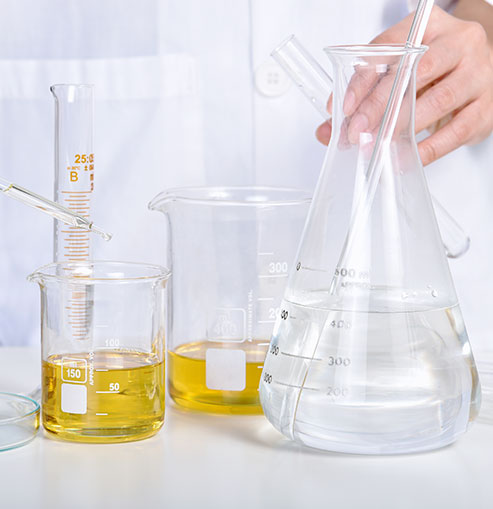
The Science Behind Corrosion Prevention of Metals: Understanding the Process
The Science Behind Corrosion Prevention of Metals: Understanding the Process Corrosion is the gradual destruction of metal surfaces due to chemical reactions. It is a natural process that occurs when metals react with their environment. Metal corrosion is a significant issue in many industries, leading to equipment failure, production downtime, and maintenance costs. Therefore, it is crucial to understand the science behind corrosion prevention of metals to reduce the impact of this problem. What is Corrosion? Corrosion is a process that occurs when metal is exposed to an environment that contains water, oxygen, and other chemicals. It is an electrochemical reaction that happens on the surface of the metal. The corrosion process involves anodic and cathodic reactions. Anodic reactions involve the metal atoms losing electrons, which creates metal ions, and cathodic reactions occur when electrons combine with hydrogen ions in the environment, which creates hydrogen gas. In other words, corrosion involves a flow of electrons from the anode to the cathode, which creates a current flow. The anode is the metal surface that is corroding, and the cathode is the environment that it is exposed to. The process results in the formation of metal oxide, which is a compound that covers the metal surface and causes it to weaken and degrade over time. Read Also : How Rust Inhibitor Oil Works to Prevent Corrosion of Metal Surfaces? Understanding the Corrosion Prevention of Metals There are different ways to prevent corrosion, but it starts with understanding the process. Corrosion prevention involves identifying the environmental factors that lead to corrosion, and then taking steps to limit their impact. Here are some common methods of corrosion prevention: Coatings: One of the most effective ways to prevent corrosion is by applying a protective coating to the metal surface. Coatings can be made from different materials such as rust preventive oil, wax, paint, plastics, or metals. They act as a barrier that separates the metal from the environment and limits the exposure of the metal surface to the corrosive substances. Inhibitors: Inhibitors are chemicals that are added to the environment in which the metal is placed to reduce the rate of corrosion. Inhibitors work by forming a protective layer on the metal surface, preventing the metal from reacting with the environment. Inhibitors can be added to the metal surface or to the environment surrounding the metal. Cathodic protection: This is a technique that involves the use of a sacrificial anode, which is a metal that is more reactive than the metal that needs protection. The sacrificial anode corrodes first, which means that it takes the place of the metal that needs protection. Cathodic protection is commonly used in the maritime industry to protect metal structures such as ships and offshore platforms. Alloy selection: Another method of corrosion prevention is to select metals that are resistant to corrosion. This involves identifying the type of corrosion that is most likely to occur in the environment and selecting metals that are resistant to it. For example, stainless steel is a popular material for food processing equipment because it is resistant to corrosion in acidic environments. Proper maintenance: Regular inspection and maintenance of metal surfaces can prevent corrosion by identifying and fixing potential issues before they become significant problems. This can include cleaning the metal surface to remove any corrosive substances and applying a protective coating. Read Also : Choosing the Right VCI Film Manufacturer: What to Look For? Corrosion prevention by Nox-Rust® Rust Preventive Oil, Wax and Daubert VCI® Nox-Rust® Rust Preventive Oils & Wax and Daubert VCI® are effective corrosion prevention methods that protect metal surfaces from the harmful effects of corrosion. Nox-Rust® Rust Preventive Oils & Wax are specially formulated to provide long-term protection against corrosion. It is based on CCI (Contact Corrosion Inhibition) technology. The oils penetrate the metal surface, displacing moisture and forming a protective barrier that prevents moisture and other corrosive agents from reaching the metal surface. These oils are ideal for use in various applications, including metal storage, shipping, and outdoor equipment. Daubert VCI® is another effective method for preventing corrosion. It uses volatile corrosion inhibitors (VCIs) to protect metal surfaces. These inhibitors form a protective layer on the metal surface, preventing the metal from coming into contact with moisture and other corrosive substances. Daubert VCI® is available in various forms, including papers, films, and bags, and is ideal for use in various applications, including metal storage, shipping, and manufacturing. Nox-Rust® Rust Preventive Oils & Wax and Daubert VCI® are both effective methods for preventing corrosion, and they can be used in combination for even greater protection. These methods are widely used in the automotive, aerospace, and manufacturing industries to prevent corrosion and extend the life of metal components. They are essential for the longevity and durability of metal parts and help prevent costly repairs and replacements.
March 2023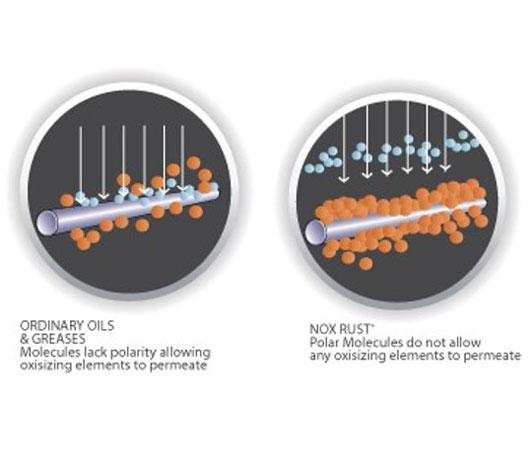
How Rust Inhibitor Oil Works to Prevent Corrosion of Metal Surfaces?
How Rust Inhibitor Oil Works to Prevent Corrosion of Metal Surfaces? Rust inhibitor oils, also known as corrosion inhibitor oils, are used to prevent corrosion and rust on metal surfaces. These oils form a protective film on the surface of the metal, which acts as a barrier to prevent moisture and other corrosive elements from reaching the metal surface. Rust inhibitor oils work by penetrating the surface of the metal, displacing moisture, and forming a barrier that prevents the metal from rusting or corroding. Types of rust inhibitor oils and its working Contact inhibitors work by forming a protective film on the surface of the metal. These films can be made from various materials, including waxes, oils, and other types of coatings. The film formed by contact inhibitors prevents moisture and other corrosive substances from coming into contact with the metal surface, thereby preventing rust and corrosion. Vapor-phase inhibitors work by releasing vapours that form a protective film on the metal surface. These inhibitors are useful for protecting metal surfaces that are difficult to access, such as the interior surfaces of pipelines, machinery, and equipment. Vapor-phase inhibitors are also effective for protecting metal components during storage and shipping. Application of Rust Inhibitor Oil Rust inhibitor oils are applied by spraying or brushing onto the metal surface. The oil penetrates the surface of the metal and forms a protective film. Rust inhibitor oils are used in various industries, including automotive, aerospace, and manufacturing, to prevent corrosion and rust. These oils are used to protect metal components such as pipes, valves, and machinery. The effectiveness of rust inhibitor oils depends on the type of metal being protected, the environmental conditions, and the application method. Rust inhibitor oils should be applied in a controlled environment to ensure proper coverage and adhesion to the metal surface. The metal surface should be free of dirt, grease, and other contaminants before applying the oil to ensure proper adhesion and effectiveness. Read Also : Benefits of Using Thin Film Rust Preventative Oils for Industrial Applications Zavenir Daubert Nox-Rust® Rust Preventive Oil - Key Features and Benefits Nox-Rust® Rust Preventive Oil is a high-quality rust inhibitor that protects metal surfaces from rust and corrosion. It is made with advanced technology that ensures superior protection and long-lasting performance. This rust preventive oil is designed to meet the needs of various industries, including automotive, aerospace, and manufacturing. The key features and benefits of Nox-Rust® Rust Preventive Oil include Superior protection: This rust preventive oil forms a protective barrier that prevents moisture and other corrosive substances from reaching the metal surface, thereby providing superior protection against rust and corrosion. Long-lasting performance: The oil is formulated to provide long-lasting protection, which reduces the need for frequent reapplication and helps to prolong the life of metal components. Easy application: Nox-Rust® Rust Preventive Oil can be easily applied by spraying or brushing onto the metal surface. Environmentally friendly: The oil is formulated with eco-friendly ingredients, which makes it safe for the environment and for workers who handle the product. Versatile: This rust preventive oil can be used on a variety of metal surfaces, including ferrous and non-ferrous metals. Nox-Rust® Rust Preventive Oil works by forming a protective film on the surface of the metal. This film is designed to displace any moisture on the metal surface and prevent further exposure to moisture or other corrosive substances. The film is made from a combination of high-quality rust inhibitors that work together to provide superior protection against rust and corrosion. Nox-Rust® Rust Preventive Oil is designed to meet the needs of various industries. It can be used to protect metal components such as pipes, valves, and machinery in the automotive, aerospace, and manufacturing industries. The oil is also useful for protecting metal components during storage and shipping. Read Also : Choosing the Right VCI Film Manufacturer: What to Look For? Conclusion: Zavenir Daubert Nox-Rust® Rust Preventive Oil is a high-quality rust inhibitor that provides superior protection against rust and corrosion. It is formulated with advanced technology that ensures long-lasting performance and ease of application. The oil is eco-friendly, versatile, and can be used on various metal surfaces. It works by forming a protective film on the surface of the metal that prevents moisture and other corrosive substances from reaching the metal surface. This rust preventive oil is an essential component for ensuring the longevity and durability of metal components in various industries.
March 2023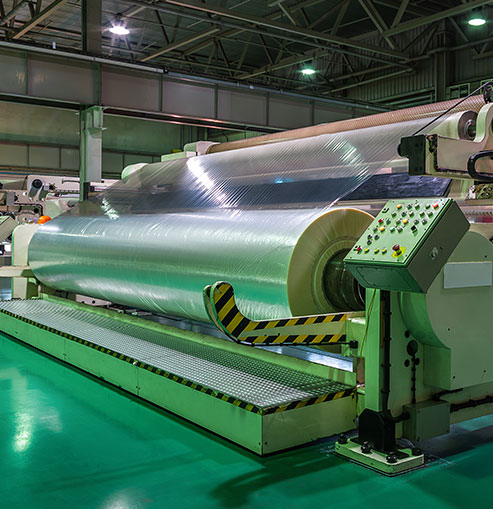
Choosing the Right VCI Film Manufacturer: What to Look For?
Choose the Right VCI Film Manufacturer When it comes to protecting metal parts and equipment from corrosion during storage and transportation, VCI (Volatile Corrosion Inhibitor) films are the ideal solution. However, not all VCI film manufacturers are created equal. Choosing the right manufacturer is essential to ensure that you get the best quality products that meet your needs. Here are some things to consider when selecting a VCI film manufacturer. How to choose VCI film manufacturer? Experience and expertise: It is important to choose a VCI film manufacturer with extensive experience and expertise in the industry. An experienced manufacturer will have the knowledge and skills to produce high-quality films that meet the specific needs and requirements of different industries. They will also have a deep understanding of the science behind VCI films, including the chemistry and technology that goes into making them. Quality and reliability: The quality and reliability of the VCI film are critical factors to consider. You want a manufacturer that uses high-quality materials and processes to ensure the effectiveness and durability of the product. Look for manufacturers who have a proven track record of producing reliable and consistent products. Range of products: Choose a manufacturer that offers a range of VCI film products to suit your specific needs. Different films are designed for various applications, such as different metals, environments, and storage times. A good manufacturer should have a variety of films to choose from, so you can get the right film for your specific application. Customization options: Different industries have unique requirements when it comes to VCI films. Look for a manufacturer that offers customization options to meet your specific needs. This can include options for film thickness, size, and packaging. A manufacturer that offers customization options can help you get the best product for your particular application. Technical support: Choosing a manufacturer that provides technical support is essential. You may have questions about the proper use and application of VCI films, and a manufacturer with technical support can provide you with the necessary information and guidance. This support can help you use the product effectively and ensure that it provides the best possible protection for your metal products. Customer Support: It's important to choose a VCI film manufacturer that provides excellent customer support. Look for a manufacturer that is responsive to your needs and can provide timely assistance with any issues or concerns that may arise, responsive to your enquiries and provides prompt delivery. Cost-effectiveness: Cost is always a factor to consider when choosing a VCI film manufacturer. While you don't want to sacrifice quality for cost, you also don't want to overspend on a product that doesn't provide the necessary protection. Look for a manufacturer that offers cost-effective solutions that balance quality and price. Reputation: Finally, research the manufacturer's reputation in the industry. Look for reviews and testimonials from other customers to see if they are satisfied with the quality of the products and customer service. Read Also : How to Ensure Rust Protection for Your Equipment and Machinery? Properties in VCI Film VCI (Volatile Corrosion Inhibitor) films are used to protect metal surfaces from rust and corrosion. These films work by releasing molecules that prevent oxidation and rust formation. There are several desired properties that VCI films should have to ensure that they provide effective protection for metal products. Compatibility with metal: The VCI film must be compatible with the metal being stored. Different metals require different types of VCI films for optimal protection. Therefore, it's essential to choose a VCI film that is specifically designed for the type of metal being stored. Durability: The films should be able to withstand harsh environmental conditions, including temperature changes, moisture, and exposure to chemicals. The films should also be resistant to tearing, punctures, and abrasions to ensure that they provide reliable protection for the metal surfaces. Ability to create a barrier against moisture and other corrosive elements: The films should prevent moisture from entering the packaging and coming into contact with the metal products. This is important because moisture is one of the main causes of corrosion in metal products. The film should also be heat-sealable to ensure a tight seal to further protect the metal from outside influences. Easy to use and apply: They should be available in different formats, such as bags, sheets, and rolls, and be easily adaptable to different packaging and storage applications. It's crucial to consider the transparency and clarity of the film. This will help ensure that the contents of the packaging can be easily identified, making it easier for workers to recognize the metal products stored inside. VCI films should be safe to use and not contain any harmful chemicals that could pose a risk to human health or the environment. They should also be compatible with the metal products being protected, ensuring that they do not cause any damage to the surface of the metal. Read Also : Benefits of Using Thin Film Rust Preventative Oils for Industrial Applications How Daubert VCI® Film works? features and benefits Daubert VCI® film is a high-quality volatile corrosion inhibitor film that provides excellent protection for metal products. The film is designed to emit a vapor that neutralizes the corrosive elements in the air, creating a protective barrier around the metal product. The film works by using special VCI molecules that evaporate from the surface of the film and surround the metal product. The molecules then react with the metal surface, forming a thin layer that inhibits the formation of rust and corrosion. This layer is non-toxic and non-reactive, meaning it will not affect the appearance or functionality of the metal product. Daubert VCI® film is effective in a wide range of environments, including harsh industrial settings and long-term storage conditions. It is easy to apply and remove, making it an ideal solution for companies that need to protect their metal products during transportation and storage. In conclusion, VCI Film Manufacturer like Zavenir Daubert provide Daubert VCI® film is an effective and easy-to-use solution for protecting metal products from corrosion and rust. Its unique vapor-emitting properties make it an excellent choice for industrial companies that need to protect their metal products from the harmful effects of the environment.
March 2023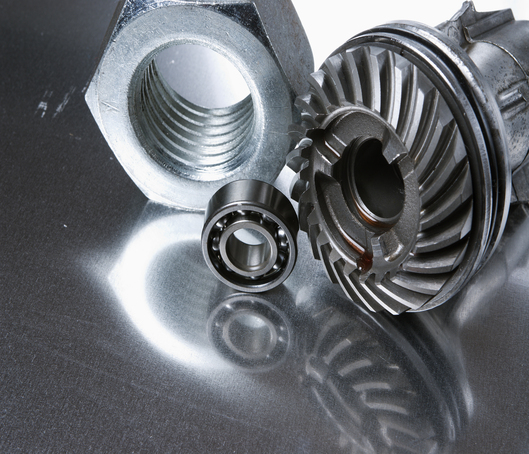
Benefits of Using Thin Film Rust Preventative Oils for Industrial Applications
Benefits of Using Thin Film Rust Preventative Oils for Industrial Applications Rust is a serious concern in the industrial sector, causing corrosion, machinery failures, and downtime, which can lead to significant financial losses. To combat rust, industries have long been using rust preventative oils, which act as a barrier between metal surfaces and the elements. Thin film rust preventative oils have gained popularity in recent years due to their numerous benefits over traditional thick film coatings. What are Thin Film Rust Preventative Oils? Thin film rust preventative oils are specially formulated oil that can be applied to metal surfaces. As the name suggests, these oils create a thin layer on the metal, which provides long-lasting protection against rust and corrosion. It prevents moisture and air from coming into contact with it, and hence reducing the risk of rust formation. The oil layer is thin enough not to interfere with the performance of the metal, but thick enough to provide sufficient protection. Thin film rust preventative oils can be used on a range of metals, including steel, iron, and copper. Read Also : How To Package Metal Tools Properly So It Doesn’t Get Rust In Transit? Benefits of Using Thin Film Rust Preventative Oils Efficient Corrosion Protection: Thin film rust preventative oils provide efficient corrosion protection by forming a protective film on the metal surface. This film acts as a barrier between the metal and the elements, preventing rust and corrosion and extends the lifespan of the metal. The thin film also penetrates small crevices and areas that are difficult to reach with traditional thick film coatings, providing comprehensive protection. Improved Surface Appearance: In addition to protecting against rust and corrosion, thin film rust preventative oils can improve the appearance of metal surfaces. These oils are transparent, so they do not alter the appearance of the metal, making it ideal for applications where aesthetics is important. The thin film also ensures that the surface remains clean and free from rust stains, keeping the metal looking new for longer. Easy to apply: Thin film rust preventative oils are easy to apply and can be used in a range of industrial applications. They can be applied through spray or brush methods, and they dry quickly. Additionally, they do not require any special equipment or training to apply. This makes them a convenient option for businesses looking for a quick and easy rust preventative solution. In most cases they are not required to be cleaned before assembly. Cost-Effective: Thin film rust preventative oils are cost-effective, making them a popular choice for industries looking to reduce their operating costs. These oils are easy to apply, require less material than thick film coatings, and provide long-lasting protection against rust and corrosion. This, in turn, reduces the need for maintenance and repairs, lowering the overall cost of ownership for machinery and equipment. Reduced Downtime: Rust and corrosion can cause significant damage to engineering parts, machinery and equipment, resulting in costly downtime. Thin film rust preventative oils can help reduce downtime by providing long-lasting protection against rust and corrosion. This, in turn, reduces the need for maintenance and repairs, allowing industries to run smoothly and efficiently. Environmentally Friendly: Thin film rust preventative oils are environmentally friendly, making them an ideal choice for industries that are committed to sustainability. These oils are free from hazardous solvents and heavy metals, making them safe for use in sensitive environments. They are also easy to apply and require minimal clean-up, reducing the amount of waste generated during the application process. Versatility: Thin film rust preventative oils are versatile and can be used on a wide range of metal surfaces, including ferrous and non-ferrous metals. They can be used in various industrial applications, including automotive, aerospace, and marine industries, among others. Thin film rust preventative oils are also compatible with a range of surface treatments, including phosphating, chromating, and black oxide. In conclusion, thin film rust preventative oils provide a range of benefits for industrial applications. They offer efficient corrosion protection, reduce downtime, improve surface appearance, are environmentally friendly, cost-effective, and versatile. Industries that use thin film rust preventative oils can enjoy long-lasting protection against rust and corrosion, while also improving the overall efficiency and appearance of their machinery and equipment. Read Also : The Importance Of Pipeline Coating for Corrosion Prevention in Oil and Gas Industry Zavenir Daubert Nox-Rust® Thin Film Rust Preventive Oil Zavenir Daubert Nox-Rust® Thin Film Rust Preventive Oil is a cutting-edge solution to the common problem of rust and corrosion. This product is designed to protect metal surfaces from rust, corrosion, and other environmental damage, making it an ideal choice for those looking to extend the lifespan of their metal equipment and structures. This rust preventive oil is based on CCI (Contact Corrosion Inhibition) Technology specifically formulated to be a thin film coating, making it ideal for use in tight spaces or on delicate machinery where a thicker coating may not be appropriate. It leaves Dry-to-Touch type of film over the metal surface. It is designed to provide long-lasting protection against the damaging effects of water, salt, and other corrosive substances. One of the key benefits of Nox-Rust® Thin Film Rust Preventive Oil is its versatility. It can be applied to a wide variety of metal surfaces, including steel, iron, and aluminium, and can be used in a range of industries, from manufacturing to construction to transportation. The application process for this rust preventive oil is simple, and it can be applied using a spray, brush, or dip method. Once applied, the thin film coating dries quickly, leaving a protective layer that is resistant to chipping, flaking, and peeling. Overall, Zavenir Daubert Nox-Rust® Thin Film Rust Preventive Oil is an excellent solution for anyone looking to protect metal surfaces from rust and corrosion. Its versatility, ease of application, and long-lasting protection make it an ideal choice for a wide range of applications.
March 2023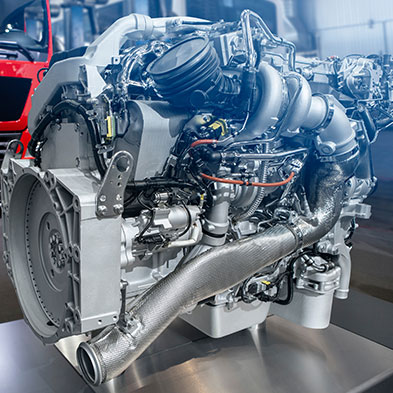
How to Ensure Rust Protection for Your Equipment and Machinery?
How to Ensure Rust Protection for Your Equipment and Machinery? Rust is a common problem that affects machinery and equipment made of metal. Over time, exposure to moisture, salt, and other corrosive elements can cause rust to form on metal surfaces, leading to damage and potentially costly repairs. To prevent this, it's essential to take steps to ensure rust protection for your equipment and machinery. Here are some tips to help you get started: Regular Cleaning: Regular cleaning of your equipment and machinery is crucial to keep them rust-free. Dirt and other contaminants can trap moisture, leading to rust and corrosion. Therefore, cleaning your equipment and machinery regularly can help prevent rust formation. Use a pressure washer or a cleaning agent to remove dirt and grime from your equipment and machinery. Once you are done with cleaning, make sure that the equipment is dry before putting it back into use. Keep Equipment and Machinery Dry: Moisture is the primary cause of rust and corrosion. Therefore, it's crucial to keep your equipment and machinery dry. Store your equipment and machinery in a dry place, away from water sources. If your equipment and machinery get wet, dry them as soon as possible to prevent moisture from sitting on the metal surface. Inspect Equipment and Machinery Regularly: Regular inspections of your equipment and machinery can help identify rust formation at an early stage. Early identification can prevent rust from spreading, minimizing the damage caused by corrosion. Inspect your equipment and machinery for signs of rust and corrosion, such as discoloration, flaking, and pitting. If you notice any signs of rust formation, take immediate action to prevent further corrosion. Use Corrosion-Resistant Materials: Using rust-resistant materials for your equipment and machinery is another effective way to prevent rust formation. Materials such as stainless steel, aluminium, or coated metals are less prone to rusting and can withstand harsh environments. Paint or Coat Your Equipment: Painting or coating your equipment and machinery can provide an extra layer of protection against rust. A good quality paint or coating can prevent moisture from reaching the metal surface, preventing rust and corrosion. Moreover, a well-painted or coated surface can also provide protection against other environmental factors such as UV rays and chemicals. Apply Rust Inhibitor: A rust inhibitor is a protective coating that can be applied to metal surfaces to prevent rust formation. It works by creating a barrier that prevents moisture and other corrosive elements from coming into contact with the metal. There are many different types of rust inhibitors available, including paints, waxes, oils and coatings. They are easy to apply and can provide long-term rust protection. You can apply a rust inhibitor through a spray, brush, or dip method, depending on the product. Choose a product that is suitable for the specific type of metal you are protecting, and make sure to follow the manufacturer's instructions carefully. Store Equipment Properly: Proper storage is critical to prevent rust formation. If you are storing equipment or machinery for an extended period, make sure it is in a dry, well-ventilated area. Avoid storing them in damp, humid areas, or outdoor locations where they are exposed to the elements. You may also want to consider using a dehumidifier to help remove any excess moisture from the air. Use covers or enclosures to protect your equipment from moisture and other environmental factors. Use Desiccants: Desiccants are substances that absorb moisture from the surrounding air. They can be used to keep the air inside the storage area dry, preventing rust formation. Place desiccant packets in the storage area to keep the air dry. Lubricate Moving Parts: Moving parts of equipment and machinery are vulnerable to rust and corrosion due to the constant exposure to moisture and air. Lubricating these parts can help prevent rust formation. Lubrication creates a barrier between the metal surface and moisture, preventing rust and corrosion. Regular lubrication of moving parts can keep them rust-free, extending their lifespan. Schedule Regular Maintenance: Regular maintenance is essential for keeping your equipment in good working order and preventing rust formation. This may include lubricating moving parts, replacing worn or damaged parts, and tightening bolts and screws. Regular maintenance also provides an opportunity to inspect the equipment for signs of rust and corrosion. Implement a Rust Prevention Plan: To ensure effective rust protection for your equipment, it's a good idea to develop a rust prevention plan. This may include a schedule for cleaning and inspections, as well as guidelines for choosing the right rust inhibitor and storing equipment properly. By having a plan in place, you can help ensure that your equipment stays in good condition for years to come. Read Also : How To Package Metal Tools Properly So It Doesn’t Get Rust In Transit? Long term Corrosion Prevention of Equipment and Machinery using Zavenir Daubert Nox-Rust® Wax and Coatings. Zavenir Daubert Nox-Rust® wax is an excellent option for long-term corrosion prevention as it provides a protective barrier between the metal surface and the environment. The wax coating acts as a sealant that prevents water, air, and other corrosive agents from reaching the metal surface. Additionally, Nox-Rust® wax coatings are highly resistant to environmental factors like heat, cold, and UV radiation. This makes them an ideal solution for long-term protection against corrosion. Nox-Rust® coatings are also an effective long-term solution for corrosion prevention. These coatings are specifically designed to provide exceptional protection against moisture, saltwater, and other corrosive agents. They can be applied to a wide range of surfaces, including metals, concrete, and plastics, providing a physical barrier that prevents corrosive agents from reaching the metal surface. One of the significant benefits of using Nox-Rust® wax and coatings is that they are environmentally friendly. They contain no toxic or hazardous materials, making them an ideal solution for industries that prioritize sustainability. In conclusion, Zavenir Daubert's Nox-Rust® wax and coatings are a highly effective and long-lasting corrosion prevention solution for equipment and machinery. They provide excellent protection against corrosion, even in harsh environments, and are environmentally friendly, making them an ideal choice for industries that prioritize sustainability.
March 2023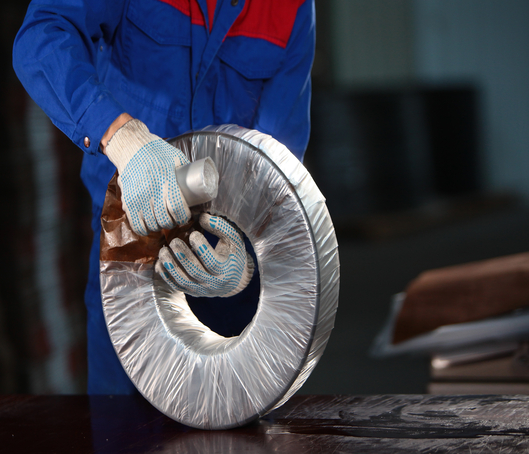
How To Package Metal Tools Properly So It Doesn’t Get Rust In Transit?
How To Package Metal Tools Properly So It Doesn’t Get Rust In Transit? Metal tools are essential for a variety of tasks, but they can easily get rusted during transportation. Rusting not only causes a loss of value but can also damage the functionality of the tools. It is, therefore, important to properly package metal tools to prevent rusting during transit. Packaging your metal tools properly is crucial to prevent rust during transit. By cleaning and drying your tools, apply an anti-rust oil, wrapping them individually, place them in a plastic bag, pack them in a proper box, using desiccants, choosing the right packaging material, sealing the packaging, and labelling the package, you can ensure that your metal tools arrive at their destination in excellent condition. Taking these steps can save your time and money on repairs or replacements, ensuring that your metal tools are always ready to use when you need them. Here are some tips on how to package metal tools properly Clean and Dry the Tools: Before packaging metal tools, ensure that they are clean and dry. Cleaning removes any dirt or debris that may cause rusting, while drying helps prevent moisture from getting trapped in the packaging. This will help prevent rust from forming during transit. Use Anti-Rust Oil: After cleaning the metal tools, it is a good idea to apply an anti-rust oil. This will provide a protective coating that will prevent rust from forming during transit. Apply a thin layer of the oil to each tool, making sure to cover all surfaces. Be sure to choose an oil that is compatible with the type of metal the tool is made from. Wrap Each Tool Individually: After applying the anti-rust oil, wrap each tool individually. Use a VCI Film, Paper or Bubble Wrap to wrap each tool, making sure it is completely covered. Use enough wrapping material to cover the entire tool, ensuring that no part is left exposed. This will help prevent scratches and other damage during transit. It will also help to prevent moisture from getting to the metal, which can cause rust to form. Place Tools in a Plastic Bag: Once each tool is wrapped, place them in a plastic bag. This will provide an additional layer of protection against moisture and rust. Use a bag that is large enough to hold all the tools, and seal it tightly. You can also use a vacuum sealer to remove as much air as possible from the bag, which will further reduce the risk of rust forming. Pack Tools in a Box: After placing the tools in a plastic bag, it's time to pack them in a box. Choose a box that is the right size for the tools, and make sure it is strong enough to withstand the rigors of shipping. You can use bubble wrap or packing peanuts to fill any gaps in the box and provide additional cushioning. Use Desiccants: Desiccants are substances that absorb moisture and are used to protect items from humidity during transport. Adding a desiccant packet in the package helps to absorb any moisture that may be present, preventing rusting of the tools. The desiccant packet should be placed in a way that it does not come into direct contact with the tools, as it may cause damage. Choose the Right Packaging Material: The type of packaging material you use can make a significant difference in protecting your metal tools during transit. Cardboard boxes, for example, are susceptible to moisture, which can lead to rust. Instead, consider using plastic containers or metal toolboxes to package your metal tools. These materials are more durable and can provide better protection against moisture and humidity. Seal the Packaging: Make sure to seal the packaging properly to prevent moisture from getting inside. Use tape to seal the edges of the packaging, and if possible, add an additional layer of plastic wrap to provide an extra layer of protection. Label the Package: Lastly, make sure to label the package as “Fragile” and “Handle with Care” to ensure that the package is handled with the necessary care during transit. This will alert the handlers to be extra careful when handling the package, reducing the risk of damage to your metal tools. The label should include the name of the recipient, the sender's name and address, and any other relevant information such as the package's contents. The label should be placed on the top of the package to ensure that it is visible. Read Also : Most Common Reasons Why Metal Parts Get Rust Zavenir Daubert Nox-Rust® Rust Preventive Oil Zavenir Daubert Nox-Rust® Rust Preventive Oil is a high-quality thin film rust preventive oil, based on CCI Technology that is widely used in various industries to protect metal parts from rust and corrosion. This oil is made from a unique blend of corrosion inhibitors and mineral oils, which provides excellent protection against rust and corrosion. Nox-Rust® Rust Preventive Oil can be used for both indoor and outdoor applications. It can be applied to a variety of metals, including steel, iron, and brass. This oil is highly effective in preventing rust and corrosion, even in harsh environments. This rust preventive oil is easy to apply and can be sprayed, brushed, or dipped. It provides a thin film that adheres well to metal surfaces and forms a barrier against moisture and air. The oil is also easy to remove, making it a convenient choice for manufacturers and end-users alike. Nox-Rust® Rust Preventive Oil is widely used in the automotive, aerospace, and machinery industries, among others. It is an ideal solution for protecting metal parts during storage, shipment, or in-service use. This oil is also environmentally friendly and does not contain any hazardous substances. Zavenir Daubert PMG® VCI Film and Paper Zavenir Daubert PMG® VCI Film and Paper is a highly effective corrosion inhibitor that is used in various industries to protect metal parts from rust and corrosion. VCI stands for Volatile Corrosion Inhibitor, which is a type of chemical compound that releases a protective vapor that creates a barrier against rust and corrosion. Zavenir Daubert PMG® VCI Film and Paper is a unique blend of corrosion inhibitors and polyethylene and paper, which provides excellent protection against rust and corrosion. This VCI film and paper can be used for both indoor and outdoor applications. It is highly effective in preventing rust and corrosion, even in harsh environments. It is ideal for protecting metal parts during storage, shipment, or in-service use. Zavenir Daubert PMG® VCI Film and Paper is easy to use and can be cut to size according to the user's requirements. Read Also : The Importance Of Pipeline Coating for Corrosion Prevention in Oil and Gas Industry Zavenir Daubert Daubrite NF Zavenir Daubert Daubrite NF VCI Emitter cum Desiccant is a unique product that provides dual protection against rust and moisture. It is a combination of corrosion inhibitors and desiccants that work together to prevent rust and moisture. This VCI emitter cum desiccant is highly effective in preventing rust and moisture, even in harsh environments. It is ideal for protecting metal parts during storage, shipment, or in-service use. The emitter releases a protective vapor that creates a barrier against rust, while the desiccant absorbs any moisture that may be present.
March 2023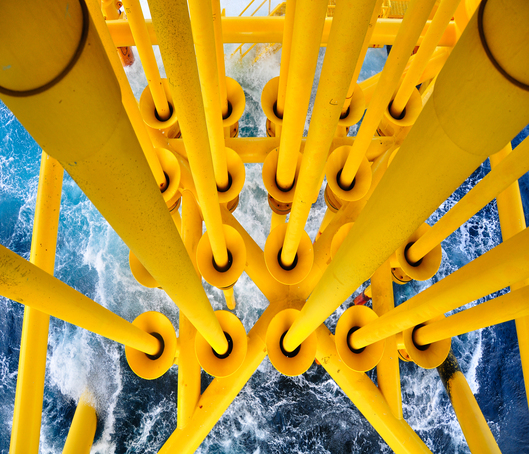
The Importance Of Pipeline Coating for Corrosion Prevention in Oil and Gas Industry
The Importance Of Pipeline Coating for Corrosion Prevention in Oil and Gas Industry The oil and gas industry is a critical component of the global economy, and the transportation of these products is essential for their distribution. Pipelines are the primary means of transporting these products over long distances, and the protection of these pipelines is essential to ensure their continued operation. One of the primary challenges faced by pipeline operators is the prevention of corrosion, which can cause significant damage to the pipeline and lead to leaks or spills. Corrosion is a naturally occurring process that occurs when metal is exposed to water, air, or other corrosive substances. This can lead to rust, pitting, and other forms of degradation that can weaken the pipeline and increase the risk of leaks or spills. To address this issue, pipeline operators often use coatings to protect the metal surface from corrosion. One of the most important factors in choosing the right Pipeline Coating for Corrosion Prevention is its ability to withstand the specific environmental conditions present in the area where the pipeline is located. For example, pipelines located in areas with high humidity or saltwater exposure will require a more robust coating that can withstand these harsh conditions. The same is true for pipelines located in areas with extreme temperatures or exposure to sunlight. The selection of the right coating can significantly impact the overall lifespan of the pipeline and reduce the risk of corrosion. Read Also : Different methods of Corrosion Prevention Corrosion prevention in the oil and gas industry: Oil field corrosion challenges are not static phenomena. Fluid characteristics change over time, resulting in systems becoming less responsive to established corrosion prevention methods. Followings are the methods advised for corrosion prevention in Oil & Gas sector: Selection of appropriate materials Use of inhibitors Use of protective coatings Adequate corrosion monitoring and inspection Cathodic protection technique Selection of appropriate materials: When it is observed that the existing materials of construction are prone to corrosive attack, it is normally decided to change the materials of construction and select alternate materials to suit the specific need. Stainless steels cover a wide range of alloys, each with a particular combination of corrosion resistance and mechanical properties. Oil and gas equipment last longer when both inhibitors and protective coatings are used together. Use of inhibitors: Inhibitors are chemicals that are used to protect the surface of metals used in oil and gas industries to prevent corrosion. A corrosion inhibitor may act in several ways: It may restrict the rate of the anodic process or the cathodic process by simply blocking active sites on the metal surface.A further mode of action of some inhibitors is that the inhibiting compound contributes to the formation of a thin layer on the surface which stifles the corrosion process. VCI is an environmentally safe and cost-effective option for corrosion protection. VCIs form a physical bond on the metal surface and create a barrier layer to protect against aggressive ions. The barrier re-heals and self-replenishes and can be combined with other protective coatings. It can be used in pipelines, oil and gas wells, refinery units, and fuels. In addition, these proprietary Daubert VCI based anti-corrosion products are designed to work in presence of moisture. Use of protective coatings: A protective layer or barrier on the material to avoid the direct contact with the process media will enhance the material and equipment life. The barrier layer can be paint, a coating or a lining, or a metallic lining or metallic sheets. There are also non-metallic linings like fibre glass, glass flake, epoxy, and rubber which are normally carried out on the equipment like separators, knock-out drums, and storage tanks. Coatings based on Daubert® CCI (Contact Corrosion Inhibition) & SACI® (Severe Atmospheric Corrosion Inhibitors) technologies have found to be very useful by several important players in this field. Adequate corrosion monitoring and inspection: Corrosion monitoring is the practice of measuring the corrosivity of process stream conditions by the use of probes (mechanical, electrical, or electrochemical devices) which are inserted into the process stream and continuously exposed to the process stream condition. Corrosion monitoring techniques alone provide direct and online measurement of metal loss/corrosion rate in oil and process systems. However, the best way to check corrosion is by visual inspection and checking up the material degradation periodically. Read Also : Most Common Reasons Why Metal Parts Get Rust Zavenir Daubert Nox-Rust® Waxes and Coatings and its application Zavenir Daubert Nox-Rust® is a line of rust preventive waxes and coatings that offer advanced protection against severe atmospheric corrosion. The SACI® (Severe Atmospheric Corrosion Inhibitor) technology used in these products is specifically designed to protect against the harsh conditions that lead to rust and corrosion. This technology creates a protective barrier that seals in the underlying metal and prevents moisture, salt, and other corrosive elements from penetrating. These rust preventive waxes and coatings are ideal for use in a variety of industries, including automotive, aerospace, marine,construction, and oil & gas. With their long-lasting protection and easy application, Zavenir Daubert Nox-Rust® products are a reliable solution for those in need of rust protection.
March 2023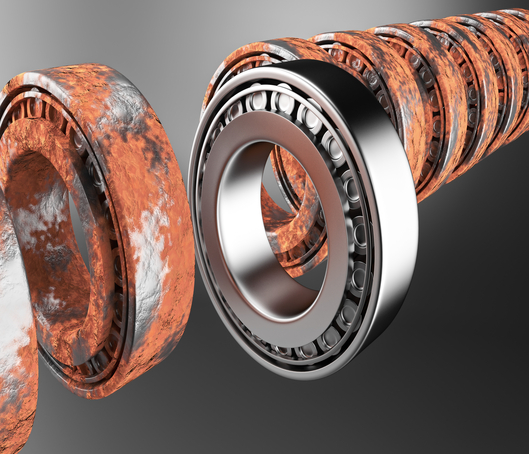
Most Common Reasons Why Metal Parts Get Rust
Most Common Reasons Why Metal Parts Get Rust Rust is a common problem faced by metal parts and equipment, leading to reduced durability, strength and appearance. The formation of rust, also known as oxidation, is a natural process that occurs when metal reacts with moisture and oxygen in the air. This reaction results in the formation of iron oxide, which is commonly known as rust. Most common reasons why metal parts get rust 1. Moisture and Humidity: Moisture is one of the primary causes of rust, as it reacts with the metal to form iron oxide. High humidity levels and exposure to water can accelerate the rusting process, making it important to keep metal parts dry and protected from the elements. 2. Oxygen: Oxygen is another key ingredient in the formation of rust. When iron reacts with oxygen, it creates iron oxide. This reaction can be accelerated by the presence of moisture. 3. Residues on the Metal Surface: Residues from Manufacturing Processes, such as coolants, surface finishing chemicals, rinse waters, spirits and from airborne contaminants, such as pickling & plating lines or nearby polluting sources (factories, treatment plants, etc). 4. Salt or Salt Water : Salt water is highly corrosive and can cause rust to form quickly on metal parts. This is especially true for parts that are frequently exposed to saltwater environments, such as those found in marine equipment and coastal areas. 5. Direct metal contact with Unprotected Hands: Finger-prints deposit Salts on metal surfaces causing accelerated electro-chemical reaction. Critical in higher humid conditions even over short periods of time. 6. Poor Quality Metal: Low-quality metal is often more susceptible to rust, as it may have impurities or other contaminants that can lead to corrosion. Additionally, metal parts that are not properly coated or treated with rust inhibitors are also more likely to rust. 7. Lack of Maintenance: Regular maintenance is essential to preventing rust, as it helps to remove any build-up of rust and keep metal parts clean and protected. Failing to regularly maintain metal parts can result in rust forming, which can quickly spread and cause significant damage. 8. Exposure to Chemicals: Certain chemicals can react with metal parts and cause rust to form. This is especially true for chemicals that are acidic or alkaline in nature, as they can break down the protective surface of the metal and allow rust to form. 9. Environmental Factors: Environmental factors such as temperature fluctuations. Higher the Humidity and Temp fluctuation, more moisture condenses on metal. Export shipments are severely affected due to high Humidity and Temp fluctuations. 10. Storage, Packaging & Shipping conditions: Storage: Location e.g., open, shed, closed shed, Packaging: Materials used e.g., wood, corrugation, packaging design, Shipment Conditions: Duration to Use, conditions during transit, etc., Read Also : How to Keep your Metal Parts Rust-free when Shipping Containers Overseas In conclusion, rust is a common problem faced by metal parts and equipment, and there are several reasons why it can occur. By understanding the most common causes of rust, you can take steps to prevent it from forming and extend the life of your metal parts and equipment. This includes proper maintenance, using high-quality metal, avoiding exposure to corrosive elements, and using rust inhibitors. By taking these steps, you can ensure that your metal parts remain strong, durable, and rust-free for years to come. How Daubert Rust Preventive Oil and VCI protects metal parts from rust? Zavenir Daubert Rust Preventive Oil and VCI (Vapor Corrosion Inhibitor) are highly effective solutions for protecting metal parts from rust. The rust preventive oil forms a barrier over the metal surface, preventing moisture and oxygen from coming into contact with the metal and causing rust. The VCI, on the other hand, releases vapor that creates a protective layer around the metal, preventing rust from forming. Together, these products provide a comprehensive solution for protecting metal parts from rust. In addition, they are easy to use and can be applied to metal parts using a spray, dip, or brush. By using Zavenir Daubert Rust Preventive Oil and VCI, you can ensure that your metal parts remain rust-free and protected, even in harsh and corrosive environments. Zavenir Daubert Nox-Rust® Rust Preventive Oils and its application. Zavenir Daubert Nox-Rust® Rust Preventive Oils are specially formulated oils that protect metal surfaces from rust and corrosion. These oils are used in various industries such as automotive, aerospace and manufacturing to protect metal parts and equipment from rust and corrosion. The oils are applied to metal surfaces through dipping, brushing, or spraying, and they form a protective film that prevents moisture and other corrosive elements from coming into contact with the metal. The oils also contain rust inhibitors that slow down or stop the rusting process and extend the life of metal surfaces. Zavenir Daubert Nox-Rust® Rust Preventive Oils are an effective and cost-efficient way to protect metal surfaces and prolong their life. Read Also : Different methods of Corrosion Prevention Zavenir Daubert VCI® (Volatile Corrosion Inhibition) and its application. Zavenir Daubert VCI® (Volatile Corrosion Inhibition) is a cutting-edge technology used in rust protection for metal parts and components. The VCI process works by emitting a vapor that covers the surface of the metal and creates a protective layer that prevents rust and corrosion from forming. The VCI molecules are specially designed to penetrate into tight spaces, crevices, and hard-to-reach areas, ensuring that every surface of the metal is protected. This innovative technology is ideal for use in a variety of industries, including automotive, aerospace, electronics, and manufacturing. The VCI process is easy to apply and is environmentally friendly, making it a popular choice for those looking for an effective rust protection solution. With Zavenir Daubert VCI® technology, metal parts and components can be stored for long periods of time without the risk of rust or corrosion.
March 2023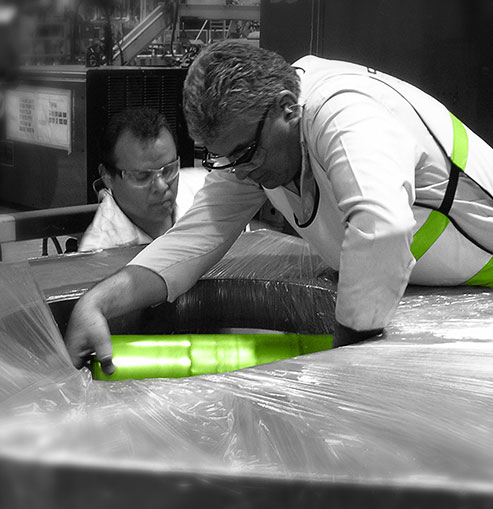
Different methods of Corrosion Prevention
Different methods of Corrosion Prevention Corrosion is a natural process that results in the degradation of metal surfaces, causing them to lose their strength and stability over time. This process is a major concern for various industries, especially in the transportation, construction, and engineering sectors. Thus, preventing corrosion is essential for industries and individuals to maintain the integrity and longevity of their assets. Here are some of the most effective methods of corrosion prevention: Coating: One of the most common methods of corrosion prevention is applying coatings to metal surfaces. The coatings act as a barrier between the metal and the environment, preventing the corrosion from spreading. Coatings can be made from materials such as paint, plastic, or zinc. Galvanization: Galvanization is the process of coating metal surfaces with a layer of zinc. The zinc coating acts as a sacrificial anode, corroding in place of the metal underneath, thus protecting it from rust and other forms of corrosion. Electroplating: Electroplating is another common method of corrosion prevention. This process involves coating metal surfaces with a layer of another metal, such as nickel or chrome, using an electrical process. This creates a barrier that prevents the underlying metal from corroding. Anodizing: Anodizing is a process that creates a protective oxide layer on the surface of metal. This process makes the metal more resistant to corrosion and improves its durability. Cathodic protection: Cathodic protection is a method that uses an electrical current to prevent corrosion. The current is applied to the metal surface, which creates a protective layer that prevents the metal from corroding. This method is commonly used to protect offshore structures, pipelines, and storage tanks. Alloying: Alloying is the process of adding other metals to a base metal to improve its properties, including its resistance to corrosion. For example, adding chromium to steel produces stainless steel, which is highly resistant to rust and other forms of corrosion. Inhibitors: Corrosion inhibitors are chemical substances that are added to a metal surface or to the environment surrounding the metal to slow down the rate of corrosion. There are several different types of inhibitors, including organic inhibitors, which are typically used to protect metal surfaces in storage and transportation, and inorganic inhibitors, which are used to protect metal surfaces in industrial processes. Corrosion inhibitors like Rust Preventive Oils, Waxes, Coatings, VCIs, etc. provides temporary barrier protection from corrosion. Temporary Barrier Protection: It is the conventional rust protection method and found one of the appropriate methods to protect the parts from rust, as it allows for flexibility in application, excellent confluence with upstream and downstream requirements and is considered very economical. Rust Preventive Oil and Waxes form a temporary barrier over the metal surface which provides protection from corrosion. It can be applied by dipping, spraying, or brushing. After the treatment, the material can be easily removed. The coating provides protection from corrosion during manufacturing, shipping, storage, transportation, and distribution. Protecting metals from rust without the use of oils or physical coating paved the way for the invention of VCI (Volatile Corrosion Inhibitor). Metals can be wrapped or covered with VCI paper or films, and they would remain corrosion free. In conclusion, these are some of the methods used for corrosion prevention. While each method has its own advantages and disadvantages, the best method for preventing corrosion depends on the type of metal, the environment in which it is used, and the desired level of protection. Regardless of the method chosen, it is important to take steps to prevent corrosion, as it can result in significant costs and disruptions for various industries. Read Also : VCI Paper Or VCI Film – Which Is The Right Choice? Daubert CCI® (Contact Corrosion Inhibition) Technology Daubert CCI® (Contact Corrosion Inhibition) technology is developed for the protection of metal surfaces against corrosion. The CCI technology provides long-lasting protection to metal surfaces through the use of specialized inhibitors that are added directly to the metal surface. The CCI technology works by forming a protective barrier around the metal surface, preventing corrosive agents from coming into direct contact with the metal. This barrier slows down the corrosion process, preserving the integrity of the metal and extending its lifespan. The CCI technology is ideal for use in a range of industrial applications, including automotive, aerospace, and defense industries. The inhibitors used in the CCI technology are highly effective in preventing corrosion in harsh environments, such as high humidity, salt spray, and corrosive chemicals. One of the key benefits of the CCI technology is its versatility. It can be used on a wide range of metal surfaces, including aluminium, steel, and stainless steel, and can be applied through a variety of methods, including dipping, brushing, and spraying. This makes the Daubert CCI® technology an ideal solution for a range of corrosion protection needs. Daubert VCI® (Volatile Corrosion Inhibition) Technology Daubert VCI® (Volatile Corrosion Inhibitor) technology is widely used in the metal processing industry to protect metal parts from corrosion during storage and transportation. The technology is based on the use of specially formulated VCI products, such as paper, film, or emitter, which emit VCI molecules that form a protective layer on the surface of metal parts. This layer prevents the metal from being exposed to the environment, protecting it from rust and other forms of corrosion. VCI technology is highly effective in preserving the integrity and quality of metal parts, especially in harsh environments where traditional rust inhibitors may not be sufficient. The VCI products are non-toxic and environmentally friendly, making them an ideal choice for industries with strict environmental regulations. In the metal processing industry, Daubert VCI® is widely used for the protection of various metal parts, including steel, aluminium, and brass. The technology is also suitable for use in the packaging of delicate machinery, electrical components, and other critical metal parts.
February 2023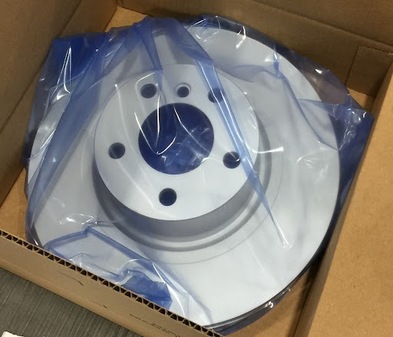
VCI Paper Or VCI Film – Which Is The Right Choice?
VCI Paper Or VCI Film – Which Is The Right Choice? VCI (Volatile Corrosion Inhibitor) is a type of technology that provides protection against corrosion in metal objects during storage and transport. VCI technology is used in various forms such as VCI paper, VCI film, and VCI foam. These materials are designed to emit vapor that protects metal surfaces from corrosion by creating a barrier between metal surfaces and the environment. VCI paper and VCI film are two of the most commonly used forms of VCI technology for protecting metal surfaces. The choice between these two options often depends on the specific requirements of the application and the type of metal that needs to be protected. VCI Paper: VCI paper is a specially treated paper that emits VCI vapor to protect metal surfaces from corrosion. It is widely used in applications where metal objects need to be stored or transported. VCI paper is also used to protect metal components during storage and shipping. It is commonly used to protect electrical components, automotive parts, and other metal objects. VCI paper is easy to use and comes in various sizes and shapes to fit specific applications. It can be cut to size and placed in the desired location. Additionally, VCI paper is flexible, making it easy to wrap around irregularly shaped objects. The VCI vapor emitted from the paper forms a protective layer on the metal surface and provides long-lasting protection. VCI Film: VCI film is a plastic material that emits VCI vapor to protect metal surfaces from corrosion. It is a more durable and flexible option than VCI paper, making it a good choice for applications where metal objects need to be stored for a longer period of time. VCI film is often used to protect metal products during shipping and storage. It is also used to protect metal parts during the manufacturing process. VCI film is easy to apply and can be customized to fit specific shapes and sizes. It is also easy to remove and does not leave any residue on metal surfaces. The VCI vapor emitted from the film forms a barrier on metal surfaces and provides long-lasting protection. Read Also : What are VCI Emitters & How do these Empower the Life of Metal Parts? Which is the right choice for your application? The choice between VCI paper and VCI film depends on the specific requirements of the application. Both options provide effective protection against corrosion, but there are some differences that may make one option more suitable than the other. If you need to protect metal objects during storage or transportation, VCI paper may be the right choice. It is a cost-effective option and is easy to use. Additionally, it is flexible and can be cut to size, making it easy to wrap around irregularly shaped objects. If you need to protect metal objects during shipping or storage for a longer period of time, VCI film may be the right choice. It is more durable and flexible than VCI paper and provides long-lasting protection against corrosion. Additionally, it is easy to apply and remove and does not leave any residue on metal surfaces. In conclusion, both VCI paper and VCI film are effective options for protecting metal surfaces from corrosion. The choice between the two will depend on the specific requirements of the application, including the type of metal that needs to be protected, the length of time the metal needs to be protected, and the cost of the solution. Regardless of which option is chosen, both VCI paper and VCI film provide reliable protection against corrosion, making them valuable tools for protecting metal objects during storage and transportation. Daubert VCI® usage in metal processing industry Daubert VCI® (Volatile Corrosion Inhibitor) technology is widely used in the metal processing industry to protect metal parts from corrosion during storage and transportation. The technology is based on the use of specially formulated VCI products, such as paper, film, or emitter, which emit VCI molecules that form a protective layer on the surface of metal parts. This layer prevents the metal from being exposed to the environment, protecting it from rust and other forms of corrosion. VCI technology is highly effective in preserving the integrity and quality of metal parts, especially in harsh environments where traditional rust inhibitors may not be sufficient. The VCI products are non-toxic and environmentally friendly, making them an ideal choice for industries with strict environmental regulations. In the metal processing industry, Daubert VCI® is widely used for the protection of various metal parts, including steel, aluminium, and brass. The technology is also suitable for use in the packaging of delicate machinery, electrical components, and other critical metal parts. Read Also : How to Keep your Metal Parts Rust-free when Shipping Containers Overseas? Daubert VCI® Paper Daubert VCI® Paper is designed for the protection of metal surfaces during storage and transportation. The paper is pH neutral, safe for use, and does not leave any residue on the metal. The VCI technology makes Daubert VCI® Paper a cost-effective and environmentally friendly solution for rust prevention compared to traditional rust inhibitors. It is suitable for a wide range of metal products, including machinery, automotive parts, and electronics. The effectiveness of Daubert VCI® Paper has been proven through years of use and customer satisfaction. Daubert VCI® Film Daubert VCI® Films are specially designed films that protect metal parts and surfaces from corrosion. The films contain volatile corrosion inhibitors (VCIs) which provide an extended protection against rust, oxidation and other forms of corrosion. These films are ideal for packaging and storage of metal parts, especially those that are exposed to harsh environments or long-term storage. The films come in different thicknesses, widths, and lengths to meet the specific requirements of metal products and packaging. They are easy to use, cost-effective and offer a long-lasting protection against corrosion.
February 2023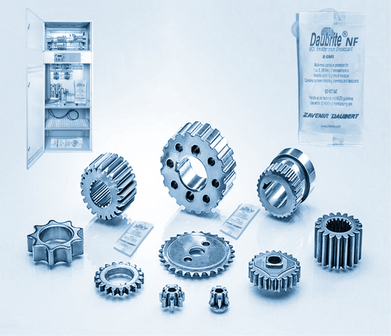
What are VCI Emitters & How do these Empower the Life of Metal Parts?
What are VCI Emitters & How do these Empower the Life of Metal Parts? Understanding VCI Emitters Every industrial manufacturer’s worst nightmare is Metal Corrosion. When this problem occurs, it deteriorates the quality of the end product while also impacting the growing revenue in the market. So, if you are one of those manufacturers looking for a successful and safe system to protect your metal products from corrosion, you can rely on VCI Emitters to do the job for you. VCI Emitters are small devices that emit Volatile Corrosion Inhibitor molecules in a closed area to protect the metal surface from corrosion. In other words, VCI Emitters are small packaging that encompasses the closely fit VCI chemical in large quantities, that is dispersed into the surrounding areas bit by bit over time. Features of VCI Emitters VCI Emitters have some important aspects that prove their effectiveness and efficiency apart from specialties. 1. It is a small package consisting of a large number of volatile corrosion inhibitors that are multi-metal protecting that goes for a longer period. 2. Super easy to install for use 3. It is compact and easy to move and transport. 4. The application ensures that conventional methods of corrosion inhibition such as spraying, dipping, coating, painting, oiling, and so on are eliminated. 5. These are one of the most efficient corrosion prevention elements lasting around 2 years. Read Also : How to Keep your Metal Parts Rust-free when Shipping Containers Overseas Application of VCI Emitters Corrosion is a situation that is inevitable when you consider metals, oxygen, and moisture in the same environment. To prevent this from happening, automobile and engineering industries look for setting up the warehouse environment with complete protection from corrosion elements. This will be an expensive and complicated situation to handle. With VCI Emitter corrosion inhibitor products, it is easier to provide corrosion protection to the metal components for closed areas of storage. Application of VCI Emitters is to protect the following from corrosion: 1. Tools and Spare parts in storage boxes 2. Medical equipment and machinery for longer life 3. Scientific instruments and machinery 4. Metal enclosures for power generation units 5. Military and marine equipment and vehicles 6. Electrical panels and busbar cabinets 7. Electronics industry including electromechanical equipment 8. General engineering machinery 9. Use in the automobile industry 10. Machine and automobile parts during storage and transit Read Also : : Safe, Effective, and Easy to Use Rust Preventive Liquids Future of VCI Emitters with Zavenir Daubert Zavenir Daubert has taken a step toward empowering customer satisfaction and eliminating anxiousness about inevitable damage due to corrosion advancers in the atmosphere. This fear is generally realized in storage, transit, and during operation. With Zavenir Daubert VCI Emitter technology would empower the life of the metal elements in all aspects ensuring long life and strength in operation. You can get in touch with the experts and professionals of the Zavenir Daubert team to access the best corrosion inhibition solutions for your situation.
February 2023
How to Keep your Metal Parts Rust-free when Shipping Containers Overseas
How to Keep your Metal Parts Rust-free when Shipping Containers Overseas Industries dealing with shipment and transportation through seas understand the importance of protecting the shipment from any harm. Physical harm aside, there is another important matter of concern during shipment. When the shipment is of metal-based materials, there is a high risk of corrosion due to harsh weather in the seas. The ship containers have to bear the complete brunt of the extremely humid surroundings, salt-water sprays, mist and dews of the night and day changes, and sudden rains and storms. Therefore, ensuring better corrosion protection is a necessity. Reason Behind Shipment Corrosion and its Effects Manufacturers, suppliers, and transportation companies of metal-based products need to understand what causes corrosion, the reasons, and its effects. 1. Loose packaging When the metal products are ready to be shipped, they are sometimes not packed tightly in their respective covers. Due to this, it is easy for external elements to penetrate and trigger the rusting process. 2. Lack of RPO layering These times demand some rust preventive oils layering on metal products as a barrier from corrosion. When this important step is skipped by manufacturers and suppliers, it can cause additional loss from corrosion in transit. 3. Insufficient Desiccants Desiccants are extensively used where moisture is a hurdle. Therefore, missing out on a good number of desiccants can be a way to welcome moisture particles in a place like a sea. Hence, corrosion is inevitable. 4. Improper Container Hold The shipment is usually kept in cargo holds or containers on the ship. It is important to clean and maintain those containers before initiating metal objects transfer. A clean and properly closed-off container ensures the least possibility of corrosion. Read Also : Safe, Effective, and Easy to Use Rust Preventive Liquids 5. Salt-Water Showers It is natural to experience salt-water showers on the ship when you are in the middle of the sea. When complete physical barriers with rust preventive oils, VCI barriers, and VCI desiccants are used, corrosion is averted. 6. Temperature Fluctuations It is usual for the temperature to have a sudden drop in the middle of the seas after sunset. This can lead to morning mist and dew as well. This dew leads to container rain as well as temperature drops. All of these contribute greatly towards corrosion if metal objects are exposed. 7. Humidity The boon of all reasons, humidity is a combination of air contaminants, water, and oxygen all of which are responsible for corrosion. Hence, at sea, you can experience all these extreme levels of humidity. How to Protect Metal Parts during Shipment? While we have perused all the possible reasons during shipment that can lead to metal corrosion, we need a solution to this problem. Zavenir Daubert has numerous products that can contribute to metal object corrosion protection. 1. Rust preventive oils Rust preventive oils are certain treated oils that have infused chemicals to form a protective molecular level layer over the metal surface. This layer is a physical barrier against corrosion and lasts longer. 2. Desiccants and Emitters Daubert VCI Desiccants and Emitters absorb moisture and emit VCI molecules to form a barrier layer on the metal surface to protect the metal from corrosion. Read Also : How To Enhance Rust Protection using VCI and CCI Combined Technologies? 3. VCI polybags, papers, sheets These are packaging materials that can be used for wrapping up metal objects of all sizes. After a certain duration, the VCI molecules settle on the metal surface to build a molecular barrier against corrosion. 4. Combination of two or more above When the combination of the above solutions is used, the life of the metal objects increases even more. The better the protection, the better the results. Therefore, keeping desiccants as a necessary protection, and adding rust preventive oils can help provide double protection. Add to it the packaging material being VCI wrappings, and it keeps the objects intact. Therefore, to keep the metal parts rust-free, there are certain barriers and protections available. With Zavenir Daubert as your corrosion expert and protective products, you can find the best consultation advice for your products to make them corrosion-resistant during shipment.
January 2023
Safe, Effective, and Easy to Use Rust Preventive Liquids
Rust Preventive Oil or Liquids : Safe, Effective, and Easy to use Every industry dealing with metal objects and machinery requires effective rust-prevention solutions. Rust preventive oils or liquids are quite popularly used for coating by dipping, brushing, and spraying on metal objects as a protective barrier against corrosion. They provide temporary corrosion protection and removal is not required in most cases. And if any case removal is required, it can be removed easily by alkaline cleaner. Rust Preventive Oils Performance Rust preventive oils are good corrosion inhibitors. These are utilized by applying a coating, by brushing, or spraying on the surface or by dipping the metal objects in this. The application is based on various factors like metal object geometry, shape, size, weight, ease of use, safety, etc. However, dipping is the most recommended method because it ensures better dewatering and total coverage of metal surface by oil. Performance of RPO also depends on various other factors like pre-process (metalworking, cleaning, etc), packaging, handling, storage, shipping, etc. The product having the oil base has a lubricative finish that could border on sticky and possibly messy. Touching or coming in contact with such a surface means that your hands or any objects in contact can get messed up. At the same time, due to the sticky surface a lot of air contaminants get stuck to the oil surface. Over time the metal objects finish goes from glossy to dusty and untidy due to the constant accumulation of dust on the oiled surface. Gradually, this eats away at the rust preventive oil barrier decreasing its performance of corrosion inhibition. Dry to touch oil Dry to touch oil is a quick-drying coating intended to protect metal components from rusting. It is made up of corrosion inhibitors and solvents that provide a protective dry film when applied. In industrial and automotive sector it has wide application by preventing the formation of rust, having fast response. Safety measures are necessary during the operation to include ventilation and protective clothing. Read Also : How To Enhance Rust Protection using VCI and CCI Combined Technologies? Rust Preventive Oil: Safe for Health & Environment Rust preventive liquids are either water-based or oil-based or solvent-based. Water based give lesser protection than oil or solvent based liquids and therefore oil and solvent based are preferred. Since Oil and solvent based liquids are petroleum products, they are flammable and volatile in nature. Therefore, high flash rust preventive liquids are safer than low flash rust preventive liquids for human health and the environment. High flash point liquids are always preferable as these products are safer in handling, usage, transportation. 1. Rust Preventive Oil are sticky and oily to the touch. On the other hand, solvent based liquids are applied like a thin coat and leaves dry-to-touch type film which means after the application liquid evaporates and on touch, you would not be able to feel it. 2. Consumption of solvent-based rust preventive is lesser than oil-based, therefore solvent based leaves lesser impact on environment. 3. Oil based liquid might be required to be cleaned off or removed when the metal object needs to be utilized. On the other hand, no removal is necessary in the case of low viscosity solvent bases rust-preventive liquids. Read Also : Seaworthy Corrosion Free Packaging Solutions Technology behind Rust Preventive Oil Metal surfaces and enclosed areas need rust protection. These areas include metal components, machinery, sheet metal, tubes, boilers, fuel tanks, and piping systems. There has always been a challenge to manufacture these products while at the same time protecting them enough to be used, stored, exported, layup, and preserved from corrosion for a long time. With NOX-RUST® Rust Preventive Liquids CCI and VCI Technology; safe, effective, and easy prevention from corrosion is possible. The VCI liquid has the property of Daubert VCI where the molecules follow the rules of volatility and polarity along with self-dissipation. In an enclosed situation, the molecules within the Rust Preventive Oil liquids volatilize themselves and form a strong molecular barrier atop the metal surfaces. This causes protection from moisture, salt, dirt, oxygen, and other elements. On application of liquids, in most cases, the meta; objects are ready to use immediately, and no removal process is required due to the liquid’s compatibility with fuels, gases, fluids, and lubricants are required. Rust-preventive liquids are therefore safe to use, quite efficient, and easy to apply when put to use.
January 2023
How To Enhance Rust Protection using VCI and CCI Combined Technologies
How To Enhance Rust Protection using VCI and CCI Combined Technologies? There are many temporary corrosion prevention techniques available in the market today. Yet it has been realized that when a combination of VCI and CCI technologies is used, the result is even better. Understanding VCI and CCI Technologies VCI is the technology that makes use of the volatile corrosion inhibiting molecules within the wrapping products like paper sheets, poly films, and so on. These molecules come into play when the wrapping material comes near to the metal product. The polarity of the VCI molecule ensures that the VCI from the wrapping material are attracted and settled on the metal surface and form a layer of 3-5 molecule. This seals off the metal surface and forms a barrier against any corrosion-causing contaminants. CCI technology on the other hand makes use of the contact corrosion inhibition concept. Products like rust preventive oils, coatings or waxes are based on CCI technology. In this, the rust preventive oils are coated onto the metal surface of the object to protect the parts or component from corrosion. In both cases, these technologies are best utilized in manufacturing, storing, and transportation purposes of metal objects from the automobile and engineering industries. Read Also : Seaworthy Corrosion Free Packaging Solutions Corrosion Protection Performance after Combining these Technologies Either of these technologies VCI or CCI would be enough to protect any metal product from corrosion. But the use of the two together is a great combination with remarkable corrosion protection capability. This is best in the case where the environment and atmosphere are moist and condensed, like sea shipment or high rain areas. This combination leads to the following conclusions: 1. The protection life of the preserved metal objects is extended. 2. Cost and technical objectives are met by the optimized use of both technologies in tandem. 3. The limitations of individual technologies are countered by the combination. The overall performance of corrosion protection after combining the technologies is visible from the above-mentioned conclusions. The compatibility of the rust preventive oils, and the volatile corrosion inhibitor products play an important role in corrosion prevention performance. The understanding of their chemistry is vital to ensure no negative points come into the highlight during their association. They work together to extend the life of metal objects. Rust preventive oils have a naturally exhaustive life. Over time, the natural barrier is broken by the repeated pressure from the natural atmospheric cycles. On such an occasion, VCI molecules come into play. This, therefore, extends the life of the metal component till the VCI layer reaches its end. Use of Optimized Quantities of both to Achieve Technical Objectives Export of metal parts and objects across seas areas might require longer commute duration. For the same, the corrosion protection must be extended by several months. At the same time, the use of rust prevention methods should always result in the best solutions that are light and non-interfering with the transport process while meeting cleanliness standards. For this thicker layering of best-quality rust preventive oils on a standalone basis was utilized earlier. This required the extra cost of cleaning and the additional cost of thicker layering of the oils. To balance the expenses, the use of Daubert VCI materials along with rust preventive oil such as NOX-RUST both in optimized quantities can help meet the cost and technical objectives. Read Also : VCI Film Bags and Packaging Sheets The Combination Covers the Limitations of both Technologies When VCI materials are required for utilization, there are some strict pre-application guidelines and a must-be-followed to-do list. This includes cleaning the surface thoroughly to ensure no dust, dirt, moisture, fingerprints, or any residues are remaining. This level of thoroughness is not possible in manufacturing units that follow conventional processes and have been long-standing in the industry. Hence, such manufacturers can utilize Rust preventive oils as the first layer of coating as these are light and do not require much hassle expect for cleaning off moisture. Additionally, these rust preventive oil coatings are protected further by the VCI materials. Conversely, the order of using the corrosion protection materials can change as the corrosion protection oil is lightweight and capable of being used anyhow. Therefore, the use of the VCI and CCI technologies together in certain combinations has proved to be economical and more beneficial in applications. The best results can be seen during export procedures of metal parts and objects.
January 2023
Seaworthy Corrosion Free Packaging Solutions
Seaworthy Corrosion Free Packaging Solutions Across many industries, manufacturing products and spare parts are not the only steps in the entire process. Ensuring that the products based on metal materials are protected well in storage and shipped over to the dealers and sellers safely is a priority. With the advanced Seaworthy Corrosion-free packaging solution at hand, it is now possible to maintain the original state of the products. What is VCI Seaworthy Packaging? To ensure that the metal-based products and commodities are well packaged into a promising wrapping to ensure complete protection, opting for VCI Seaworthy packaging is the best choice. The VCI seaworthy technology works on a certain principle where the molecules of VCI are embedded inside the wrapping materials. When the metal-based products are wrapped tightly in those VCI seaworthy packaging materials, the molecules of VCI are shifted and attracted to the metal surface. The molecules hence, bind themselves over the metal surface molecules so tightly that they are immersed to the depth of 2-3 molecules. This VCI Seaworthy packaging layer over the metal surface forms a barrier that protects the metal products from corrosion and remains rust-free for a long while even after the wrapping is removed. The specific seaworthy packaging has additional features that protect the cargo during shipment and also during other handling conditions. The strong and safe packaging enables a wrapping that provides safety from mishandling of the cargo from pushing, falling, shoving hard, scratching, and so on. Also, during shipment, maritime conditions are taken care of and protection from moisture and water showers is possible as well. Read Also: Rust Inhibition & Protection with VCI Foam How does VCI Seaworthy Packaging work to Benefit Maritime Shipments? When, there are metal products required to be stored for a certain period or transported to different long-distance sites, the need for corrosion-protective packaging arises. The purpose of utilizing the VCI-based corrosion protective packaging is to ensure that rusting is prevented and also any possible threats to the metal surfaces because of the use of oils, greases, paints, and sprays. Seaworthy VCI packaging is highly compatible with the most commonly utilized metals and alloys and the combination of more metals. No special treatment is supplied to the metal parts or products before packaging. The only requirement is to keep them clean and wrap them in the VCI seaworthy packaging material. When transporting through the sea, materials are often handled crudely. Even storms and uneven water levels can result in the transporting materials being shoved and pushed about in the cargo hold. To ensure that no external damage is caused through pressures and scratches, the VCI seaworthy packaging is employed. Zavenir Daubert’s Anti-Rust Seaworthy Packaging Zavenir Daubert has been looking into building protective solutions for all industries and their commodities for over decades. To ensure that they achieved their goal in the best possible way, prominent and most applicable technological solutions were developed. With that, VCI Technology was brought into the fold that ensured nothing but a molecular layer over the packaged metal material to prevent rusting. While this technology was infused in a poly bag to provide a physical barrier and complete protective care for seaworthy cargo. Read Also: VCI Anti-Rust Solutions The most common VCI products by Zavenir Daubert being implemented in industries today include: Daubert VCI Paper Daubert VCI Films Daubert MPI Foams Daubert 5 VCI Emitters Daubert NF VCI Emitter Cum Desiccants You can find the best products to suit your needs of the industries if you have the requirement for corrosion protection. Get in touch today for the best solutions.
October 2022
VCI Anti-Rust Solutions
VCI Anti-Rust Solutions With the common problem of rusting circulating in most industries today, the industries of Anti-Rust Solutions are analyzing issues and finding the best solutions for extending metal-based components’ lives. One of those methods is the VCI Anti-Rust Solutions. These are considered one of the most revolutionary solutions that have surpassed the difficulties presented by the other solutions of rust inhibitors like wax, oil, and coating. The VCI solution is the best if they are used with Rust Preventive Oil for industries such as automotive that require shipping metal parts across the sea or transporting them to other parts of the world. Utility of Anti-Rust Solutions With the most commonly used element being metal in primarily all industries, the danger of having the components and commodities developed and manufactured get a layer of corrosion increases. The rusting or corrosion can occur most likely in 3 main scenarios: 1. Corrosion during manufacturing, a metal component is kept aside to be used in the next process. Having been exposed to the atmosphere for more than a comfortable period can cause rusting to begin. This way the quality and lifespan of the end-product are automatically reduced mid-manufacture. 2. Corrosion during transit, when the metal parts require to be transported to the other part in the country or to any other country sometimes parts get rusted due to high moisture or humid condition and/or temperature fluctuations and deteriorate the quality of the metal parts. Even in packed box due to temperature fluctuations during transit condensation happens and parts get rusted. 3. Corrosion on metal in warehouse, while your metal-based products are sitting in the warehouse awaiting their turn to be sent to the market or assembly location, they might encounter atmospheric elements initiating a process of rusting. This decreases the lifespan of the product while degrading quality. In all these cases, when you have the anti-rust solutions at hand, the probability of encountering rusting situations reduces dramatically. This not only ensures that the quality is maintained but also adds an extra layer to initiate rust inhibition. If all goes well, the utility of anti-rust solutions is guaranteed with an extra-long lifespan of metal-based products. Read Also: Rust Inhibition & Protection with VCI Foam VCI Films & Papers as Anti-Rust Solutions VCI films are dual-purpose metal safeguards used for the protection of metal commodities from corrosion. The dual-purpose here refers to double protection where the first layer of protection is in the form of thin VCI film bags and seal polys to enclose the metal item away from contaminants, dust, oxygen, and moisture. This layer is physical protection from direct touch as well. The second layer of protection it offers is by releasing VCI molecules within the sealed poly bags that form a layer of protection on the metal objects. VCI papers VCI papers on the other hand provide a physical barrier where you can wrap the paper all around the metal commodities to protect them from corrosion. The paper wrapping is like gift wrapping done tightly to avoid external elements from reaching inside. At the same time, the VCI molecules on the paper form a protective layer over the metal surface for proper corrosion inhibition. VCI Papers and VCI Films are the best solutions to achieve positive anti-rust results. Due to the VCI molecules’ protection in both cases, the chances of corrosion occurring goes down to negligible. Zavenir Daubert’s VCI Anti-Rust Solutions Zavenir Daubert has a team of dedicated enthusiasts looking into new and innovative solutions for enhancing the life of metal objects. The most common reason for less lifespan for metals is the corrosion possibility. Therefore, with several coming technologies, and ideas such as VCI, Zavenir Daubert is finding ways to utilize this to the highest potential to achieve the best results. The technologies being studied and executed for the same include: Daubert VCI Technology Daubert VCI Multi-layer Technology Daubert VCI Desiccant Technology Based on combinations of these technologies the most commonly presented VCI Anti-rust solution products include: Daubert VCI Films Daubert VCI Papers Daubert MPI Foam Daubert NF VCI Emitter Cum Desiccant Daubert 5 VCI Emitters You can find the details about these products online to understand how they can be utilized. If you think your industry materials require such technology and products, you can connect with the customer service executive to explain your requirements and get a consultation on what would be the best choice.
September 2022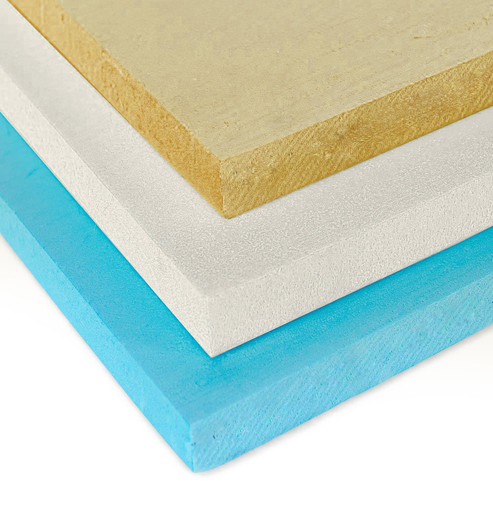
Rust Inhibition & Protection with VCI Foam
Rust Inhibition & Protection with VCI Foam The entire world works on trading in the market. Where one industry specializes in its products and delivers the items to many countries to sell, it attains the packages for something else from another leader in the industry to make the sales in the present country. To ensure that what you send over as shipment and what is received is in the exact same condition to avoid conflicts, there is a need for precaution most specifically for the metal components. Therefore, there is a need for good rust inhibitors such as VCI Foam to ensure shipments of products guarantee customer satisfaction. What is VCI Foam? VCI Foams are non-abrasive and quite flexible to use when it comes to shipping materials and spare parts of a highly delicate nature. The foam provides cushioning to the items being transported in order to ensure physical protection against damage. This is best utilized when any industry wishes to send its products by packaging them tightly overseas. The foam is soft and plushy to absorb any jerks and mishandling by the unaware shipment crew. While the foam itself is best for physical protection, it has VCI molecules embedded. These VCI molecules leave their host and form a protective layer over the metal surface of the item. This layer protects the metal item from corrosion. Therefore, when cushioning and corrosion prevention both are required, VCI foam is one of the best forms of rust inhibitors. VCI foams are most commonly used for the transport of materials made of copper, zinc, steel, and iron alloys. One of the highlighting features is that VCI foam does not leave a residue when the product is opened at the destination. The look of the item is intact and the presence of VCI can only be experienced and not felt. These foams are custom-made as per the size requested by the clients. These are also available in long rolls to be used as needed. Read Also: Anti-Corrosion VCI Films Technology that supports VCI Foam for Rust Inhibition VCI foams are most commonly based on Daubert VCI Technology by Zavenir Daubert. Zavenir Daubert is an old player in the rust inhibition and corrosion protection solutions industry. With its VCI Technology, it has brought forward VCI Foam best for the packaging of sensitive materials, electronics, subassemblies and spare parts, valuable equipment, and machinery spares. According to the Daubert VCI Technology, the wrapping or protection material, VCI Foam, in this case, contains VCI molecules that can leave the host in close contact with the metal surface. The polarity of the molecules allows the VCI molecules to get attached to the metal surface and form a strong barrier of close-knit molecules. This layer is about 2-3 molecular levels with no space left so that it can protect the metal part from corrosion. This technology has been utilized in the VCI Foam product in order to enable metal items to be protected from corrosion in transit when transported to other countries or cities. Where VCI Foam can be utilized? There are many application areas for VCI foam that includes: Electric panel and small components Telephone relays Circuit breakers Telecommunication equipment Firearms storage Marine navigation and communication equipment Utility boxes Metal parts and toolbox storage Operating and packaged electronic parts within compartments Fuse boxes and miscellaneous items These are some of the common applications of VCI Foam. This product is considered the best and most effective in the shipping and storage industry arena for the purpose of protection from corrosion. It protects multi-metal products as well from rusting. It is very thin and lightweight and can be utilized easily in tight or restricted spaces. It is also environmentally safe and completely non-toxic. Read Also: Anti-Corrosion Paper Zavenir Daubert’s VCI Foam Packaging Solutions VCI solutions by Zavenir Daubert have been trending in the industries for a long time now with the preferences increasing each day. This is the visible result of the efforts put in by the entire team of chemists and specialists to find the best technologies to combat the growing issues of corrosion. This has resulted in the development of several VCI based-products and solutions including: Daubert VCI Foams Daubert VCI Papers Daubert VCI Films Daubert NF VCI Emitter Cum Desiccant Daubert 5 VCI Emitters Each of these solutions is a product based on Daubert VCI Technology, Daubert VCI Multilayer Technology, or Daubert VCI Desiccant Technology. The ultimate goal of every invention and development at Zavenir Daubert is to ensure that every industry relaxes in the face of impending corrosion and spoiling of its metal materials. It ensures the best packaging and shipping solutions with corrosion prevention.
September 2022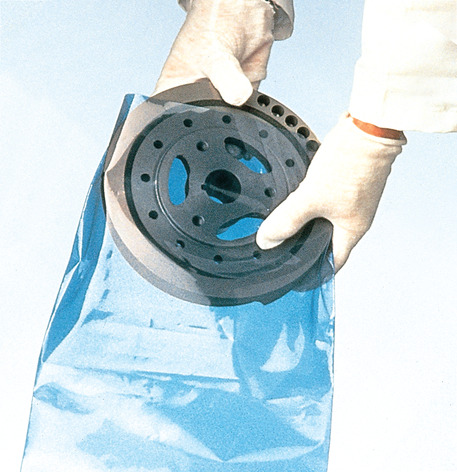
Anti Corrosion VCI Films
Anti-Corrosion VCI Films Dealing with corrosion and rusting issues is quite common in various industries. This is a very commonly found issue in the industries that require storage and transfer of metallic products. Since metals are prone to corrosion, they are easily deteriorate while in storage in warehouses or during their transportation or shipment to different locations. To ensure that such a situation is avoided, and the materials made of metals and products can have a longer life, solutions like Anti corrosion VCI films are devised for corrosion prevention. About VCI Films and Daubert PMG VCI films are poly films that are treated with VCI to ensure corrosion protection of metallic materials when wrapped in this. These VCI films form a physical barrier to keep the metal surface clean and free from moisture, air contaminants, and dust particles and the VCI molecule layer adds to the corrosion resistance. These VCI films are available in the form of rolls or sheets easy to use and capable of wrapping materials of all sizes. Daubert PMG (Premium Metal Guard) is a specialized VCI packaging film impregnated with proprietary Daubert VCI that is prominently used during manufacture, in transit, and for storage of metal to prevent corrosion from occurring. Read Also: VCI Film Bags and Packaging Sheets Application Areas and Industries VCI films are used in all areas or industries that require the transition of materials in between manufacture, storage in warehouses, and shipping and transportation of parts to other locations for assembling and selling. Some of the industries and application areas are: 1. Automotives There are auto parts like gearshifts, crankshafts, engine blocks, gearboxes, pipes, and more that need to be wrapped up and transported to other locations before they are used in automotive. These parts when leaving their source, they are in good condition. But it is important that when they reach the destination and are opened, their state remains the same. To ensure that in transit no environmental contaminants are able to harm the metal parts and promote corrosion, they are wrapped up in VCI film bags for protection. 2. Heavy Machinery Heavy machines are used in various industries. They must come from some manufacturers who cannot send it pre-made but in parts to promote assembling on the receiver’s site. To ensure that the machine parts for the heavy machinery implementation are all in top condition, they are packed before transportation in VCI film bags. 3. Manufacturing During manufacture, some metal parts are stored before they are used to further manufacturing process or assembly or as spares for inhouse use or transportation. Those parts might get corroded during this small or long duration and need special VCI film protection. 4. Logistics Anything that is metal-based and needs transportation, requires a properly suited VCI film wrapping and packaging for the best results in terms of corrosion prevention. 5. Warehousing Materials are often manufactured and then stored in warehouses for use when they might be needed in the future. In the meantime, they need to be packaged with VCI to ensure that they last longer in storage in their best condition without any impending rust. 6. Defense In the field of defense as well, all the artillery is metal-based and requires proper VCI film packaging for rust prevention to ensure that the weapons remain in their good condition and free from corrosion during the battle to keep the soldiers at an advantage. 7. Iron, Steel and Primary Metal Additionally, storage of steel coils, rolls, bar stock, cables, wires, tubes, and pipes also require VCI film packaging. These are some of the common application areas and industries where VCI films are prominently used. Read Also: Volatile Corrosion Inhibition: VCI Packaging Zavenir Daubert’s VCI Film Products Zavenir Daubert has been in the field of corrosion prevention for years and decades and has been diligent in providing the right technologies to solve the growing problem of corrosion in all spheres. Here, Zavenir Daubert has provisioned a technology, Daubert VCI Multilayer Technology where there are three layers of protection. First is the physical layer that protects the metal surface from physical damage like scratches and atmospheric contamination. The second or middle layer gives the strength to the VCI film so that it does not tear out during use. The third or inner layer is the VCI molecule layer that provide the VCI barrier to prevent corrosion. With this technology, Zavenir Daubert’s team has devised the product of VCI films to be used in the form of Polybags, rolls of sheets to be wrapped, film wraps and bags, Flute boards, foams, bubble films, aluminum foils, reinforced fabrics, and so on. To get the best VCI treatment for your metal-based products, get in touch with the Zavenir Daubert customer service team now for instant solution recommendations.
September 2022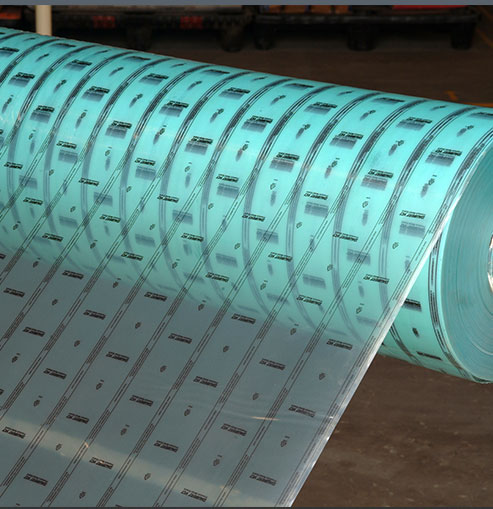
VCI Film Bags and Packaging Sheets
VCI Film Bags and Packaging Sheets Many industries require storage of their materials in warehouses for the use and/or transport the same to different cities or countries. In this process, there is a possibility of corrosion formation on the metal-based materials exposed to air and moisture. To prevent corrosion, there are VCI based packaging film- bags and sheets are available. VCI Films and Applications VCI Film Bags are poly packaging materials combined with VCI chemicals that can be used to pack metal materials to prevent from corrosion during storage and transportation. VCI chemicals emitted from the bags form an invisible layer of 3~5 molecules on the metal surface are able to inhibit corrosion. These VCI Films also called Vapor Corrosion Inhibitor Packaging Films are available in various sizes, and thicknesses to fulfill the customer needs. These VCI Films are used in various scenarios. Container Shipment: When transportation of shipment is carried out, there is a need to secure metal-based materials like parts of machinery and other metal components. Due to lot of moisture surrounding the shipment, a good quality VCI film packaging would be the best solution. Electronic parts: Materials like wires, metal nuts, and bolts need a secure covering of VCI film to ensure rust prevention. Land, sea and air transportation: Materials being shipped via roads, ships or even via air need rust prevention to ensure that the materials reach the destination intact. Automobile parts: Automobile parts like crankshaft, gears, engine parts, metal rods, and so on are often required to be stored, and transported to vehicle assembly units across the globe. To keep them in perfect condition of working and assembling for a long time, a good quality VCI packaging film is required. Read Also: High Flash Rust Preventive Oil Zavenir Daubert’s Technology in VCI Films Zavenir Daubert is a service and solution provider working in the field of corrosion prevention for many years. Having prepared the products for use as VCI Films, the team has been diligent in inventing the relevant technology behind it to make it the best solution for rust inhibition. The highlighting technology behind the product of VCI films is the Daubert VCI Multilayer Technology. At times, single layer VCI film is not enough to protect the metal parts from corrosion. Therefore, a need for multilayer VCI film protection was acknowledged for higher strength and low MVTR. For high performance of corrosion protection these VCI films are combined with Daubert’s proprietary VCI chemicals. In the VCI multilayer technology, the outer layer of Daubert’s VCI Film prevents any errant molecule of air and moisture from reaching the metal surface for corrosion prevention. Following this, the middle layer is providing physical strength to the VCI film, and the inner layer contains VCI chemical to protect the metal surface from corrosion. Zavenir Daubert has utilized this technology to develop very useful products in the form of Daubert VCI films for corrosion resistance. Various Forms of VCI Films Available There are various ways in which VCI films can be best utilized depending on the situation and the need. Read Also: Anti-Corrosion Paper VCI Poly Film Bags, sheets, and Rolls VCI films are available in transparent bags and rolls. Depending on the size of the material to be packed, the roll is uncoiled from the film roll and the object is sealed inside for the VCI chemicals and technology to begin the work. It works as a regular plastic bag but is infused with VCI. It is available as VCI film rolls for various sizes and weights of objects. VCI Film bags of customized size are also available. Bubble Films and Foam When extra cushioning is needed along with the VCI application in storage and transportation of items that are damage prone, then bubbles films, and foams are utilized. Stretch wraps These wraps work similarly to VCI poly film with the stretchable property added to it. Conclusion Zavenir Daubert being in this industry has earned themselves a name. With their VCI technology and corresponding products, it has been made possible to avoid corrosion during shipping and enable them to reach their destination in an intact state. This has ensured long-lasting objects and their quality are maintained for longer. Additionally, everything VCI based has been rushed into the market in the form of VCI film bags, and sheets to ensure protection from corrosion.
August 2022
High Flash Rust Preventive Oil
High Flash Rust Preventive Oil There are many events in the world where fire accidents have occurred and there are many reasons of fire such as short circuit, burning of paper, cloth, oil, etc. One of the major reasons of burning of oil is its low flash point. The flash point of a liquid is the "lowest liquid temperature at which, under certain standardized conditions, a liquid gives off vapors in a quantity such as to be capable of forming an ignitable vapor/air mixture". Therefore, a High Flash Point Rust Preventive Oil is always better in safety point of view. Generally speaking, rust preventive oils with higher flash points are more desirable. They are not only capable of standing up to high-temperature situations, but they also tend to display better overall stability and resistance to temperature-related problems at the usage location. Therefore, in highly reactive scenarios where the fire is a huge possibility due to excessive heat and friction, only high flash rust preventive oil should be utilized. The Need for High Flash Rust Preventive Oils A high flash rust preventive oil not only protects the metal components with greater safety in case of ignition but also, they are low in consumption because of its low evaporation rate. A high flash rust preventive oil can be use for the following metal parts. Engine and transmission parts during manufacture and transportation Rusted vessels storing nuclear waste Oil pipelines and their closure Military equipment prone to rust Endangered materials in the oil and energy sector There are just a few scenarios where rusting or simply corrosion can cause harm on a wide scale. To ensure that such a situation never arises, we can take preventive measures by ensuring the rust preventive oil on the manufactured metal. And for better fire safety high flash rust preventive oil can be used. Read Also: Volatile Corrosion Inhibition: VCI Packaging Applicability of High Flash Rust Preventive Oil Important property that makes high flash rust preventive oil quite important is the fire-resistant nature. In sectors where dealing with oils and other volatile materials are risky. Having a High Flash Point is an important characteristic in a rust preventive oil, especially in environments where spills, leaks or ruptured lines could encounter an ignition source. If your equipment operates at very high temperature and/or there is the potential exposure to high temperature situations while in use, flash point should be high on the list of important attributes to consider. The Technology behind Zavenir Daubert Rust Preventive Oil Zavenir Daubert is a name that must be familiar to you as we are an organization dedicated to solving the corrosion issue for long-term solutions and rust prevention in all spheres. To make it possible, the team has been dedicated and founded a few technologies based on which corrosion prevention is possible enhancing the life of everything around you. One such technology is CCI based on which many products for High Flash Rust Prevention and those which are dry to touch have been possible. Contact Corrosion Inhibition or CCI Technology has been drafted keeping the molecular structure in mind. The oil is applied to the surface of the material in a thick layer where the molecules within act on their adhesive property. As a result, the molecules bind themselves in a compact formation so thoroughly that no tiny space is left within. This ensures that no smallest particle of external moisture or oxygen is able to penetrate within to reach the surface material. This prevents the corrosion from occurring for a very long time. When we think about having a High Flash Rust Preventive Oil being applied and working on the same principle of CCI technology, we can ensure that the tightly packed system dries and does not allow any external element to push those molecules or cause any space to occur. Hence, this dry-to-touch oil and Sulphur-free rust prevention oil works like a charm coupled with CCI technology. Read Also: Anti-Corrosion Paper Zavenir Daubert: Moving Miles Ahead While Zavenir Daubert has found technologies to help solve the problem of corrosion and rusting better, they have also invested in the great minds and talents that collaborate to bring you the best products based on those technologies that can help you solve different problems with different solutions. So now, with their dedicated workforce and professional work over the years, you can find corrosion prevention solutions for everything within their scope. No matter what industry you belong to, if your commodities are prone to corrosion or rusting and need the products to help extend their life, you can count on the skillful experts on the Zavenir Daubert panel to answer your queries and help you apply the same. So, get in touch with customer service today to find the solution to a problem within your scope.
August 2022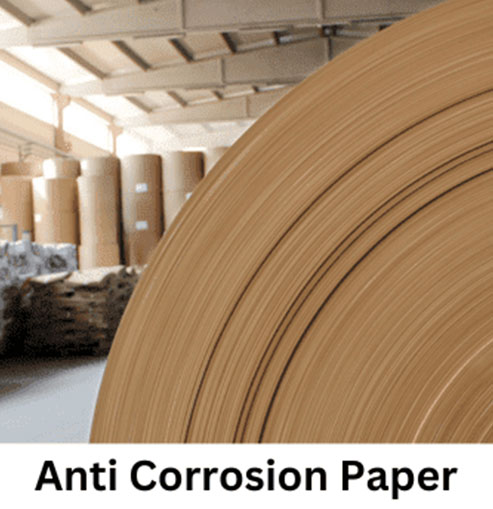
Anti-Corrosion Paper
Anti Corrosion Paper While the sectors and industries are looking for the best solution to prevent their commodities from corrosion, there is a technology on the rise to enable protection. That technology is utilized in the form of anti corrosion paper. This paper is based on a technology that allows it to chemically form a protective barrier around metal and non-metal materials. Anti Corrosion Paper and Its Uses This paper is also called Volatile (Vapor) Corrosion Inhibitor paper which is a kraft packaging paper manufactured by inculcating VCI chemistry on the one side of wrapping paper. This paper is specially crafted to form an invisible and thin molecular (chemical-based) layer over the metal surface. This layer or barrier ensures that no external elements such as air, moisture, contaminants, and so on are able to get in touch with the bare metal surface. Depending on the type of materials being wrapped within the anti-corrosion or rust inhibitor paper, the size, weight, and inhibitor types can vary during production on demand. These rust inhibitor paper can be prepared and obtained in the form of rolls of paper, pre-cut in specific dimensions, and even with custom printing for the industry. This rust inhibitor paper has many different names including rust inhibitor paper, corrosion resistant paper, and so on but the application remains the same. These are used to wrap around various metal and auto parts that need to be stored or shipped to different cities for supply. From gears, Cylinder heads, and other engine parts to any automobile parts, and machinery pre-assembly, all need a secure covering for corrosion prevention. Read More: Volatile Corrosion Inhibition: VCI Packaging Underlying Technology for anti rust paper Since this paper utilizes the VCI chemistry, it means that it inculcates the technologies that are related to the VCI property. Zavenir Daubert has developed the 2 main technologies underlying this. 1. Daubert VCI Technology This technology involves the concept of polarity and volatility. The volatile molecules of corrosion inhibition transport gradually from a medium such as anti corrosion paper to the component surface in such a way that the VCI molecules form a thin, transparent layer on the surface to protect the component from Rust. 2. Daubert VCI Multilayer Technology This technology involves transferring more than one layer of protection on the metal surface from the VCI film. The first layer inhibits moisture from making contact with the surface while the second layer provides physical protection from damage, peeling, and cracking. The combination of 2 layers is a much stronger solution and is best for dire situations. 3. Daubert VCI Desiccant Technology There are some desiccants that are for the sole purpose of absorbing all moisture molecules in a closed area containing metal surfaces to protect. This protection of absorption only works over a certain temperature. But combined with the VCI property there is a balance. After a certain temperature when desiccants release moisture back, till then all the VCI molecules have formed a thin layer on the surfaces thereby rendering a protective barrier. Industries and Applications of VCI Paper Anti corrosion paper or rust inhibitor paper is mostly utilized in the protection of metal components that are being stored in warehouses or during shipping to another city or country. There are scenarios in which moving from one manufacturing process to another requires that no section of metal components corrode. This means that during production, metal components can be wrapped in the rust inhibitor paper to help them stay rust-free. Industries like Automotive, heavy machinery, manufacturing, construction, etc. all require the use of this paper. For example, many metal parts such as motors, pumps, big and small components, metal-casings, metal forgings, pressed blanks, and many more machinery parts are packaged inside VCI paper for corrosion protection while desiccants are added for added protection especially when the parts need to remain under packaging for a little longer. Read More: VCI: The Anti Corrosive Packaging Zavenir Daubert’s Contribution and Products Zavenir Daubert has been working in this field and developing products to prolong the life of metal commodities in all sectors. With various new technologies coming into existence and the professionals diligently dedicated can see the fruits of their labor. The positive reviews and happy satisfied customers are what make the team more dedicated. The VCI paper has been worked on with experts to proceed with numerous products of their own derived based on the VCI technologies. Some of these products include: Daubert VCI papers (Daubert VCI Technology) Daubert VCI films (Daubert VCI and Daubert VCI Multilayer Technology) Daubert NF VCI Emitter Cum Desiccant (Daubert VCI and Daubert VCI Desiccant Technology) Daubert 5 VCI Emitters (Daubert VCI and Daubert VCI Desiccant Technology) Daubert MPI Foam (Daubert VCI Technology) Depending on what the purpose is and where the product is to be utilized, the product is carefully selected by the experts on the panel after a detailed discussion with the client.
July 2022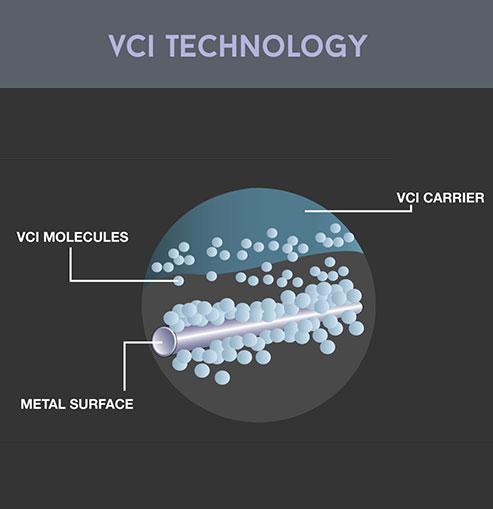
Volatile Corrosion Inhibition: VCI Packaging
Volatile Corrosion Inhibitor : VCI Technology, Uses and Benefits The problem of corrosion starts way backwith invention of metals. In early days we did not see any proper methodology for the prevention of corrosion. Hence, metal-based components and commodities used to have a very short life. With advancements came in corrosion inhibition technologies that included oiling, waxing, and coating metal surfaces with relevant corrosion inhibitors. But now, another kind of packaging is available in the market that does not require any physical coating. That packaging is called VCI packaging which eliminates corrosion during storage and shipping. What is a Volatile Corrosion Inhibitor? Materials and equipment in nearly all industries require strong protection against corrosion to prolong life. One of the chemicals specialized for this purpose to ensure the longevity of the materials is the Volatile Corrosion Inhibitor. This chemical substance is coated onto the target surface to be protected. It is in the form of packaging paper in which chemicals are volatilized so that the molecules are released onto the surface in an enclosed space to create a strong impenetrable barrier. Materials wrapped securely in this type of corrosion inhibitor paper are protected for a short duration enough to transport to a different location for deployment or towards the next manufacturing process. The barrier formed protects the surface from moisture, humidity and other external factors. The name Volatile Corrosion Inhibitor can be interchangeably used with Vapor Corrosion Inhibitor. Uses of Volatile Corrosion Inhibitor Since VCI has been invented, it has been a life saver in every industry that makes use of metals or other materials that are prone to corrosion. The products that are prone to rust lose their strength over time and decay in the situation of constant exposure to external elements. To ensure that the metal products and commodities have a long stable lifespan and are retained for years, several corrosion inhibitors are being looked for. VCI packaging is a solution best for packaging items for storage and transportation. Those industries that utilize the VCI packaging materials are: 1. Automotive: In this industry, the vehicles are all metal-based and need to be secured to ensure long life and extended reliability. This is because cars and other vehicles are used outdoor and always exposed to external elements, like atmospheric air, moisture, sea, and land making them prone to rusting. VCI packaging materials like VCI films and papers form a corrosion inhibiting barrier on the surface of metal. The parts often stored and transported also require protection from corrosion. These include gears, crankshafts, etc. 2. Aerospace and Military: In this industry, it is very important to keep the weapons and vehicles all safe from corrosion as they are commonly used in wars and for national security. Any amount of degradation is intolerable as only the best quality equipment and long-lasting materials can be truly relied on to protect our country. Hence, VCI packaging materials are employed to form a protective layer on all vehicles, equipment, and weapons. 3. Energy (Oil and Gas/Renewable): Any commodity that can help store, transport, and retain the energy materials like oil, gas, or renewable forms, needs a potent corrosion inhibitor covering the equipment being utilized. Here, VCI works best. 4. Export Shipment: When metallic materials or commodities are transported or exported, they need to be protected so that they reach the destination in the optimum condition. That is where VCI packaging is the best solution for safe transportation of any kind of metal-based shipment. It is also best for the storage of materials before the transportation process. 5. Heavy Equipment: The industry that manufacturers heavy equipment for use in various other industries need to ensure that those machines and equipment are all long-standing and reliable to work with. Here, appropriate VCI packaging materials can be deployed. Read More: VCI: The Anti Corrosive Packaging Benefits of Volatile Corrosion Inhibitor Ease of Application: VCIs are available in various forms, making them easy to apply to metal surfaces. Non-Destructive: They create a protective layer without altering the metal's appearance or properties. Long-lasting Protection: VCIs provide continuous corrosion protection for extended periods, even in challenging environments. Multi-Metal Compatibility: Suitable for protecting a wide range of metals and alloys. Cost-effective: Require minimal application and maintenance, reducing overall corrosion management expenses. Environmentally Friendly: Non-toxic and do not contain harmful chemicals or heavy metals. Ease of Removal: Can be easily removed from metal surfaces using common cleaning methods. Zavenir Daubert: The VCI Hub Zavenir Daubert has been working on developing corrosion inhibition technologies for a long time now. Daubert has been able to invent VCI technology that can be one of the best and simplest corrosion inhibition solutions. Those VCI technologies developed include Daubert VCI Multilayer Technology, Daubert VCI technology, and Daubert VCI Desiccant Technology. All these have different applications due to various different products belonging to each category. Some of the top Zavenir Daubert products are: Daubert VCI Paper Daubert VCI Films Daubrite NF VCI Emitter CUM Daubert MPI Foam Daubrite 5 VCI Emitters All these VCI packaging materials and products have different applications and can be utilized based on the technologies above. With the diligently working professionals behind Zavenir Daubert’s success, the customer satisfaction rate is expected to climb exponentially in the years to come making it one of the top global corrosion inhibition solutions providers. Frequently Asked Questions 1. What are the components of Volatile Corrosion Inhibitor? Volatile Corrosion Inhibitors consist of typical salts of moderately strong bases and weaker volatile acids. The bases include amines while the acids are the combinations of nitrous, carbonic, and carboxylic. 2. What are the examples of a volatile corrosion inhibitor? Some of the most common volatile corrosion inhibitors used in homes are camphor, nectarine, and paradichlorobenzene used as mothproofing agents. 3. What is VCI paper used for? VCI paper is a clean and dry paper used for packaging materials made from ferrous and non-ferrous substances. These are used for corrosion prevention by creating a barrier. 4. How do Volatile Corrosion Inhibitors work? When wrapped in this paper, inhibitor molecules are activated and transferred to the target surface by filling up the vapor space under the packaging. This barrier is strong enough to withstand the external agents for a certain duration. { "@context": "https://schema.org", "@type": "FAQPage", "mainEntity": [{ "@type": "Question", "name": "What are the components of Volatile Corrosion Inhibitor?", "acceptedAnswer": { "@type": "Answer", "text": "Volatile Corrosion Inhibitors consist of typical salts of moderately strong bases and weaker volatile acids. The bases include amines while the acids are the combinations of nitrous, carbonic, and carboxylic." } },{ "@type": "Question", "name": "What are the examples of a volatile corrosion inhibitor?", "acceptedAnswer": { "@type": "Answer", "text": "Some of the most common volatile corrosion inhibitors used in homes are camphor, nectarine, and paradichlorobenzene used as mothproofing agents." } },{ "@type": "Question", "name": "What is VCI paper used for?", "acceptedAnswer": { "@type": "Answer", "text": "VCI paper is a clean and dry paper used for packaging materials made from ferrous and non-ferrous substances. These are used for corrosion prevention by creating a barrier." } },{ "@type": "Question", "name": "How do Volatile Corrosion Inhibitors work?", "acceptedAnswer": { "@type": "Answer", "text": "When wrapped in this paper, inhibitor molecules are activated and transferred to the target surface by filling up the vapor space under the packaging. This barrier is strong enough to withstand the external agents for a certain duration." } }] }
July 2022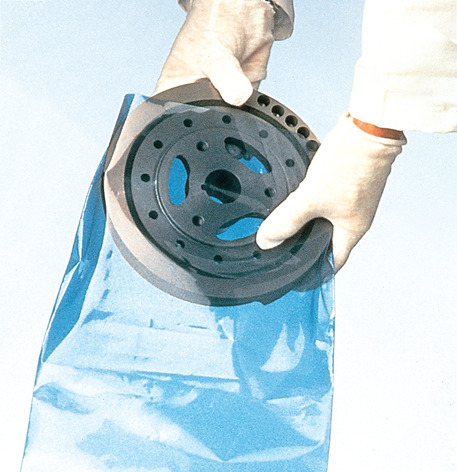
VCI: The Anti Corrosive Packaging
VCI: The Anti Corrosive Packaging One of the best ways to prevent corrosion from occurring is through a refined packaging material that utilizes the properties of the anti-rust additives while ensuring high volatility of VCI molecules and settling on the metal surface. This way that packaging can ensure complete coverage and corrosion inhibition of metals. The packaging is termed Volatile Corrosion Inhibition (VCI) which is popularly known as the anti-corrosive packaging. Utility and Applications of Anti Rust Packaging? When you put stress on the terminology ‘anti-rust packaging’ you indeed highlight the basic feature of this product which is a corrosion inhibitor. For most iron pipes, rods, and equipment, this kind of external protection is wondrous as it enables a corrosive barrier and rightly presents the anti-rust packaging. At the same time, this rust-free packaging is capable of being used in many pieces of machinery, metal spare parts, iron alloy products, vehicles, automobile parts, storage tanks for energy-based resources, and so on. Therefore, the industries that utilize the rust-free packaging include Aerospace and Military, Automotive, Energy renewable, Energy Oil and Gas, Manufacturing heavy equipment and machinery, and so on. Another sector where anti-rust packaging is quite prevalent today is the Export sector where various machine parts, metal segments, and such metal-based materials are exported. For the same rust-free export packaging is the best option and it ensures that all the materials being exported are delivered in the exact condition while improving the longevity. Technologies supporting Rust-Free Export Packaging Zavenir Daubert is working diligently in solving the corrosion issue. We have developed many technologies based on which products are manufactured and corrosion problems are solved through preventive methods. Rust-free packaging is one such solution. The technologies that form the base of anti-rust packaging are: 1. Daubert VCI Technology It is based on the concept of Volatility & Polarity. Volatile ‘V’ Components are added to Corrosion Inhibiting ‘CI” Components. The VCI molecules align on the surface of the metal to a depth of 3-5 molecules. This layer of molecules, passivates the surface and creates a barrier that prevents oxidation. VCI allows transparent rust-free export packaging to prevent corrosion and remain intact for years to come while maintaining the quality of the original metal part. 2. Daubert VCI Multilayer Technology This consists of three layers. The first layer restricts the moisture and lowers its transmission to the metal surface. The second layer protects the surface from damage with its strength. The third layer which contains the VCI, releases the corrosion preventive VCI molecules towards the metal surface to protect from corrosion. This is the best solution for rust-free export packaging. 3. Daubert VCI Desiccant Technology In this, Daubert Desiccant-cum-VCI-Emitter absorb the moisture in the enclosed surface and release the VCI molecules that form a passivating layer on the metal surface to protect from corrosion in the anti-corrosive packaging. After careful considerations, these technologies have been invented and the products discovered to carry out the applications for the same in real-life situations Read Also: Protective Coating To Prevent Corrosion Products that support Rust Free Packaging There are products developed by Zavenir Daubert that work on the principles of the Anti-Corrosive Packaging technology above. These products are: 1. Daubert VCI Papers Available in the form of papers that work on the Daubert VCI technology to provide protection against corrosion for up to 3 years as per the packaging design. 2. Daubert VCI Films VCI and multilayer technologies work together in the form of VCI films to provide corrosion protection for up to 2 years depends on the packaging design. 3. Daubert NF VCI Emitter Cum Desiccant Through the use of moisture absorbents or desiccants and with the added protection of Daubert VCI technology for anti-corrosive packaging, these products enable thorough corrosion prevention within enclosures. 4. Daubert 5 VCI Emitters Works best on the metal surfaces exposed in enclosures by forming a passivating layer through volatility and polarity for protection against corrosion. 5. Daubert MPI Foam A packaging option that provides rust-free packaging as well as cushioning of electronics and other sensitive substances. Works based on VCI Technology and is very lightweight. Zavenir Daubert’s Rust Free Packaging Initiative Having been in this field for a long time, the professionals of the Zavenir Daubert organization have gained tremendous exposure and experience and handled all kinds of challenges pertaining to corrosion protection through anti-rust packaging. Be it for internal use in a nation or for the export procedures, all the metal-based corrosive vulnerable commodities are backed with Daubert technologies for their rust-free export packaging. All the products are readily available for use in any industry for the purpose of anti-corrosive packaging. If in any scenario a client is unable to take the right decision on the product and technology that can be best suited for their commodities, our Zavenir Daubert customer representatives are best versed in all situations. They can help you with their expertise by looking at the situation and suggesting the right solution for maximum benefit. Our services are customizable and personalized in order to especially look at any situation personally before making the right decision. There are times when more than one technology is suited for a commodity, In that case, what should be done is decided by the experts from the Zavenir Daubert panel ensuring greater customer satisfaction.
July 2022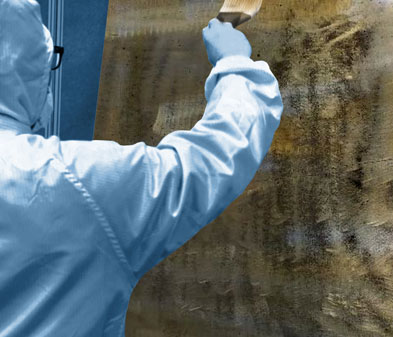
Protective Coating To Prevent Corrosion
Protective Coating To Prevent Corrosion Corrosion is a state in which a metal surface or an element comes in contact with the elements of the environment that oxidize the surface. This happens in cases where the metals react chemically with the oxygen and moisture present in the surroundings. If corrosion is a growing problem that means all construction projects in all spheres are in danger of being exposed. This ensures that the life of all such structures is very less. To improve the lives of the structures and construction projects, what we need is a protective coating to prevent corrosion. What is a protective coatings for corrosion? A substance is chosen to apply over the layer of the material which needs to be protected from corrosion. Having applied it thoroughly ensures a strong barrier of protection is formed to inhibit any contact of the outside harming elements with the coated metal surface. Such a coating is called protective coating to prevent corrosion. The coating type may be metallic or non metallic coating depending on the need. The coating material is made of several varieties that form a strong cohesive bond and leaves no space for the external elements to enter. Non metallic coating protective coating materials include polymers and more materials. Metallic protective coatings include aluminum, zinc, and chromium. Alloys are also used for coating. To apply the protective coating, there are several methods used. Some of these include spraying, painting, welding, and aligning. In all cases, the process of coating is based on certain technologies that are presented by Zavenir Daubert expert technicians. Protective coating for metal There are various protective coatings to prevent corrosion, and each one is different from the other. Following are some of them- 1. Galvanizing: Immersing metals in molten zinc to form a protective zinc layer. 2. Powder Coating: Spraying electrostatically charged powder onto metal surfaces, then curing to form a durable coating. 3. Cathodic Protection: Applying a sacrificial metal or impressed current to prevent corrosion. 4. Chromate Conversion Coating: Treating metal surfaces with chromate solutions to form a corrosion-resistant film. 5. Ceramic Coatings: Applying ceramic materials via spraying or dipping to provide high-temperature and chemical resistance. 6. Epoxy Coatings: Applying epoxy resin-based coatings for excellent adhesion and chemical resistance. 7. Metallic Coatings: Depositing metallic layers onto metal surfaces for enhanced corrosion protection. 8. Organic Coatings: Applying organic materials like polymers or resins to create protective layers. 9. Phosphating: Coating metal surfaces with phosphate layers to improve paint adhesion and corrosion resistance. 10. Anodizing: Electrochemically oxidizing metal surfaces to form a protective oxide layer, typically on aluminum. 11. Paints and Primers: Applying paint systems including primers for corrosion protection and aesthetic finish. 12. Vinyl Coatings: Applying vinyl-based coatings for corrosion resistance and electrical insulation. Technologies behind the application of Protective Coating The professional panel of Zavenir Daubert has been diligent in finding the right solution for corrosion prevention through the protective coatings to prevent corrosion. To ensure the success of the same, the panel has found the technologies that support the protective coating for corrosion prevention. SACI Technology Severe Atmospherics Corrosive Inhibitor Technology is the one that allows the application of platelets over the material in the form of overlapping plates to ensure that a strong barrier is admitted due to the strong polarity of the plates. This ensures that no moisture or oxygen is able to reach the surface of the metal or cause any harm to it. There are no toxins and lead materials within the coating as it is of utmost quality ensuring complete environmental safety. It is also a very smooth textured product that prevents any cracks and peels to appear leaving a smooth finish. From the various studies and experience, it has been noted that the best hold of the coating is possible on the rounded edges of the material constructed for the purpose of protective coating for metal. This is a great way to ensure the best surface protection with a protective coating to prevent corrosion.This enhances the life of the materials as well as retain the shine of the surface for a longer period of time. Zavenir Daubert has developed the best products based on SACI technology to ensure corrective protection through the coating. These products are NOX-RUST coatings which are the premium quality Zavenir Daubert Rust preventives. Read Also: Pipeline Corrosion Prevention with Rust Inhibition Technology Zavenir Daubert as the Solution Provider for Corrosion Prevention Zavenir Daubert has been in this field for many years, the foundation laid upon the very crucial problem of rusting and corrosion of metal surfaces of private and public commodities. The team of professionals has been deep within the possible methods of corrosion prevention since the very beginning. Now, having made the breakthrough discovery of the various technologies that can solve the problem, Zavenir Daubert has been one of the greatest solution providers in the market. Zavenir Daubert has been bringing forward various products based on their technologies that can help the construction industry to improve the life of their products by giving the finishing touch to everything with a protective coating to prevent corrosion.Various liquids, oils, sprays, and much more variety of products have been storming the markets and being utilized on the surfaces for corrosion protection. Even now, the team is working on finding even better long-lasting solutions to improve the quality of the material being coated to last a lifetime. All this is enough to ensure you of the customer satisfaction rate today that you can also join by giving our customer service team a call.
June 2022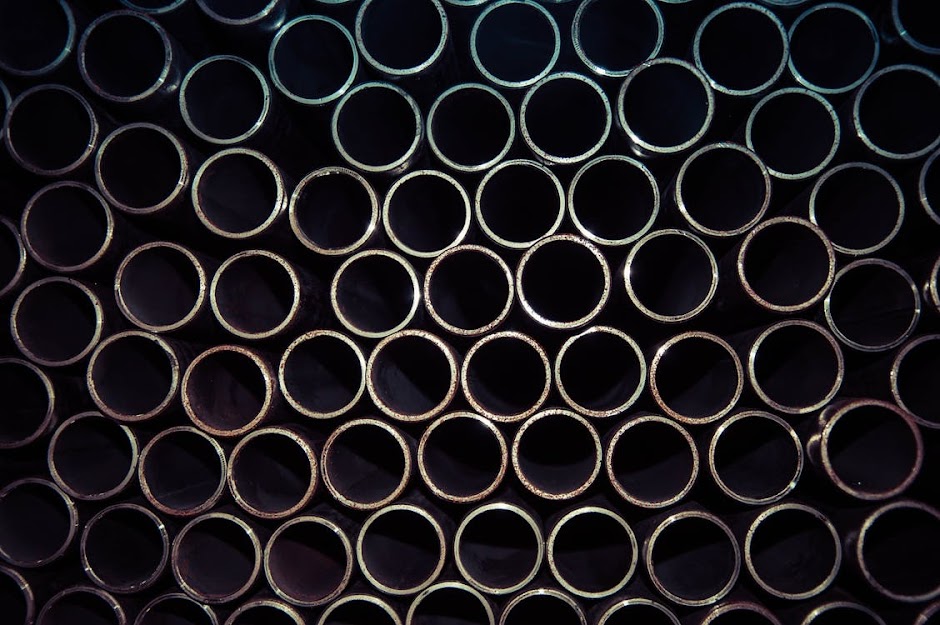
Steel Rust Prevention & Control
Steel Rust Protection for Corrosion Prevention and Control Steel is an alloy made up of iron and one of the most important and very commonly used materials in modern industry. This is because steel is a material that is highly durable, versatile, and affordable in all aspects. It is used in buildings, infrastructure, tools, ships, trains, excavators, automobiles, machines, electrical equipment and appliances, weapons, rockets, etc. The only thing that decreases its value and long life is its nature that allows rapid corrosion. Therefore, to ensure that steel products have a long life, there is a need for steel rust protection possible with Zavenir Daubert’s corrosion prevention methods. Prevention of rusting in steel is possible through various technologies that are developed by experts of Zavenir Daubert. These technologies are CCI and SACI. There are various coating products available based on these technologies. Technologies for the Prevention of Rusting Technologies by Zavenir Daubert have shown that how is it possible to enhance the life of any structure or commodity made of metal or steel when applied with the right coating or corrosion prevention process. 1. CCI Technology (Contact Corrosion Inhibition) A barrier layer of rust preventive oil, coating or wax is applied uniformly on the surface of the steel structure. Polar molecules of rust preventive liquid are bind with each other and metal surface thoroughly. When no space is left between the molecules, the tendency to have an external condition touch and reach the surface of steel below reduces exponentially, which do not allow moisture and oxygen to cross the barrier layer. The longer it takes for the external conditions to reach the base the better the life of the structure made of steel. For optimum steel rust protection, CCI technology coatings can be used which are easy to apply and consistent in rust protection performance. 2. SACI Technology (Severe Atmospheric Corrosive Inhibitor) SACI® corrosion inhibitors offer an environmentally responsible solution to corrosion prevention of metal structures facing severe atmospheric conditions. This is one of the most successful corrosion prevention and control technologies. Having a structure of highly polar, overlapping microscopic platelets that block moisture, SACI® corrosion inhibitors resist cracking and peeling, thermally stable, and hold fast to sharp edges. Environmentally, SACI® formulations offer lead and barium free options, so run-off doesn’t have the toxicity of traditional coatings. Even barges, bearings, cables, engines, tanks, offshore rigs and platforms operating within the harshest salt-water environments benefit from products incorporating SACI® corrosion inhibitors for long-term protection. Long term protection of metal parts with penetrating and self-healing property. Can be used over weld and sharp-edged areas Compatible with most paints, plastics non-ferrous metal and other surface coating. Thixotropic in nature does not drip or run. This also allows ease of overhead application without any primary or secondary sagging. Read More: Metal Rust Protection with Corrosion Resistant Technology Zavenir Daubert’s Initiative for Steel Rust Protection Commodities and structures made of steel are facing the growing problem of rusting due to the direct contact with the atmosphere. Zavenir Daubert has been working to find the technologies that can solve this problem and enhance the life of all steel-based structures. With CCI and SACI technologies this has become possible. Following the principle of these technologies, there are some specialized products of Daubert that work best for solving all said issues of steel rust protection. These products include NOX-RUST Liquids, NOX-RUST Coatings, NOX-RUST Waxes, NOX- RUST VCI Liquids and Powders for the protection of metal parts from corrosion during storage or shipment. If you have your maintenance, storage, construction, packaging, or installation business that involves dealing with steel objects, then you can get in touch with our team of professionals who can help you find the right solution to improve the life of the metal commodities. With the best reviews from various customers, we can assure you that you will only feel positive about our work with a feeling of complete customer satisfaction.
June 2022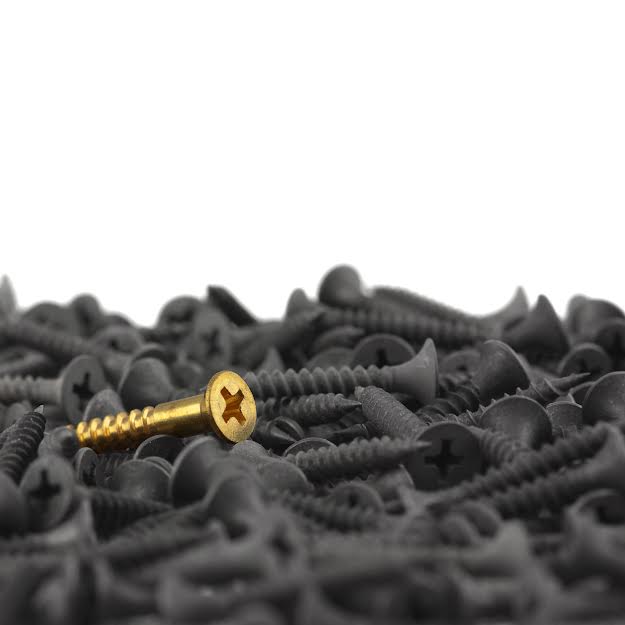
Metal Rust Protection with Corrosion Resistant Technology
Metal Rust Protection with Corrosion Resistant Technology When you talk about metals, you can find them all around you. In rooms, houses, buildings, outside areas, roads, fencing, and so on. Without the strength and durability of metals, many commodities are incomplete. At the same time, you face the problem of inevitable corrosion in specific types of metals like Iron and Steel. What you need is to focus on the prevention of corrosion of metals to ensure the longevity of all commodities. Let us understand more about corrosion prevention. About Prevention of Corrosion of Metals When selecting the metals for the construction of the commodities, it is important to know what type of metals have the tendency to form rust. These metals are called corrosive metals. Iron, Steel, Copper, Brass, and more are some of such metals. Iron when reacts to moisture (air and water) forms an iron oxide which is the base component of rust. Similarly, copper gets tarnished and brass turns green. These are the signs of rusting. In some cases, rusting results in a destruction in the quality of the metal surface and subsequently causes failure in components. Mostly, rusting on iron is destructive while that on copper and brass is easy to reverse. For the purpose of preventing corrosion of metals, it is important to see if you can utilize non-corrosive metals like stainless steel, galvanized steel, aluminum, and so on. If this is not feasible then there are several metal rust protection methods and coatings that ensure the prevention of corrosion of metals. Daubert Technologies for Metal Rust Protection Zavenir Daubert has been diligently working in the field of prevention of corrosion of metals and has realized about few technologies that can help. Let us understand how this works. 1.CCI Technology The concept behind this technology is the polar adhesive property of the molecules that bind them tightly on the surface of the metal to ensure that no external condition is able to reach the metal. Contact Corrosion Inhibition allows a physical oil layering that extends the life of the material. This impermeable layer is enough to stop all attacks on the surface of the metal by extremely humid temperatures and oxygen. This is a very thin film that is easy to apply, and remove, consists of high coverage ratio, allows low consumption, significant cost, and outstanding performance when it comes to metal rust protection. 2. VCI Technology Daubert’s VCI Technology is based on the concept of Volatility & Polarity and performs favorably even in the presence of moisture. Daubert unique VCI technology enables it to complex with the moisture present in the air therefore retarding or often neutralizing its corrosive effects. Daubert VCI technology-based products are made available in various forms such as oils, packaging papers, and films, emitters, powders which allow their use in multifarious applications across a broad spectrum of industries and at different stages of the product life cycle. 3. SACI Technology Severe Atmospheric Corrosive Inhibitor technology allows for the microscopic range of overlapping between the highly polarized set of overlapping platelets to block all attempts of moisture and oxygen to penetrate the metal surface. This kind of layering on the metal surface is actively impermeable even in the harshest conditions. This technology allows for a stronghold on edges while ensuring high thermal stability, crack and peel resistance, and the least amount of toxins and lead in the mixture that can harm the metal or the environment. It is environmentally stable and safe as well. This is hence, one of the most effective methods for the prevention of corrosion of metals. Read Also: Pipeline Corrosion Prevention with Rust Inhibition Technology Daubert Products Based on Temporary Rust Protection Technologies The above technologies by Daubert are applicable in various Zavenir Daubert products as given below. 1. NOX-RUST Liquids: These rust preventive oil-based liquids work on CCI technology by forming a thin layer of impermeable barrier on the metal surface. It provides lower viscosity, high coverage, and low aromatic content along with temporary rust protection. 2.NOX-RUST Waxes: These are based on CCI technology that allows specialized wax coating on the metal surface for long-term corrosion protection against mud, snow, and stone chipping mostly the automotive. It has been approved by the global leading automotive market for having excellent salt spray life, self-healing properties under high pressure, steady crack resistance, resistance to sunlight, and a uniform waterproof layer to ensure temporary rust protection. Other products include DAUBERT VCI Papers and DAUBERT VCI Films for packaging and maintenance of metal parts during storage or shipment and NOX-RUST coatings. Zavenir Daubert’s Initiative for Metal Rust Protection Zavenir Daubert has been diligent in finding the right technologies to combat the growing rusting issues in metal-based commodities that have caused various losses. These initiatives ensure the long life of any object with the aid of specialized products that work based on the technologies. For businesses like manufacturing, packaging, maintenance, and storage of metal parts, connect with Zavenir Daubert professionals who can help you find the right solution to enhance the component‘s life.
June 2022
Pipeline Corrosion Prevention with Rust Inhibition Technology
Pipeline Corrosion Prevention with Rust Inhibition Technology The concept of pipelines in the world is as important as the arteries in the human body. The pipelines are highly significant for the purpose of transportation and distribution of water, oils, gas, chemicals, steam, and petroleum products in the economy. The quality and health of the transporting products can be assured only if the traveling medium is protected from corrosion and other electrochemical deterioration from inside and outside. Hence, working on ensuring good pipeline corrosion prevention can help in maintaining the quality of the pipeline system. Pipeline Corrosion Problem & Solution Pipeline corrosion is the term that defines the process of deterioration of the material of the pipe from the inside and/or outside due to the interacting medium. It is one of the biggest problems in pipelines and a potential hazard for production and transportation facilities. Continuous running of Fluid and Gas corrode the internal surface of the pipelines & component fittings would undergo material de-gradations, resulting in the loss of mechanical properties like strength, ductility, etc., which leads to loss of materials, reduction in thickness, and at times ultimate failure. Continuous attacks on the environment from outside are the reason for outside corrosion. This kind of catastrophic failure to a vast transportation network system can cost lacs and crores to the economy. Some oil companies face pipeline ruptures due to corrosion and oil spillages; while resources are lost in cleaning up this environmental mess, catastrophic ecological damages take place as a result of corrosion which often lingers for decades. The most affected materials of pipelines due to corrosion include copper, aluminum, carbon steel, cast iron, alloy steel, stainless steel, and so on. These materials are commonly used for pipelines that are either buried, submerged, underground, or others. Therefore, it is very important to be vigilant when choosing the right material for the pipelines during construction. The solution to the problem is the respective protective coating to prevent corrosion. Only special rust preventive oils and coating technology from Zavenir Daubert can guarantee a corrosion-free solution. Technology Behind Pipeline Corrosion Prevention Several situations that require long-term exposure to external conditions of weather, temperature, and humidity, need more extended duration protection from corrosion. The main challenge in this scenario is to provide recoating on time before the environmental factors outweigh the protective barriers. Corrosion challenges are not static phenomena in the pipeline. Fluid characteristics change over time, resulting in systems becoming less responsive to established corrosion prevention methods. The followings are the methods advised for corrosion prevention in pipelines: Selection of appropriate materials Use of inhibitors Use of protective coatings Selection of appropriate materials: When it is observed that the existing construction materials are prone to corrosive attack, it is usually decided to change the construction materials and select alternate materials to suit the specific need. Use of inhibitors: Inhibitors are chemicals used to protect the surface of metals used in pipelines to prevent corrosion. VCI is an environmentally safe and cost-effective option for corrosion protection. It can be used in pipelines, oil and gas wells, refinery units, and fuels. In addition, these proprietary Daubert VCI-based anti-corrosion products are designed to work in the presence of moisture. Use of protective coatings: A protective layer or barrier on the material to avoid direct contact with the process media will enhance the material and equipment life. There are also non-metallic linings like fibre glass, glass flake, epoxy, and rubber which are normally carried out on the equipment like separators, knock-out drums, and storage tanks. Coatings based on Daubert® CCI (Contact Corrosion Inhibition) & SACI (Severe Atmospheric Corrosion Inhibitors) technologies have been found to be very useful by several important players in this field. SACI technology was brought into the picture to meet the needs for environmentally responsible yet very effective protection from corrosion in severe adverse conditions. This involves a unique structure of highly polar and overlapping platelets of microscopic range to block moisture and oxygen from penetrating. An impeccable barrier works in frigid conditions or harsh atmospheric situations. SACI technology has been noted to have high thermal stability, crack resistance, and steadfast hold on edges with the least amount of toxins and lead. In addition, every bit of pipeline surface is completely protected from the harshest water and air-based atmospheric conditions because of products incorporating Daubert SACI Technology. This is how you can achieve a protective coating to prevent corrosion in pipeline systems. Read Also: Corrosion Resistance with Rust Prevention Oils NOX-RUST Protective Coating to Prevent Pipeline Corrosion NOX-RUST Coating products are based on CCI (Contact Corrosion Inhibition) and SACI Technology by Zavenir Daubert as aprotective coating to prevent corrosion . These products are best for outdoor protection from corrosion during operation, maintenance, and mothballing. This product has reduced costs providing extended life of the coated product, greater operating cost, and lower maintenance and service expenses. It has excellent salt spray life, rust protection for a longer duration, fast curing and sag resistance film, compatibility with non-ferrous metals and lubricating oils, and is available in a wide range of film types with controlled film thickness. It is very environmentally friendly with no toxins. These products are best for pipeline corrosion prevention . Zavenir Daubert: Complete Pipeline Corrosion Prevention Solution Having a strong and long-standing background in rust prevention methods and products, the reviews are well-worth in the industry. For many users, the improved efficiency of the systems and non-corrosive properties of the products have enabled greater return on investment leading to a complete customer satisfaction rate. To keep it intact, the team at Daubert has been working diligently on presenting durable and high-quality solutions for corrosion protection, prevention, and removal. We believe in studying the mode of corrosion damage of particular pipelines aids in determining the root cause and then finding a suitable solution to break down that cause. Mostly corrosion protection begins at the design stage, where the right kind of materials, coating, and systems are selected. This is where our team can be of help. Further, existing systems can be supplied with a protective coating to prevent corrosion with SACI Technology inclusion. Also, our team is well equipped with technology to help you combat rust generation with the latest machinery. You can get in touch with our team and find the right way to help your pipeline systems stay corrosion-resistant to improve life.
May 2022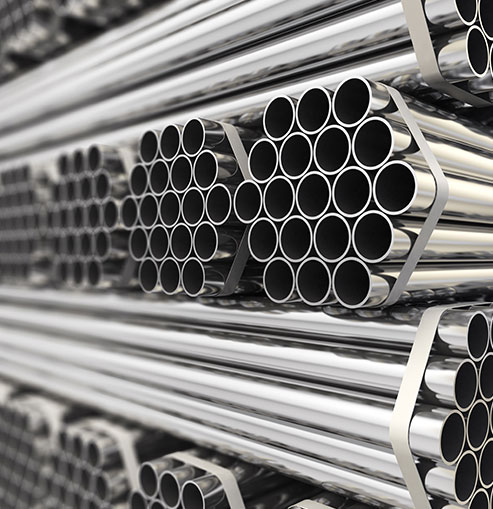
Corrosion Protection For Steel
Corrosion Protection For Steel Steel is a durable and cost-effective metal. But when exposed to the atmosphere, it starts corroding. A considerable amount of resources are wasted annually in metal industries due to metal corrosion. The phenomenon of corrosion adversely affects and causes deterioration in metals through oxidization. Steel corrosion is an electrochemical process, and the coinciding existence of moisture and oxygen in the atmosphere leads to corrosion. The reaction starts when the oxygen in the atmosphere oxidizes iron in the presence of water. Also, the emissions of gases in the atmosphere like carbon dioxide (CO2), carbon monoxide (CO), sulphur dioxide (SO2), nitrous oxide (NO2), and many other chemicals can accelerate the corrosion process. Additionally, if any two metals with different potentials come in contact with each other, current will flow, and the more reactive metal will corrode in comparison to the less reactive metal; this is called bimetallic or galvanic corrosion. The rate at which the corrosion will progress depends upon the climatic condition around the steel. The high level of moisture/wetness and pollution in the atmosphere would cause corrosion at a much faster rate and vice versa. Therefore, the rate of corrosion is different in different places due to variations in atmospheric conditions. And, hence it is essential to do Corrosion Protection for Steel. Below are some protection methods which can stop or slow the corrosion process. Protective Coating for Steel Rust Protection Here the steel is coated with a protective layer which works as a barrier between the metal and oxygen, water, or ions from the atmosphere. Lower permeability of water by the coating will ensure better protection. The coating can be Paint coating which gives improved durability to steel, or it can be Metallic coating. The four commonly used methods of applying a metal coating to steel are hot-dip galvanizing, thermal spraying, electroplating, and sherardizing. Moreover, Zinc has high corrosion-resistant properties and is used as a protective coating on many products and under many conditions. The quality of the coating, its selection, its application, and handling are all important factors in deciding the kind of protection offered. If maintenance acts are not carried out regularly, the protective coating can become ineffective. This happens when corrosion takes shape beneath the film of the coating. It is very important that protective coatings are to be carefully handled while setting up so that they last long as considered. Hot-Dip Galvanizing In this process, fabricated steel or iron is immersed in a kettle of molten zinc. The steel reacts with the zinc to form an alloy coating. The process provides a barrier and cathodic protection resulting in Corrosion Protection for Steel lasting decades. This method resists corrosion through the buildup of zinc plating and provides protection to galvanized steel and issueless longevity. This is an ancient method that originated more than 250 years ago. But, the latest technology and innovative chemistry have led to the unrelenting advancement of this established method. Duplex System This system consists of providing paint or powder coating over hot-dip galvanized steel. This provides enhanced corrosion protection than either of the individual methods. Many people are aware of one or the other method of corrosion protection. Whereas, there are some people who know the fundamental value of applying two methods together. It is what is described as the duplex system. This distinguished manner of protection against corrosion is a synergistic effect. An additional obstruction is created with the outer layer of coating, which significantly lengthen the existence of galvanized steel. Special Steels Different steels like stainless and weathering have special chemistry and elements. They provide corrosion resistance by taking advantage of these unique properties. Stainless steel contains iron and chromium, and the presence of chromium ensures excellent stain and rust protection. Stainless steel has an exceptional defense against rust and stain as it contains a considerable percentage (12-20) of chromium. Steels with austenite and nickel also provide improved ductility and superior resistance to corrosion. This steel is named austenitic stainless steel. Another kind of stainless steel is Ferritic stainless steel which has greater resistance to stress corrosion. Weathering steel contains copper and develops a natural iron oxide patina that, once formed, is stable. The steel is allowed to rust, after which it creates a protective layer or patina. A layer protecting the surface is developed. Compared to carbon steel, weathering steel offers increased corrosion protection. Sacrificial Protection (Cathodic Protection) The reaction between two dissimilar metals can be used to protect against corrosion. Zinc is a widely used metal for steel rust protection. Protection is offered through preferential oxidation by placing zinc in direct contact with the steel. Zinc corrodes against steel and effectively stops the oxidation reactions on the steel. Also, zinc normally corrodes at a slower rate. Three metals that are mostly used in this method are aluminum, magnesium, and zinc. Aluminum and zinc are used mostly in saltwater. Read Also: Corrosion Resistance with Rust Prevention Oils Temporary Barrier for Steel Rust Protection: Rust Preventive Oil, VCI or Volatile Corrosion Inhibitor, etc. Temporary Barrier Protection is the conventional rust protection method and is found to be one of the appropriate methods to protect the parts from rust for a short period of time in the steel industry, as it allows for flexibility in application, excellent confluence with upstream and downstream requirements & is considered very economical. NOX-RUST Rust Preventive Oils are based on CCI or Contact Corrosion Inhibition Technology and have been found extensively useful in the protection of temporary protection of steel in challenging climates and conditions. Based on the concept of polarity & thin Film Technology, Daubert proprietary polar molecules do not allow any oxidizing elements to permeate even under condensing climates faced during the height of the rainy seasons and are able to survive thermic stresses beyond most other rust preventives in similar categories. The exceptional ability of NOX-RUST to remove pre-existing moisture and light alkaline from the metal surface further augments its performance under moist application and storage conditions. NOX-RUST offers a broad range of rust preventives which, besides corrosion protection, can be selected on the basis of needs such as water displacement properties, film thickness, upstream and downstream compatibility requirements, and many more. Similarly, Daubert’s VCI Technology is based on the concept of Volatility & Polarity and performs favorably even in the presence of moisture. Daubert unique VCI technology enables it to complex with the moisture present in the air therefore retarding or often neutralizing its corrosive effects. Daubert VCI technology-based products are made available in various forms such as oils, packaging papers, and films, emitters, powders which allow their use in multifarious applications across a broad spectrum of industries and at different stages of the product life cycle. An optimized and effective Corrosion Protection Method can be developed by Daubert Solution Engineering Team, which can be validated by various accelerated corrosion tests and field trials.
May 2022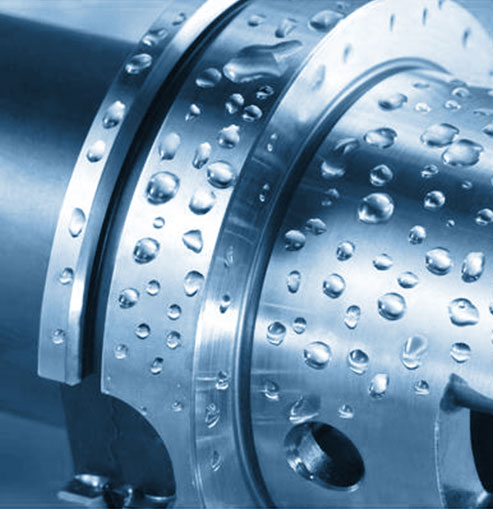
Corrosion Resistance with Rust Prevention Oils
Corrosion Resistance with Rust Prevention Oils Corrosion is a natural property that converts a manufactured metal into its natural oxidation state. It is the gradual destruction of metals by chemical and/or electrochemical reactions due to contaminants or electrolytes and water. Corrosion occurs due to a variety of reasons such as metallurgy, humidity, temperature changes, residues, etc., and the reaction on the surface. For this reason, there have been great developments in the industrial sector of rust preventive oils that ensure the coated material is safe from corrosion and has a longer life span. What is Rust Protection Oil? The anti-rust oil is a specialized oil that is formulated to protect the metal surfaces and provide a barrier from entities that might cause corrosion. The polarity of the oil ensures that external substances are not affecting the surface much, and it creates a film on the surface. This is what rust preventive oils are. What kind of protection is needed on the metal surfaces? The kind where a protective layer is standing between the external atmosphere or elements and the metal surface. That barrier is created with the help of oils to prevent rusting due to oxygen, moisture, and other natural causes. This kind of oil is used for the protection of metals like ferrous, copper, aluminum, galvanized steel, and corrosive metals. This anti-rust oil is used to prevent a direct hit on the metal surface and keep the parts corrosion-free. Zavenir Daubert is well-known for supplying the best quality oils to prevent rusting on all types of metal surfaces. How is Anti-Rust Oil useful? In metals like aluminum, a thin layer of aluminum oxide forms over the surface of the metal, which act as a protective barrier. This barrier does not flake off like rust does, which prevents further corrosion of the aluminum. Whereas in ferrous metals, only iron oxide is formed, and rusting takes place either in the iron itself or in steel. In the presence of moisture & oxygen, iron undergoes a chemical or electrochemical reaction and forms iron oxide. When rusting occurs at one place of metal, it gradually spreads on the complete metal. Therefore, a protection layer is required, and the solution is the application of anti-rust oils. In manufacturing industries, the metal parts are needed to be transported from one part to another part of the globe, where they are assembled into the final product to sell. During this duration, the metal parts are prone to rust before even reaching the destination. This is where the usage of oils to prevent rusting is crucial. Aside from that, VCI packaging (Volatile Corrosion Inhibition) is also used for the protection of metal parts from corrosion. VCI is often used in combination with anti-rust oil for maximum effect of corrosion protection. Zavenir Daubert has been analyzing problem areas and providing promising solutions to prevent corrosion. Let us see how Zavenir Daubert has solved corrosion issues. Read Also: Benefits Of Corrosion Protection With Zavenir Daubert Areas where Rust Protection Oil are necessary 1. Power Stations: Internal corrosion protection for turbines, steam boilers, cooling systems, fuel vessels, switches, connectors, gears, and hydraulic systems can ensure smooth working, reduced downtime, and greater power generation with low maintenance. NOX-RUST 1100 and NOX-RUST 9800 are some of the products by Zavenir Daubert that are utilized best here. 2. Petrochemical Plant: This kind of plant needs the best protection for spare parts in storage. A good combination of Daubert VCI and oil to prevent rust, such as NOX-RUST 2737 and water-based SAFECOTE A, can help with that. Also, the equipment remains in top shape with proper corrosion protection, and no failure in systems is likely to occur. 3. Oil Refinery: Having equipment, machines, and containers that are likely to corrode might result in loss of quality in refineries and failure of systems. But proper oiling is also avoided as it is an oil refinery but can utilize alkaline cleaners for regular cleansing for longer life. 4. Gas Storage: Storage of Gas is required to be carefully done in huge, fabricated vessels and storage tanks. But these storage units are susceptible to corrosion from inside as well as outside. In case such weakness occurs in the tanks, there is a high risk and possibility of gas leakage. Some of the Zavenir Daubert rust preventive oil and other products are used for the inside and outside coating of such tanks and other facilities like piping systems, valves, and flow control systems. 5. Onshore Production: Various facilities at large distances are connected with huge pipeline systems. These pipelines consist of complex flow systems managing quantity and direction. Only specialized Zavenir Daubert oils to prevent rust and VCI liquids can help preserve the inside of the pipes with complete safety. 6. Automotive Industry: Automobile manufacturers manufacture various parts like engine components, body, fuel tank, chassis, etc., and assemble them to make a complete vehicle. From the manufacturing of these parts to assembly, it takes time. It is not necessary that the manufacturing of parts and assembly location are the same; sometimes, it is cross border or cross sea. Since this is a long manufacturing and supply chain process, there is always a risk of corrosion on parts during manufacturing, shipping, and storage. Corrosion on parts may lead to failure of vehicle performance. Corrosion can happen at any stage and on any part of the vehicle, either on the machine part or body. Resulting in accidents and casualties. NOX-RUST range of rust preventive liquids are suitable for ferrous and non-ferrous components like cylinder blocks, cylinder heads, crankshaft, camshaft, connecting rods, pins, etc., to protect from rust. NOX-RUST VCI liquids are suitable for closed systems such as fuel tanks, storage tanks, cylinders, transmissions, gear housings, clutch compartments, crankcases, hydraulic and cooling circulating systems. It is also used for fogging into shipping cases to protect unpainted auto and truck body sections during shipments. Eco-friendly Rust Preventive Oil There are some remarkable properties of Rust Protection Oils that show how eco-friendly they are in nature and application. Non-toxic; safe to touch Biodegradable; easily convertible to natural means Non-sticky and expellable Ensures nothing sticks to the surface it is sprayed on Does not allow external elements to react with the surface Stays for a very long time; durable Loosens existent rust and grease Non-polluting and safe for the environment Non-existent odor Free of harmful chemicals Non-flammable and dilutable Does not harden and remains soft for creaky and noisy parts Eco-friendly rust preventive oils are the specialty of Zavenir Daubert. Zavenir Daubert ensures that every industry has corrosion-free equipment and arrangements around them while ensuring that our environment is safe.
May 2022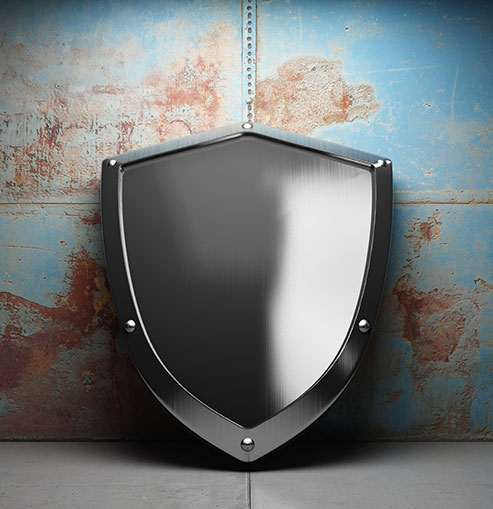
Benefits Of Corrosion Protection With Zavenir Daubert
Benefits Of Corrosion Protection With Zavenir Daubert We have developed world-class rust preventive oils based on Contact Corrosion Inhibition Technology (CCIT) to increase the corrosion protection and protect the metals exposed to the environment, storage, domestic and export shipment, right from casting and forging to assembly. These products are generally available in liquid form or in the form of wax and coatings. When these products are applied to the surface of metals, they build a protective barrier between the metal and the environment. This barrier resists the attack of a range of elements which causes corrosion. These corrosion preventive products are not like customary products, which permit dirt and moisture to reach the metal surface and further cause corrosion. Advantages of corrosion protection with our corrosion prevention products. 1. Cost-Effective and Flexible Our corrosion prevention solutions are affordable with the capacity to increase the life of your components. These solutions give considerable cost & performance advantage in comparison to other solutions available in the market. Other corrosion preventive products are poorly formulated and don't give effective outcomes. Our solutions for preventing corrosion can be applied to a wide variety of parts and components of metal. Due to the thin film of our rust preventive oil, it covers more area than other rust preventive oil. We will give you a generous benefit-cost ratio and offer the alternative of the fixed term, fixed price, the solution which permits more prominent control of upkeep spending plans over the lifespan of your benefits. We understand that everyone's operational condition is different and will work with you to find a maintenance plan which suits your business. 2. Multi-Use Zavenir Daubert solutions can be used over all types of parts, including ferrous and non-ferrous parts, in the industries like electrical and electronics, automotive and general engineering, steel and power, oil and gas, construction, mining, etc. Our corrosion prevention solutions can protect all the costly machinery or metal assets that are placed in places where humidity is too high. Our solution can be extremely effective in avoiding corrosion. The CCI Technology enhances the polar molecules to build a strong barrier that doesn’t permit any oxidizing elements to seep into it. 3. Non-Toxic and Non-Hazards Our team of specialists has developed a range of corrosion preventive products which are non-toxic and non-hazards to the environment if used properly, making our products the best solution to use in any condition. 4. Corrosion Protection for In-process, in-house storage, indoor & outdoor, domestic & export shipment We can use our CCIT solutions for various purpose like in-process corrosion protection, in-house storage, indoorand outdoor protection, domestic and export shipment, etc. at anylocation – mostly without the need to stop manufacturing. We have created one of the bestcorrosion prevention solutions which guarantee overall coverage of thesurface area. On the off chance that yourequire solutions supplied in India, don’t hesitate to reach us. 5. Tailored to You We comprehend that every business is diverse, which is the reason we don’t have a one size fits all methodology. Zavenir Daubert corrosion protection specialists will work with you to choose the most reasonable corrosion prevention item for your business and can even offer lab testing and certification to build up a technique that meets your necessities. Read Also: Aluminum Corrosion Protection The other beneficial features of corrosion prevention products are:- very low aromatic content lower viscosities based on thin film technology strong demulsification higher flash point excellent salt spray/humidity chamber life lower evaporation loses thin tack free film higher coverage excellent protection in severe conditions Zavenir Daubert provides complete protection against corrosion which isn’t simply a quick fix method. Zavenir provides an everlasting and durable solution to avert any sort of damage to the assets of metal from corrosion. There are diverse qualities of Zavenir products that possess exceptional properties to protect against corrosion. They have various other benefits like easy removability, fingerprint neutralization, lubricity, water displacement, etc.
April 2022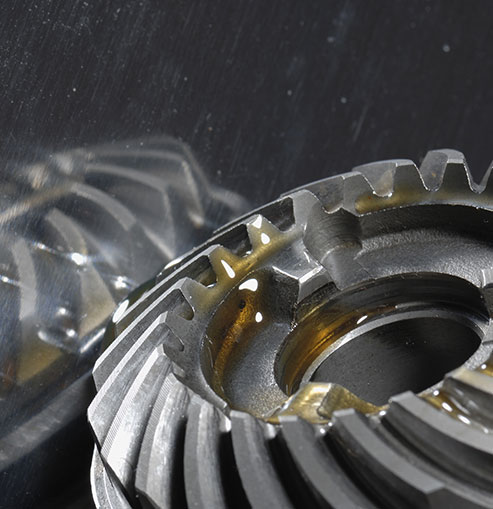
Aluminum Corrosion Protection
Aluminum Corrosion Protection The Earth's shell comprises of various elements, among which aluminum is a very familiar metal. The aluminum is used in manufacturing different kind of products. It can be found in nuts, bolts, conductors to airplanes. It is one of the most chosen metal as it is light weighted, it can resistrust, is quite suppleand also perfectly strong. Other than these it is a better conductor of electricity and is also cheaper. Due to all these factors, aluminum is one of the most used metals (non-ferrous) of today's technology. Aluminum is mostly preferred in its alloyed form rather than its pure form. But just like any of the metal, it also needs safety measures for protection against corrosion. Corrosion means deterioration of any kind of metal, which is generated chemically and which is sourced through numerous elements of nature. What is Aluminum Corrosion? Aluminum in its crude form possesses reasonably superior resistance against corrosion in nearly every standard atmosphere due to its stable oxide layer. Still then, corrosion of different kinds occurs on the surfaces of aluminum irrespective of industrial, rural, or urban atmosphere. Aluminum oxide is formed in aluminum, acts as a supportive and resistive layer which protects the aluminum from further oxidation. The alloys of aluminum have greater corrosion resisting properties. Even then this metal is very much prone to chemical reaction. In different complex situation aluminum undergoes chemical corrosion, crevice corrosion and pitting corrosion. When the alloys of aluminum comprises of certain kinds of metals it becomes more defenseless to an assault of corrosion. 4 ways on how to prevent aluminum corrosion If proper preventive measures are not initiated, aluminum can also be the target of corrosion which would further result in its destruction. Giving appropriate corrosion protection treatment is the main aspect that can raise the life expectancy of aluminum. Aluminum is a widespread metal that is used for making a range of products. It is time and again chosen above other metals foritscapacity to resist rust, ductility, blend of potency and low weight. Whenever investment is made in an aluminum product, adequate precautions must be taken for preventing it from getting corroded. 1. Paint Coating : Aluminum gets defense from corrosion if a coating of paint, which acts as a surface layer, is put over. The surface layer acts as a barrier for corrosion which can be easily applied besides being cheaper. On many instances the zinc-chromate primer is used which serves the purpose of a base, upon which subsequent coating of paint is applied. But prior to the application of primer the product or part is to be cleaned with grease or other similar residues. 2. Alodine Treatment : It is a type of chemical treatment, electrically conductive, which acts as primer. The aluminum which gets treated doesn't gain any weight or doesn't transform in size. While carrying out this method it is necessary to maintain the temperature at more than 70 degree Fahrenheit or 21° C. The Alodine Treatment is easy to perform and doesn't require electricity to carry out the process. The parts to be treated are to be cleaned so that substances are removed from the surface. Grease or sticky substances has to be removed properly. Here a superior dishwashing detergent can be used which helps to get rid of oxide layer. The aluminum part is then dried suitably and immersed in acid. The acid is then rinsed with clean water. Lastly, after completely dried it is then dipped in Alodine. 3. Anodizing : This is an electrolytic process which solidifies and toughens the layers of oxide and thus enhances resistance of wear and tear. It further improves the surface so that paint can stick on. It involves electrolytic solutions and the use of direct current. This corrosion protection treatment for aluminum is done by dipping it in electrolyte acid bath. In this process electricity is passed through the medium. The diverse aspects of electrolytic bath, such as amperage, temperature, and time, influence how dense the layer of oxide would be. During this treatment, ions of oxygen are discharged from the electrolyte to merge with the atoms of aluminum. Aluminum is perfectly right for anodizing. 4. Oil Coating : Many aluminum products or parts are treated with solutions based on oil. These oils can be synthetic or mineral with compounds of wax. This solution can be sprayed and sometimes the products or parts are immersed in it. But such solutions are applied repeatedly after a certain period according to the environment. Sometimes packaging is also required for longer protection from corrosion, mainly in sea shipment. Read Also : Corrosion Protection in enclosed chamber Preventive Measures for how to stop aluminum corrosion After corrosion aluminum loses its strength and durability. Corrosion devours the object slowly but for an aluminum product to be devoured by corrosion, might take quite a few years. It doesn't occur with a swift course of action. Corrosion can lead to big gaps and fissures in the products of aluminum if it gets a sufficient amount time. Because of such consequences it is very necessary to shield aluminum from the state of corrosion. In order to do so, aluminum must be stored or stocked in such an environment which is weatherproof. Corrosion mostly occurs due to the various atmospheric elements like moisture, dirt, salts etc. which activates a chemical effect. Therefore, storing of aluminum products and parts in a place which is climate controlled or weather-proof can shield it from exposing to the causes of rust. To prevent aluminum from getting corroded clear coating is another option. Through this process the aluminum's surface is given a layer of protection. This unable to be seen layer of clear coat guards the aluminum from the surrounding atmosphere. After the application of this option the product or part of aluminum doesn't gets exposed to corrosive environment. Getting Rid of Corrosion Just like the methods for preventing corrosion there does exist many techniques to secure corroded aluminum. To stabilize corroded aluminum, there is an easy practice of washing the aluminum and its alloys. For such washing, ammonium sulphate is used with de-ionized water which efficiently gets rid of corrosion or the corrosive elements. It also helps in getting rid of the destructive chloride ions from the object's surface. This is an effective action which can be used to secure aluminum-based product, even after many years of exposure to corrosion. Aluminum corrosion can be recognized by surface roughness and the pitting of the metal. Corrosion on aluminumis uncomplicated to spotas it rises in volume upon the aluminum's surface. While getting rid of corrosion from aluminum caution is to be paid to avert any stains on the surface. Conclusion But, even after all the prevalent methods and stringent measures being executed chances are there that corrosion might find a small gap to get in and create destruction. That is why it is always said "Prevention is better than Cure."
April 2022
